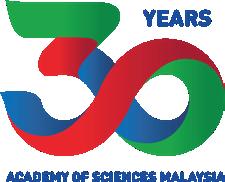

ABOUT
The Academy of Sciences Malaysia (ASM) is a statutory body under the purview of the Ministry of Science, Technology and Innovation (MOSTI). As a Thought Leader, ASM provides strategic advice to the Government through its expert network for matters related to Science, Technology, Innovation and Economy (STIE).
ASM’s membership currently stands at 1,070 expert network that consists of Fellows across eight disciplines, Top Research Scientists Malaysia (TRSM), the Young Scientists Network (YSN-ASM), Associates, and the Mahathir Science Award Laureates, enabling ASM to fulfil its mandate effectively. This diverse and inclusive expertise strengthen ASM’s ability to provide comprehensive perspectives on STIE-related matters.
Over the years, ASM has played a pivotal role in offering strategic guidance on the formulation of STIE-related policies through more than 150 studies and initiatives till date. ASM has evolved beyond its traditional Think Tank role of recommending actions to be taken and now function as a Changemaker, demonstrating ‘how to do the how’ through mission-oriented programmes. ASM actively collaborates across ministries in transdisciplinary studies, contributing to the nation’s development. ASM aspires to contribute towards building a progressive, harmonious, prosperous, and sustainable society both nationally and globally.
ASM’s studies are carried out under the leadership of Expert Network, subject matter experts in their respective fields. ASM conducts strategic and foresight studies, producing evidence-based, independent, and timely reports, position papers, blueprints, roadmaps, and reviews.
This includes supporting projects that apply STIE knowledge and technology to address local challenges, enhance state economies, and improve the well-being of communities.
Beyond its advisory role, ASM pioneers new directions through its flagship programmes, which are designed to inspire action by relevant stakeholders. ASM demonstrates practical solutions through pilot initiatives and social innovation projects. Many of these efforts go beyond traditional science and technology disciplines, incorporating insights from social sciences, humanities, and economics to provide more comprehensive and multidisciplinary perspective. As such, the Precision Biodiversity pilot at Pasoh Forest Reserve, the Rehabilitation of Gamat Emas project, and the Wireless Bridging project, to enable internet access for unserved and underserved communities.
ASM also plays an essential role in nurturing young talent and promoting science, technology, engineering, and mathematics (STEM) education and careers. A highlight of this commitment is the National Science Challenge (NSC), a prominent initiative that engages secondary school students and fosters their interest in scientific exploration and innovation. Through innovative public engagement initiatives like FAScinate and ArtScience, ASM makes complex scientific concepts accessible and relatable to all, bridging the gap between science and society, while fostering public dialogue and understanding.
Recognising the global significance of STIE in driving economic prosperity and societal wellbeing, ASM fosters strategic international partnerships and networks to advance scientific understanding, enhance research quality, and address shared global
challenges. By positioning Malaysian scientists on international platforms and facilitating their participation in global prestigious programmes, such as the Lindau Nobel Laureate Meetings and CERN Summer Students Programme (CSSP), ASM broadens their networks, and raises Malaysia’s profile among international scientific community.
ASM plays a crucial and influential role on both national and international fronts, contributing to the advancement of science, policy, and global collaboration. ASM experts hold positions of great responsibility and influence, where they actively shape decisions and drive forward scientific innovation, such as in the International
Science Council (ISC), InterAcademy Partnership (IAP), UNESCO Open Science Advisory Committee, and ASEAN Foresight Alliance.
Looking ahead, ASM will continue to drive scientific innovation, strengthening international collaboration, and positioning Malaysia as a leader in global scientific and technological advancement. Guided by our ethos, ‘Think Science, Celebrate Technology, Inspire Innovation,’ we are committed to nurturing a vibrant STIE ecosystem that not only fuels national development but also makes meaningful contributions to solving global challenges.
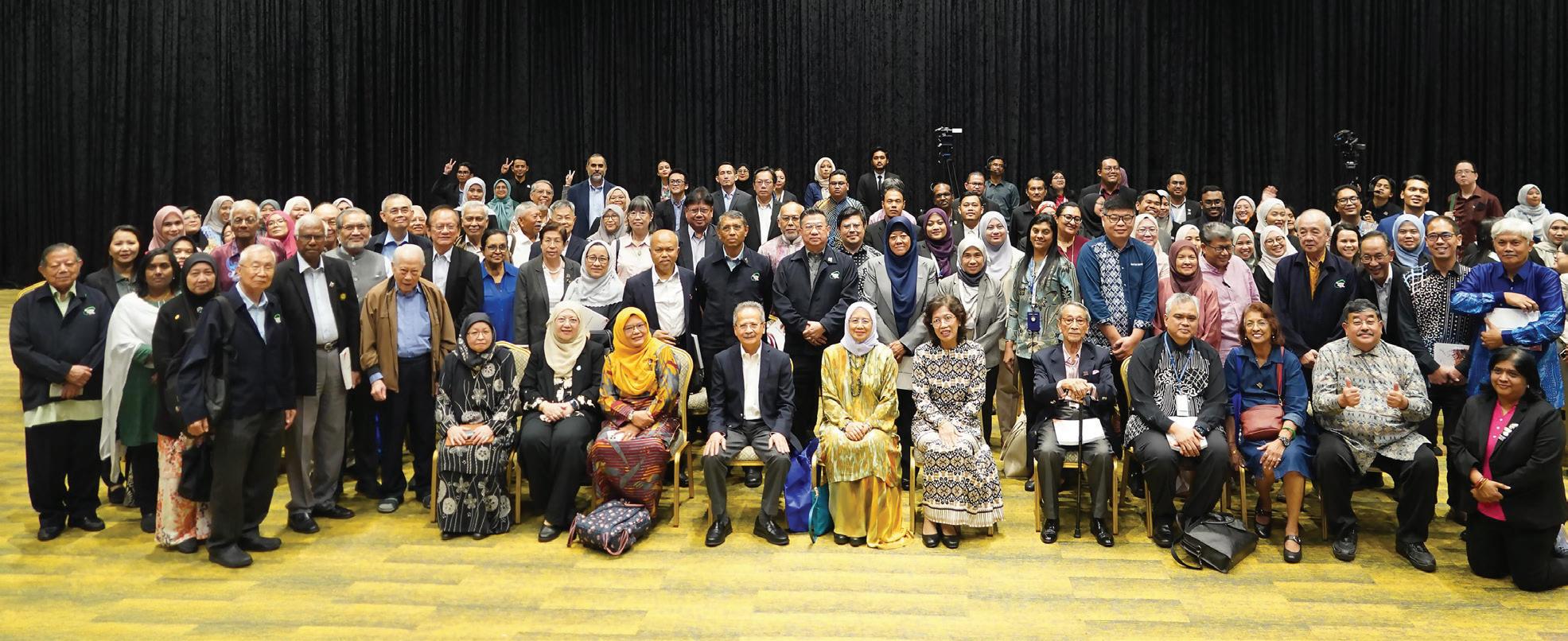
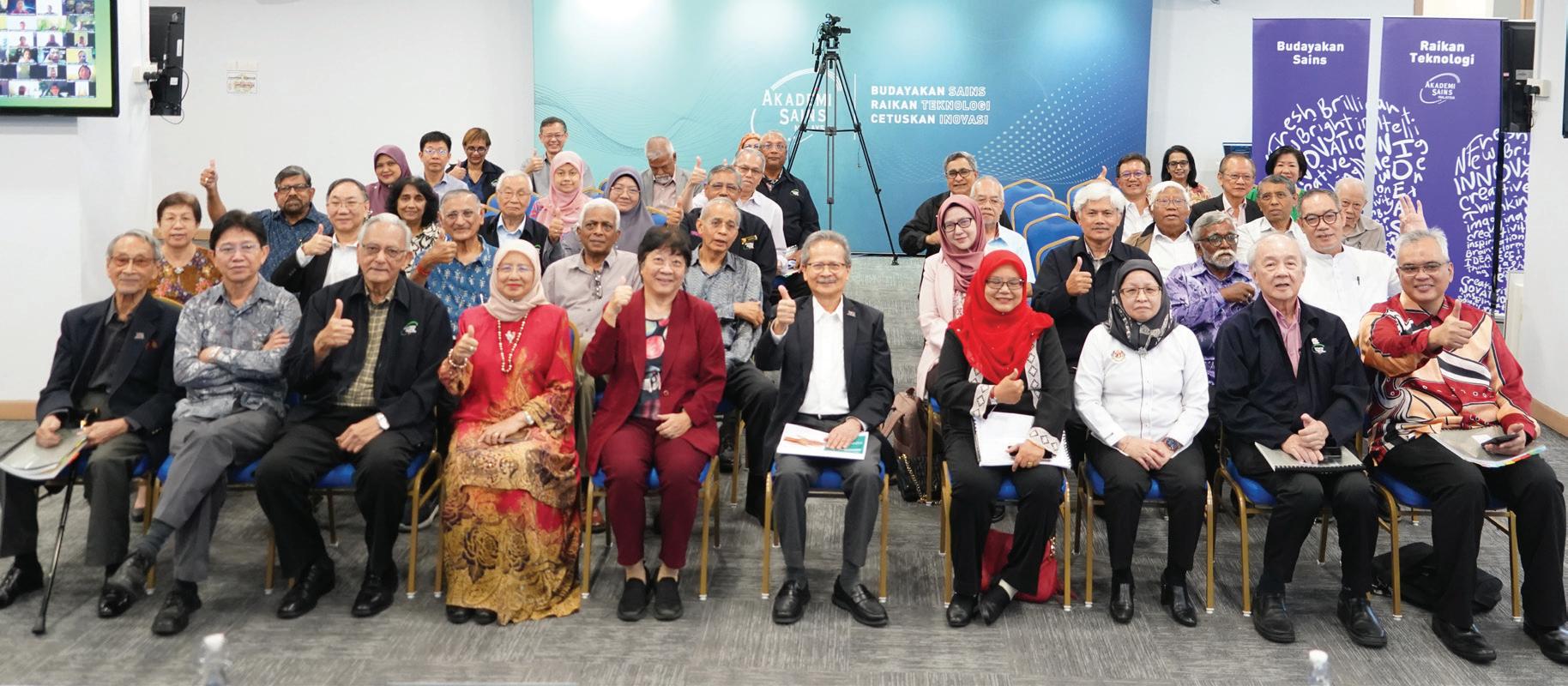
ASM FELLOWS ABOUT
The Fellowship of ASM comprises esteemed scientists, engineers, and technologists who have made outstanding contributions in their respective fields. Fellows are recognised as leaders and distinguished experts, demonstrating significant engagement and impactful contributions across the domains of science, engineering, technology. They must exhibit an unwavering commitment to advancing these areas and actively contributing to the nation’s scientific and intellectual growth.
Nominees for the Fellowship are individuals of exceptional merit, embodying the highest standards of integrity, decorum, and professionalism. They exemplify the qualities of an ASM ambassador, representing ASM with distinction at both national and international levels.
The Fellowship is conferred through a rigorous selection process encompassing eight core disciplines. It represents the pinnacle of recognition by the Government of Malaysia, celebrating the nation’s most exemplary scientific and intellectual leaders.
25% (135 FASc) 75% (400 FASc)
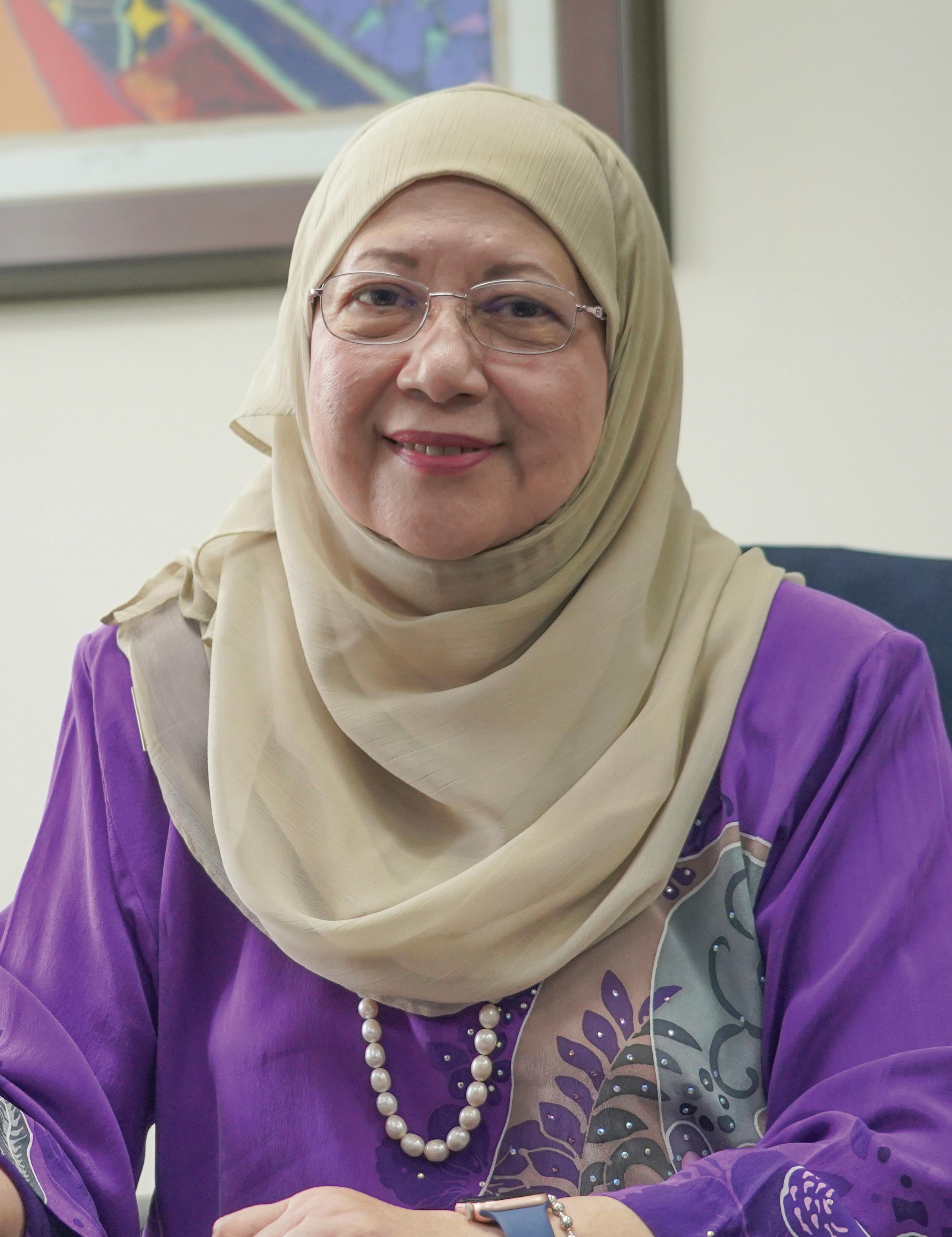
A TRAILBLAZER: LEADING CHANGE AND INNOVATION
Academician Professor Emerita Datuk Dr
Asma Ismail FASc
Academician Professor Emerita Datuk Dr Asma Ismail FASc is known as a woman of many firsts. She is an inspiration to many, especially to women scientists. An eloquent speaker and a science communicator, Datuk Dr Asma is well-recognised for her dedication, perseverance, and passion for moving science to practicality.
Guided by her vision, ASM has achieved significant milestones. She believes an organisation must be purpose-driven; its impact must be felt by the whole organisation and its society. As such, during her tenure, she helped ASM make a quantum leap by design, strengthening the organisation and accomplishing impactful achievements.
Datuk Dr Asma currently serves as the ViceChancellor and Chief Executive Officer of IMU University, Ibnu Sina Chair for Medicine at the International Islamic University Malaysia (IIUM), Pro-Chancellor at the University College of MAIWP International, and a member of both the University Board of Governors for Universiti Teknologi Malaysia (UTM) and of the Consultative and AntiCorruption Panel for the Malaysian Anti-Corruption Commission. She is also an honorary Professor at the Institute for Research in Molecular Medicine (INFORMM), Universiti Sains Malaysia (USM) and a driving force behind Malaysia’s National Planetary Health Action Plan (NPHAP) and the National Education Reform Study (NER), as its Chairperson.
A true trailblazer, she made history as the first woman Vice-Chancellor of Universiti Sains Islam Malaysia (USIM) in 2012 and of USM in 2016-2019, making her the first woman to be appointed twice as the Vice-Chancellor of a public university. She is also Malaysia’s first woman Director-General of Higher Education (2014-2016), first woman President of ASM (2016-2022), first woman to be appointed as the Chairperson of the Malaysian Qualifications Agency (MQA) (2019-2021), and the first woman to be the Science, Technology and Innovation Advisor to the Prime Minister and the Nation.
Contributions to Science, Engineering and Technology
Datuk Dr Asma’s mantra in research is to learn from the best and use the technology learned to help society, especially the poor. As such, she along with her team, decided to challenge the capability of R&D and develop a molecular diagnostic method that no longer required reagents needing cold-
chain maintenance. This was a novel approach at that time.
Under her leadership, the team rose to the challenge and developed non-PCR-based diagnostics that can be used in the field. She facilitated scientific discoveries in diagnostic biomarkers that led to the attainment of 16 patents and the commercialisation of rapid diagnostic tests for typhoid called TYPHIDOT, which WHO, Typhidot-M and TyphiRapid advocated.
Her scholarly publications and innovations have won her numerous prestigious awards and recognitions, including the 2012 Top Research Scientists Malaysia award recipient, Tokoh Akademik Negara, International Federation of Inventors Award, and the Malaysia Toray Science Foundation - Science and Technology Award, among many others.
Contributions to Education
Datuk Dr Asma’s contributions to Malaysia’s higher education system include the creation of Anugerah Akademik Negara and establishing Research Universities in Malaysia. During her tenure as the Director General of Higher Education, she led a team of 42 Malaysian Professors to develop the Malaysian Education Blueprint, 2013-2025 (Higher Education). The Blueprint proposed major reforms to Malaysia’s higher education system to accelerate
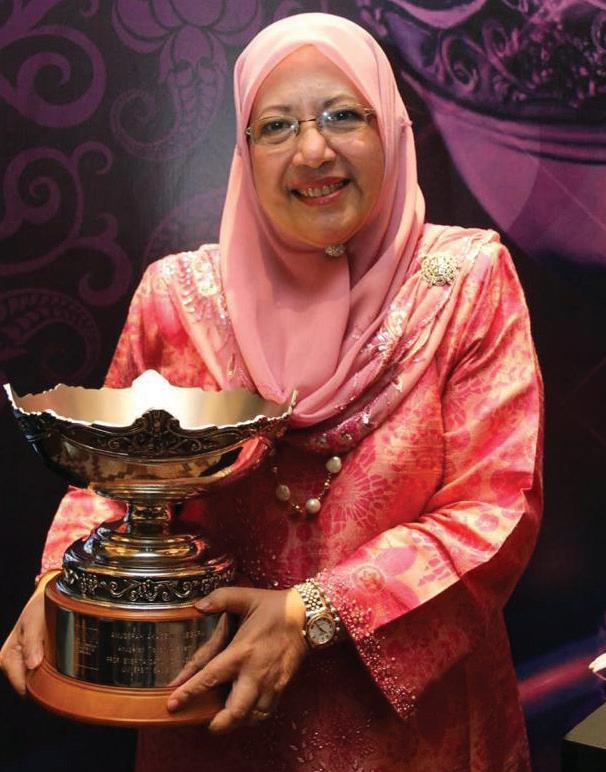
Datuk Dr Asma I smail honoured with Anugerah Tokoh Akademik Negara 2021
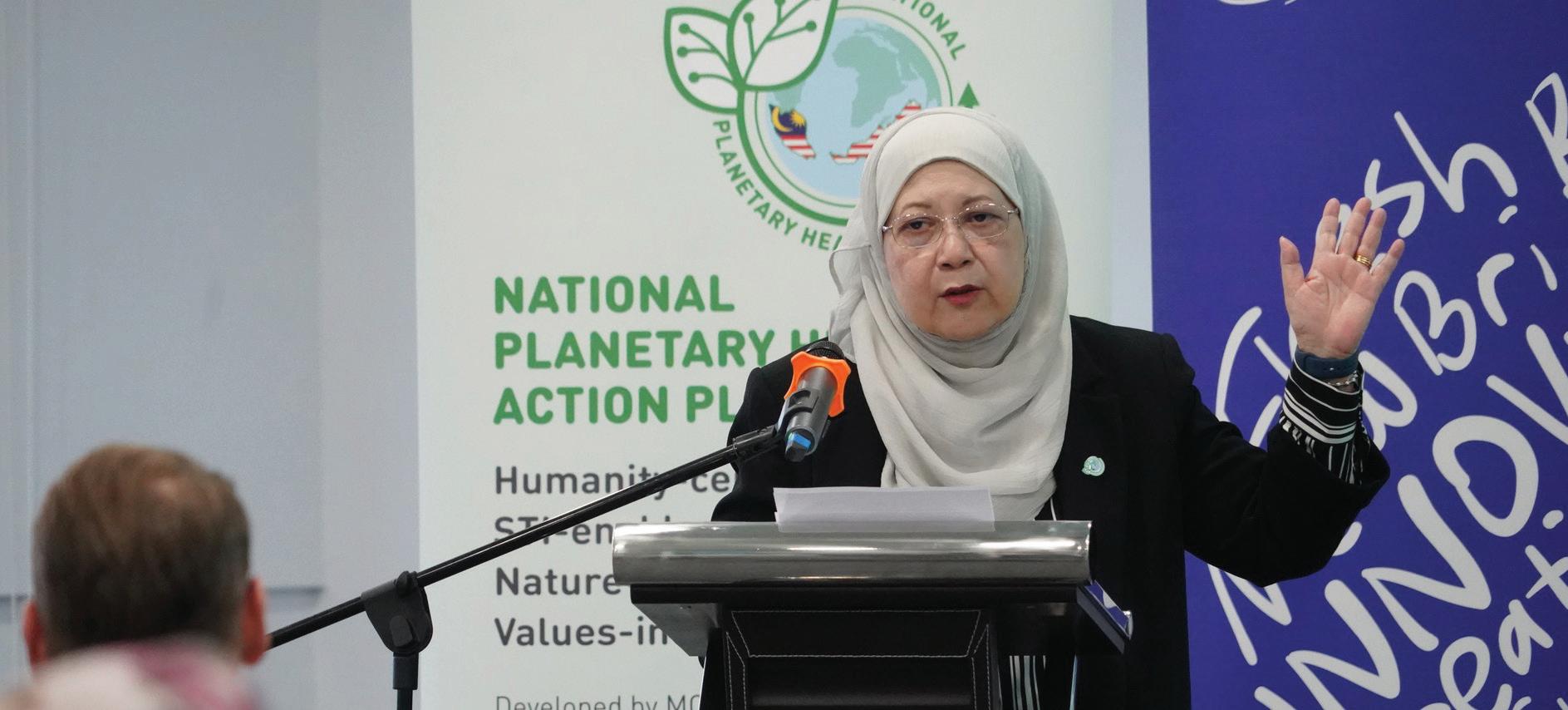
the positive upward trajectory of the system. In 2018, she was awarded Anugerah Tokoh Srikandi Negara for her leadership and charisma in education. She concluded a study titled, ‘A New Horizon for Science, Technology, and Innovation (NHSTI)’, by ASM in partnership with the Ministry of Higher Education. The NHSTI paper assessed the impact of current and future disruptive technologies on teaching and learning, research and innovation, and the governance of higher education and proposed relevant strategies.
Contributions to ASM
Datuk Dr Asma was elected a Fellow under the Medical and Health Sciences Discipline in 2003. She remained an active member of ASM and served in various roles and committees. Among her many remarkable contributions, she led as ASM’s 5th President (2016-2022) and Vice-President (2012-2016), a Council Member of ASM (2007-2009) (2009-2011), and the Chairperson for the Top Research Scientists Malaysia (TRSM) Project Working Committee (20102012). These remarkable achievements are just a fraction of her unparalleled contributions to science and leadership.
0On top of that, she revolutionised the selection process for young Malaysian scientists attending the prestigious Lindau Nobel Laureate Meetings in Germany, dramatically boosting their success rates. Her approach became a model for other international programmes, including the CERN Summer Student Programme and IAMP Young Scientists Programme.
As the past President of ASM, she believed in building upon the foundations laid by her predecessors. She also emphasised utilising local experience to solve the nation’s problems. Thus, ASM echoed the tagline, ‘For Malaysians, by Malaysians’ in its functions. During those times, she played pivotal roles in key committees, serving as the Chairperson of the STI Advisory and Policy Committee, a member of the National Science Council chaired by the Prime Minister, a Trustee of the Mahathir Science Foundation (2017–2022), and a member of the National High-Tech Council (2020).
She transformed ASM from being the nation’s Thought Leader in STI to a Changemaker. Under her leadership, ASM focused on closing the gaps and strengthening the nation’s STI ecosystem. Frequent and exhaustive presentations on ASM recommendations and findings on the gaps in the current STI governance and ecosystem were a daily routine. This effort in educating and engaging various levels of stakeholders of the quadruple helix sector, policymakers, and society resulted in a much better understanding and appreciation of the STI policy and the importance of science in economic development. This led the Ministry of Science, Technology, and Innovation (MOSTI) to propose institutionalising the STI Advisor to the Nation, with the Malaysian Cabinet approving the ASM President’s appointment as the STI Advisor to the Prime Minister and the Nation on 23 June 2022. This was a momentous moment for ASM and the scientific community.
Datuk Dr Asma Ismail delivered her opening remarks during the National Planetary Health Action Plan Forum in 2022
“I was taught to question everything—even if something was published in a high impact journal, that didn’t mean that you couldn’t question the science behind it.”
With her direction, ASM formed the Special Interest Groups (SIG) and Committees to provide expert input to stakeholders. SIG on COVID-19, SIG on Social Innovation, and 10 WEHAB++ Committees provided rapid responses to current challenges at the national and regional levels. These SIGs and WEHAB++ Committees independently evaluated the landscape or issues at hand. They put forward evidence-based, data-driven recommendations as possible solutions or ways forward to the government.
Currently, she is leading NPHAP (2023-2025), a crossministerial initiative whose approach is the first in the world. She leads a committee of seven pillars with 79 working group members. In addition, Datuk Dr Asma also chairs the NER study, which aims to recommend comprehensive education reform to the government to strengthen the development of future-proof talent. This recommendation will set the macro direction for talent development through the five-year Malaysia Plans.
Contributions at the National & International Level
Over the years, Datuk Dr Asma has served as a board member for the Collaborative Research in Engineering, Science and Technology (CREST) Center since 2017, a board member of IIUM Holdings Sdn Bhd, a member of the National Action Council on Shared Prosperity Vision under the Distinguished Educator category, and an independent Board of Trustee for the Merdeka Award Trust.
She has participated in the selection panel for various international awards and recognitions, such as the TWAS membership (Medical and Health Sciences) and the Islamic Development Bank (IDB) Prize for Women’s contribution to development.
Datuk Dr Asma has been entrusted with leadership roles on some of the world’s most influential international boards, including the Board of Governors for Commonwealth of Learning (COL) based in
Vancouver, Canada and the Governing Advisory Board Member for Ritsumeikan Asia Pacific University, Japan. In 2022, she was appointed Co-Chair of the Inter-Academy Partnership Board, comprising 150 science academies worldwide, and elected to the International Science Council Standing Committee for Science Planning, alongside chairing IAP’s membership.
More recently, she was named by Forbes Asia magazine as among the 50 over 50 from Asia Pacific in January 2023 that had reached new heights in contributing to the field of higher education, research and innovation, as well as STIE policy, locally and abroad and for inspiring the next generation.
In recognition of her leadership in lifelong learning in the Commonwealth, especially for women, she was conferred an Honorary Fellow of the Commonwealth of Learning and Honorary Scholar for the Institute for Applied System Analysis (IIASA) in Vienna, Austria, in 2019.
With her unparalleled contributions to science and education, Professor Emerita Datuk Dr Asma Ismail FASc has redefined leadership. Her legacy continues to inspire and pave the way for future trailblazers.
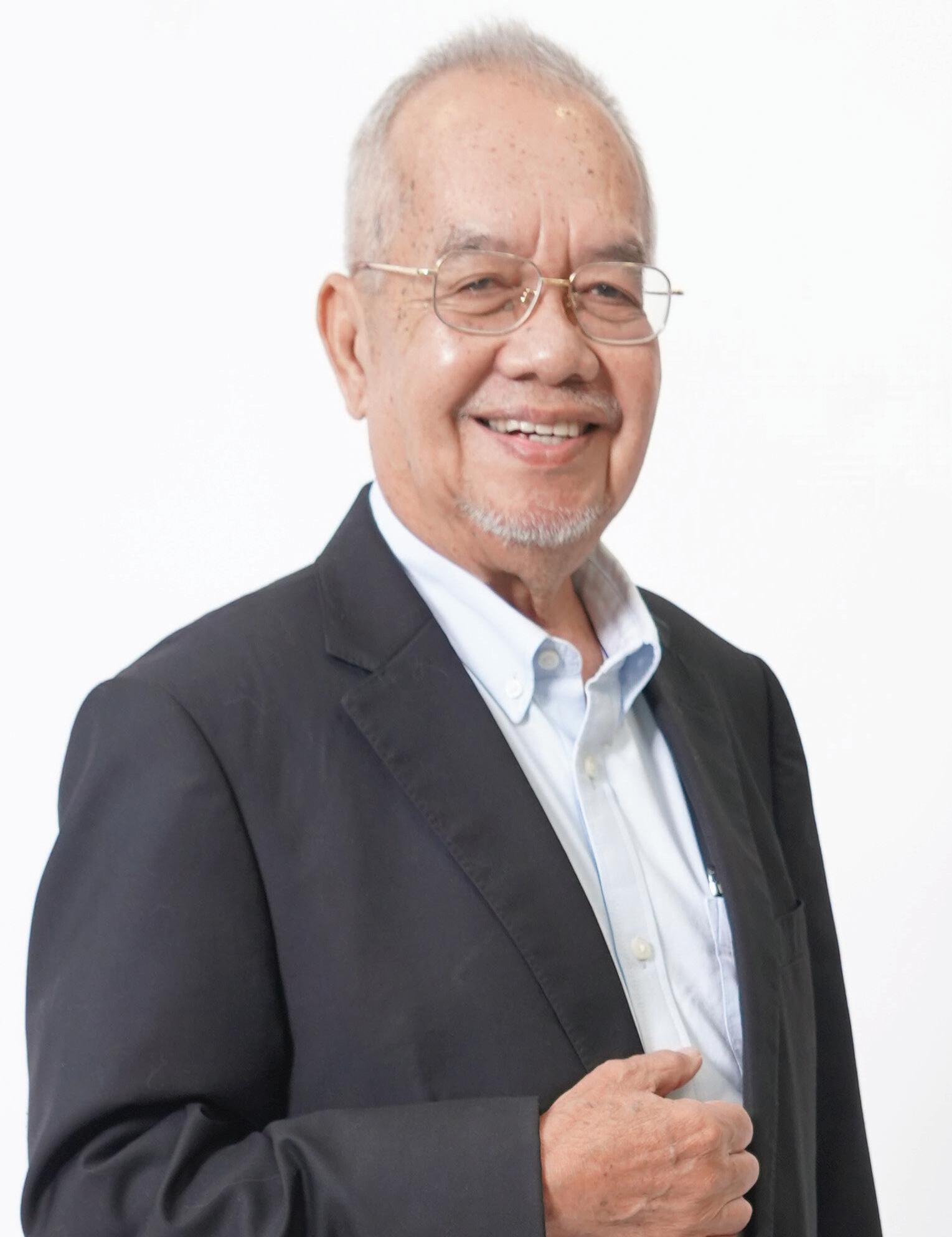
WRITING FOR CHANGE: A CATALYST FOR KNOWLEDGE
Academician Professor Dato’ Dr
Ahmad Ibrahim FASc
Academician Professor Dato’ Dr Ahmad
Ibrahim FASc is a distinguished academic and industry leader with expertise in chemical engineering, environmental science, and science policy. He has held key leadership positions in research institutions, academia, and policymaking bodies throughout his career, making significant contributions to Malaysia’s science, technology, and innovation (STI) landscape.
He began his career in 1973 at the Rubber Research Institute of Malaysia (RRIM). He researched the development of waste treatment systems for effluents from rubber processing factories. Systems studied included anaerobic filters, aerobic ponds and rotating bio-discs. He also collaborated with scientists at the Palm Oil Research Institute of Malaysia (PORIM) on the design of waste treatment systems for palm oil mill effluents.
In 1991, he joined PORIM and served three years as the Director of Techno-Economics and Technical Advisory Services. He then joined the Malaysian Palm Oil Promotion Council (MPOPC) as Director of Market Promotions for nine years, travelling the world to speak about the benefits of palm oil. After retiring from MPOPC in 2003, he worked for a year at the Technology Park Malaysia Corporation (TPM) and then became the Vice-President of Research at the Standards and Industrial Research Institute of
Malaysia (SIRIM). In 2007, he served at the Malaysia University of Science and Technology (MUST) for three years and became the Chief Executive Officer of ASM in 2011.
He is actively involved in new initiatives to develop improved guiding policies for advancing STI in the country. He has contributed to the nation’s pursuit of scientific research and development (R&D), developing science and technology (S&T) policies for Malaysia, promoting the global marketing of palm oil, and raising public awareness of S&T through his media writing.
He is now a Professor of Chemical Engineering at the UCSI University, Kuala Lumpur, and the Programme Working Group Coordinator for the Tan Sri Omar Centre for STI Policy Studies. The Centre was established by UCSI in 2021 to promote the enhancement of the national science, technology and social innovation agenda. He also serves as the Senior Advisor for Fraunhofer Research Germany in Malaysia.
Contributions to Science, Engineering and Technology
Dato’ Dr Ahmad is driving a new era of innovation in environmental engineering, transforming how we treat industrial waste through bold, boundarypushing research. His contributions
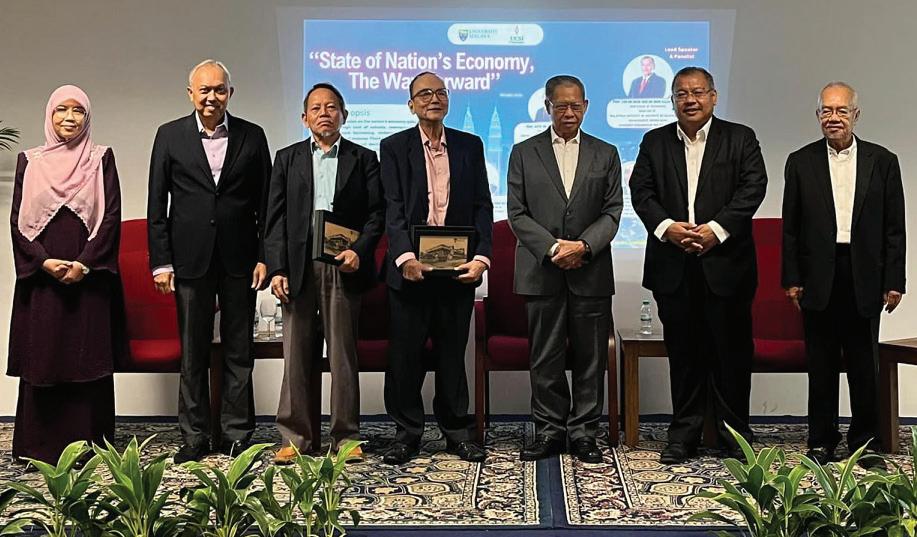
Dato’ Dr Ahmad moderated the Ungku Aziz Economy Forum, themed ‘State of the Nation’s Economy: The Way Forward,’ held on August 2024 at Universiti Malaya (UM)
include developing innovative treatment mechanisms for wastewater from rubber and palm oil industries, researching anaerobic digestion of palm oil wastes and highnitrogen wastewater, and investigating biogas production from palm oil digesters for energy generation. Additionally, he has led studies on rubber product technology and the global oils and fats market, providing valuable insights into industry advancements.
Beyond research, Dato’ Dr Ahmad had played a key role in shaping policies and sustainable practices. He was consulted for the Food and Agriculture Organization (FAO) on palm oil production policies and their environmental impact, ensuring a balance between industry growth and ecological responsibility. His participation in national and international committees on renewable energy and biotechnology further reinforced his influence in promoting sustainable industrial practices, particularly in the palm oil and rubber sectors.
He has developed a strong expertise across various scientific and technological disciplines. He has left an indelible mark on the development of national perspectives on S&T policies through his media writings, covering topics related to STI, sustainability, smart urban planning, city waste, the future of the rubber industry, and the sustainability of the palm oil business. He regularly contributes to the New Straits Times (NST) and The Star.
As a Fraunhofer Senior Advisor in Malaysia, he has written numerous articles on Industry 4.0 and the digital economy and has spoken on the topic as part of a German Delegation visiting Malaysia. He has developed a deep passion for big data intelligence and its implications for smart cities and urban planning through his strong association with the Fraunhofer Network.
“Everyone must be literate in science, because science is the centre of most things.”
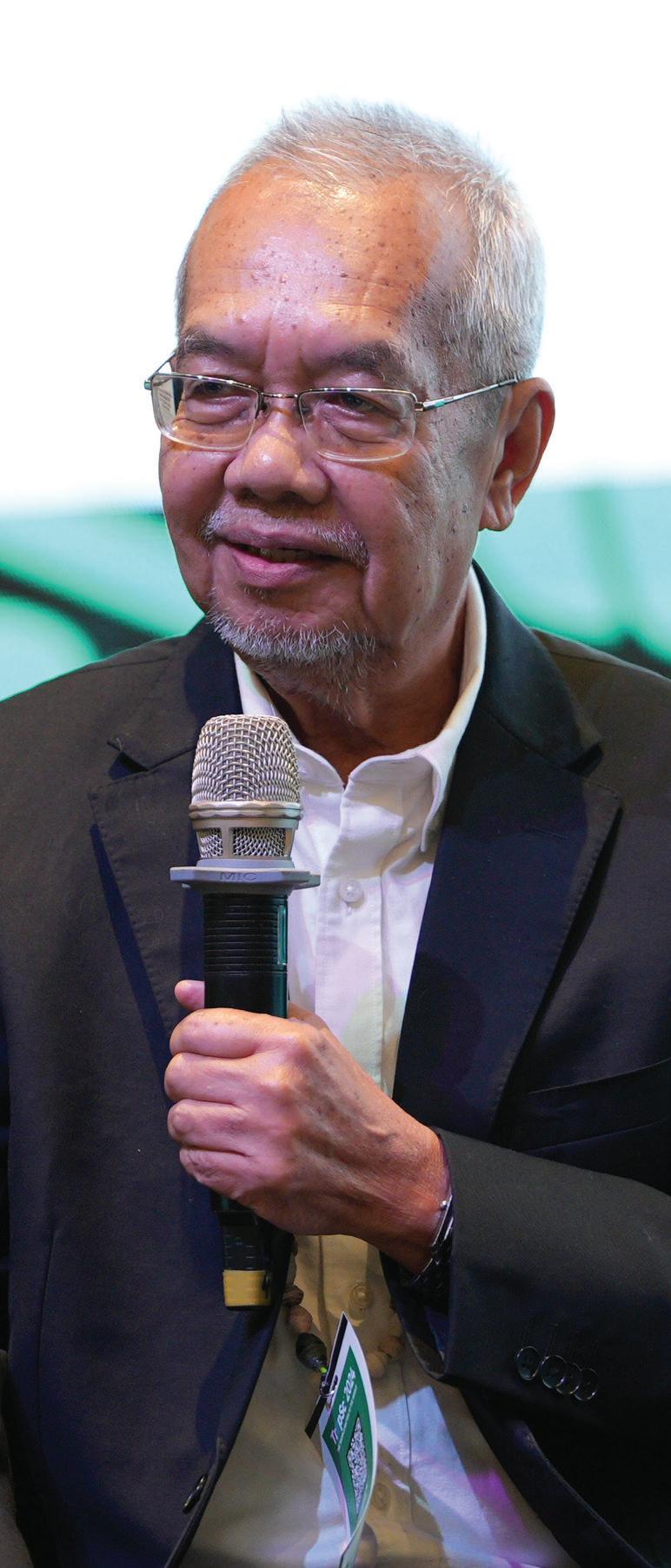
Contributions to Education
Dato’ Dr Ahmad has made significant contributions as an educator, shaping the future of engineers and scientists. As a Professor of Chemical Engineering, he has taught key subjects in wastewater treatment, environmental management, quality assurance, and sustainability. His commitment to education extends beyond the classroom, as he actively mentors students in research areas such as waste recycling, innovation management, and science policy.
In addition to his teaching and mentorship, Dato’ Dr Ahmad has enriched engineering education by introducing essential industry concepts, including ISO 14000, life cycle assessment (LCA), and Six Sigma quality tools. His dedication to integrating these methodologies into the curriculum has helped equip students with the knowledge and skills needed for sustainable and high-quality engineering practices. Through his efforts, he has inspired a new generation of professionals in environmental science and chemical engineering.
Dato’ Dr Ahmad has extensive teaching experience in various environmental and engineering disciplines. He began his academic career in 1984, teaching wastewater treatment to final-year civil engineering students at the Universiti Malaya (UM). Over the years, he has lectured on Quality Assessment and Assurance for the Master of Engineering in Environment, Safety, and Health at UM, as well as Trade and Environment for the Master of Science in Environment at Universiti Putra Malaysia (UPM).
His teaching portfolio spans a wide range of topics, reflecting his multidisciplinary approach. These include environmental management systems, sustainability science, quality tools, and essentials of innovation management. He also covers science journalism, science policy, and interpersonal communication, equipping students with critical analytical and communication skills. Additionally, he shares industry-specific knowledge on the palm oil industry, rubber industry, chemical processing technology, and waste recycling, ensuring students gain practical insights into key sectors related to environmental sustainability and industrial development.
Contributions to ASM
Through a sustained commitment to excellence, Dato’ Dr Ahmad has played a pivotal role
in advancing ASM through his leadership and contributions. As the CEO of ASM in 2011, he spearheaded efforts in STI policy development, shaping strategies to strengthen Malaysia’s research landscape. He had also contributed as a Council Member (2020-2024) and was actively involved in key national initiatives, including the National Science & Research Council and the formulation of the National Science and Technology Policy (NSTP 3), reinforcing Malaysia’s commitment to scientific progress.
Beyond policy development, Dato’ Dr Ahmad has been a strong advocate for integrating science and technology into national development. His efforts have fostered greater collaboration between academia, industry, and government, strengthening the nation’s research ecosystem. His contributions have shaped a more dynamic and forward-thinking scientific landscape in Malaysia.
Contributions at National & International Level
Dato’ Dr Ahmad’s contributions span multiple domains, from policy advising to global representation. He has represented Malaysia in international forums such as the ASEAN Biomass Network on Renewable Energy and has provided strategic counsel to government ministries on R&D priorities, public research assets, and STI policies. His authority in the field earned him a place at the international table, where he advised FAO on palm oil sustainability and trade policies.
Dato’ Dr Ahmad has significantly influenced industry engagement and sustainability initiatives. As a board member of major organisations like Sime Darby Plantations and FELCRA Niaga, he has worked closely with industry leaders to enhance Malaysia’s position in palm oil marketing and environmental sustainability. His extensive networking across scientific, industrial, and governmental sectors has strengthened Malaysia’s STI landscape, contributing to its global reputation.
Through his multifaceted roles, he continues to shape the nation’s innovation ecosystem, while driving sustainable growth and fostering international cooperation.
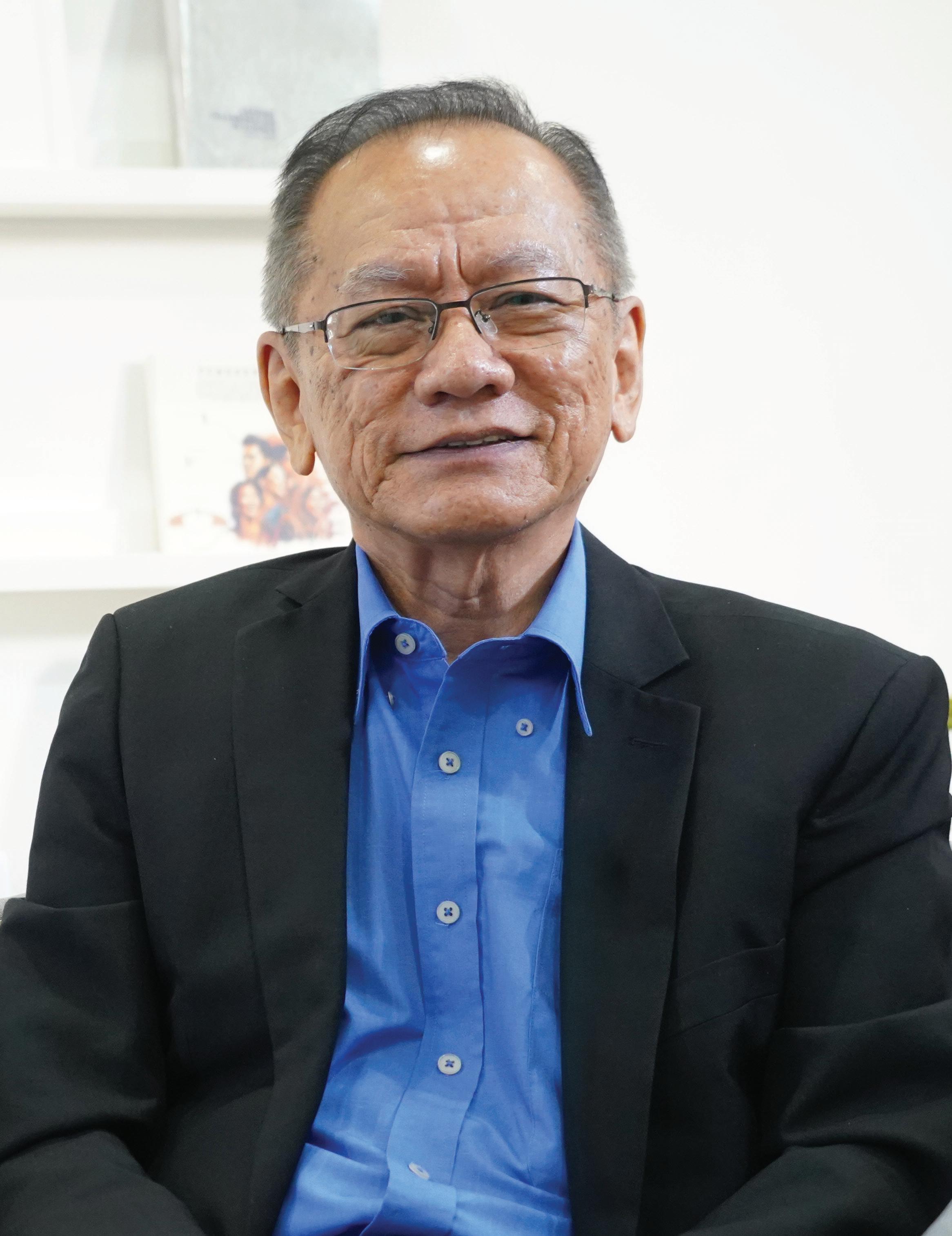
FROM LAB TO SOCIETY: SERVING NATION, INSPIRING LEARNING, PROMOTING SCIENCE
Academician Dr
Koh Chong Lek FASc
Academician Dr Koh Chong Lek FASc is widely recognised as an expert in genetics, molecular biology, and biotechnology across Malaysia and the Asia-Pacific. His distinguished academic career spanned 48 years, during which he made significant contributions to universities and research institutes in Malaysia, Singapore, England, Germany, Japan and the United States. He played a crucial role in advancing scientific knowledge and research in these fields.
Dr Koh passionately pioneered the development of genetics, molecular biology, and biotechnology in Malaysia. His visionary leadership has shaped biotechnology and human capital development in Malaysia and Singapore, leaving a lasting impact on education, research, and the scientific community.
Since July 2023, he has been serving as a Freelance Consultant in DNA, ageing and nutrigenomics. He then served as the Chief Scientific Consultant for ALPHAVI Pte Ltd, a Singapore-based company specialising in longevity and preventive healthcare. He remains committed to scientific innovation through these roles, extending health span and promoting healthy ageing.
He received numerous prestigious recognitions throughout his career. He was elected as a Founding Member of the Asia-Pacific International Molecular Biology Network (A-IMBN) in 1998, one of only three scientists from Malaysia. Concurrently, he served as a Member of the Governing Council for A-IMBN, a Fellow of the Malaysian Scientific Association (MSA) in 1999. and a Council Member of the Singapore Institute of Biology (2006-2013).
His expertise was sought internationally, leading to his invitation by the Vietnamese organisers of the 27th International Biology Olympiad (IBO) in 2016 to critically assess and refine the English language of the competition’s question set. He also served as an External Evaluator for Biology Study Programmes at the Institut Teknologi Bandung (ITB) and Universitas Gadjah Mada (UGM) under the Quality of Undergraduate Education Project (QUE Project) by the Directorate General of Higher Education, Indonesia.
His involvement in bioethics and policymaking
is equally significant. In 2003, Dr Koh represented Malaysia at the 3rd Session of the Intergovernmental Bioethics Committee (IGBC) at UNESCO. During this meeting, he was elected Vice-Chairperson of the Asia-Pacific electoral group and as Chairperson of the Editorial Board, responsible for revising the Preliminary Draft Declaration on Human Genetic Data. Additionally, he served as a Member of the Science and Technology Committee of the Malaysian National Commission for UNESCO (1995-2004) and as an Executive Secretary of the UNESCO Regional Network for Microbiology and Microbial Biotechnology in Southeast Asia (1996-2001). He had also contributed significantly to Malaysia’s National Genetic Manipulation Advisory Committee and the National Biotechnology Policy under the Ministry of Science, Technology and Environment (MOSTE) (1995-2004).
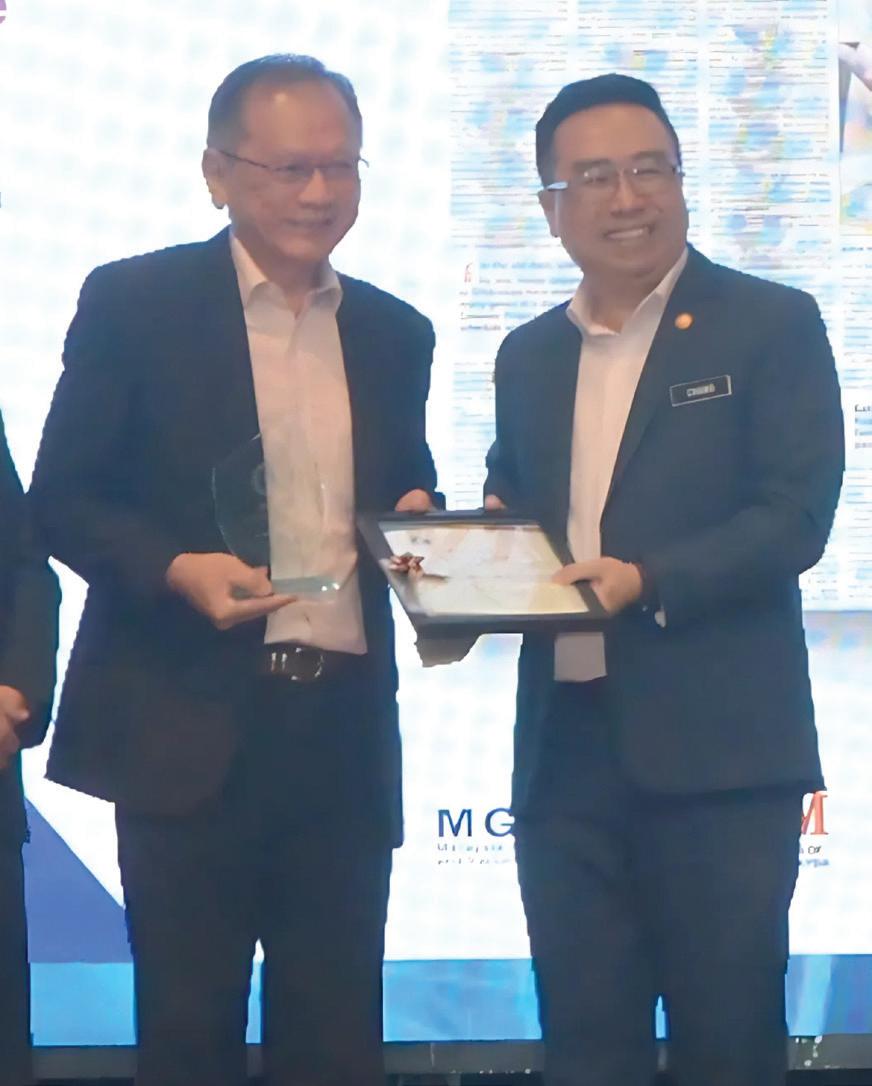
Contributions to areas of Science, Engineering and Technology
Dr Koh was the Chief Scientific Officer of Gene Express Sdn Bhd (2018-2023), a laboratorybased company specialising in direct-toconsumer (DTC) DNA typing services. During his tenure, he was pivotal in establishing the company’s laboratory and achieving ISO 17025:2017 accreditation from the Department of Standards Malaysia for human DNA typing, making it the first of its kind in Malaysia.
Dr Koh Chong Lek awarded with the PGM Zakri Award 2023
Dr Koh is a highly accomplished scientist who has received multiple prestigious awards in recognition of his contributions to molecular genetics, biotechnology, and forensic DNA research. He was honoured with the PGM Zakri Award by the Genetics Society of Malaysia (PGM) in recognition of his outstanding achievements in molecular genetics and dedication to advancing the field. He also received the Inaugural Distinguished Scientist Award from the Malaysian Society for Molecular Biology and Biotechnology.
His impact on forensic DNA research was also recognised when he received the K Prathap Memorial Lecture Award from the College of Pathologists and the Academy of Medicine Malaysia. He was then honoured with the Inaugural Malaysian Society for Molecular Biology and Biotechnology (MSMBB)–Applied Biosystems Award in recognition of his original and significant contributions to molecular biology and biotechnology.
Beyond these accolades, he received international awards to participate in esteemed scientific programmes and conferences. Among these are the United Nations Environment Programme (UNEP), the Norwegian Institute of Gene Ecology, and the Japan Society for the Promotion of Science (JSPS). These awards facilitated his participation in global discussions and training programmes on biosafety, biophysics and biotechnology. His extensive list of achievements and international collaborations underscores his significant contributions to the advancement of molecular genetics, biotechnology and forensic DNA research on both national and global levels.
Contributions to Education
Demonstrating his academic standing, he was the external examiner for the Bachelor of Science (Hons.) in Biotechnology programme at Universiti Tunku Abdul Rahman (UTAR) (2004-2007). He assessed MSc and PhD candidates at several esteemed local and international institutions, including Universiti Sains Malaysia (USM), the National University of Singapore (NUS), Monash University (Australia), Zhengzhou University (China), and the Hong Kong University of Science and Technology.
He has taught various courses at the National Institute of Education (NIE) and the Nanyang Technological University (NTU), covering key areas in biology and genetics. These include current genetics, general microbiology, molecular biology, and advanced animal biotechnology. His contributions to
“Science is what we call ‘internationalism’, we could help solve problems faced by different people in the world through international collaboration.”
teachers’ education include the Teaching of Biology II (Microteaching) and specialised courses such as Selected Topics for Primary Science Teaching (Biological Science) and Topics in Biological Science for Primary Science Teaching. These courses were designed to equip educators with the necessary knowledge and practical skills to teach biological sciences effectively.
Beyond his work in mainstream academic courses, he has been actively involved in conducting in-service training at the DNA Centre at NIE, NTU. These specialised courses cater to educators and laboratory technicians, enhancing their practical knowledge of DNA science. He had also designed and delivered advanced workshops for Junior College biology teachers, such as H2 Biology: Hands-on Workshop on the Applications of DNA Science and H2 Biology: Genetics of Viruses and Organisation of Prokaryotic & Eukaryotic Genomes.
His teaching experience extends beyond NIE, NTU, with a significant contribution at Universiti Tunku Abdul Rahman (UTAR). He has taught biochemistry to first-year MBBS and Physiotherapy students, ensuring a strong foundation in biochemical principles essential for medical and allied health sciences. This role has allowed Dr Koh to engage with students in the medical field and contribute to their early-stage academic and professional development.
From 1999 to 2004, he was invited to teach several external courses in Malaysia, particularly in molecular genetics and molecular biology. At the Institute for Medical Research (IMR) in Kuala Lumpur, he delivered lectures on basic genetics & R factors and nucleic acid sequencing for the diploma course in medical microbiology (SEAMEO TROPMED). These courses were designed to provide medical researchers with a firm theoretical and practical grounding in molecular biology techniques.
Dr Koh’s contributions also extended to specialised
training programmes in Malaysia. At IMR, he delivered lectures on cloning strategies, screening of DNA library, use of DNA probes in clinical diagnosis and DNA fingerprinting. He also presented a lecture on the mechanism of the development of antibiotic resistance in Neisseria gonorrhoeae for the advanced course in STD and provided forensic training through lectures on DNA fingerprinting, DNA profiling and DNA typing at a course on Scientific Investigation at the Royal Police of Malaysia’s Police Training Centre in Kuala Lumpur.
Apart from these specialised courses, he has also been invited to deliver guest lectures and training sessions at various institutions in Malaysia, including Universiti Kebangsaan Malaysia (UKM) and Universiti Malaya (UM). Other engagements include delivering lectures on molecular biology to medical students, presenting on genetics at a postgraduate conference, and teaching molecular biology techniques in a course on oil palm tissue culture. Through these diverse teaching roles, he has been able to share his expertise and contribute to advancing scientific knowledge in various disciplines.
Contributions to ASM
At ASM, Dr Koh was elected a Fellow in 1999 under the Biological, Agricultural, and Environmental Sciences (BAES) discipline group. He has made a profound contribution to ASM through various committees and activities, including chairing multiple highprofile committees, such as the 2021 MAKNA Cancer Research Collaboration Fund, the 2008 Mahathir Science Award Evaluation Committee and the Dr Ranjit Bhagwan Singh Memorial Lecture Organising Committee (1999–2000, 2002–2007). He also played a pivotal role in organising public lectures for renowned scientists, including Professor Dr Barry J. Marshall (2002) and Professor Dr David Ho (2000), furthering ASM’s scientific engagement and knowledge dissemination mission. He was also part of the Selection Panel of Top Research Scientists Malaysia (TRSM) (2017-2018) and participated in the finalisation workshop for TRSM Recognition in 2022. Additionally, he was a member of the ASM Vetting Committee for BAES discipline (2022, 2023 & 2024).
His involvement extended to strategic initiatives and advisory roles, including serving on the NewtonUngku Omar Fund (NUOF) Committee for medical research programmes in collaboration with the UK’s Medical Research Council. He was an expert reviewer for the Biotechnology-Agriculture subsector under the National Brain Gain Programme and contributed to establishing the National Science Foundation in
Malaysia. His visionary efforts were also reflected in his participation in the ‘How to Get a Malaysian Nobel Laureate by Year 2020’ Committee.
Contributions at National & International Level
Dr Koh has actively organised and spoken at numerous impactful events within and beyond Malaysia, focusing on science, technology, economy, society, and the environment. His contributions include serving in various leadership and advisory roles in international conferences, symposia, and scientific forums. His involvement has spanned diverse fields, demonstrating his commitment to advancing knowledge and collaboration across disciplines.
He has also played a pivotal role in numerous prestigious events, including serving as a Member of the Advisory Board for the 15th Asian Conference on Transcription (ACT-XV) and the Organising Committee for the 23rd International Biology Olympiad. He was also part of the National Organising Committee for the 2012 Molecular Frontiers Symposium on Emerging Technologies in Biomedicine. His contributions extended to policy and environmental initiatives through his role as an advisory panel member for the UNEP/GEF ‘Toolkit Stakeholder Review Project’ in 2005.
Beyond these roles, Dr Koh had represented Malaysia in several high-profile international engagements, including ‘Biotechnical & Business”’and the APEC Life Sciences Innovation Forum. He also chaired the International Organising Committee for the 7th Asian Conference on Transcription (ACTVII) and contributed to regional biotechnology advancements as part of the ASEAN Project Proposal in Biotechnology’s International Working Group 2001.
He stands as a catalyst for scientific advancement and international cooperation, with a lasting influence on the global research landscape.
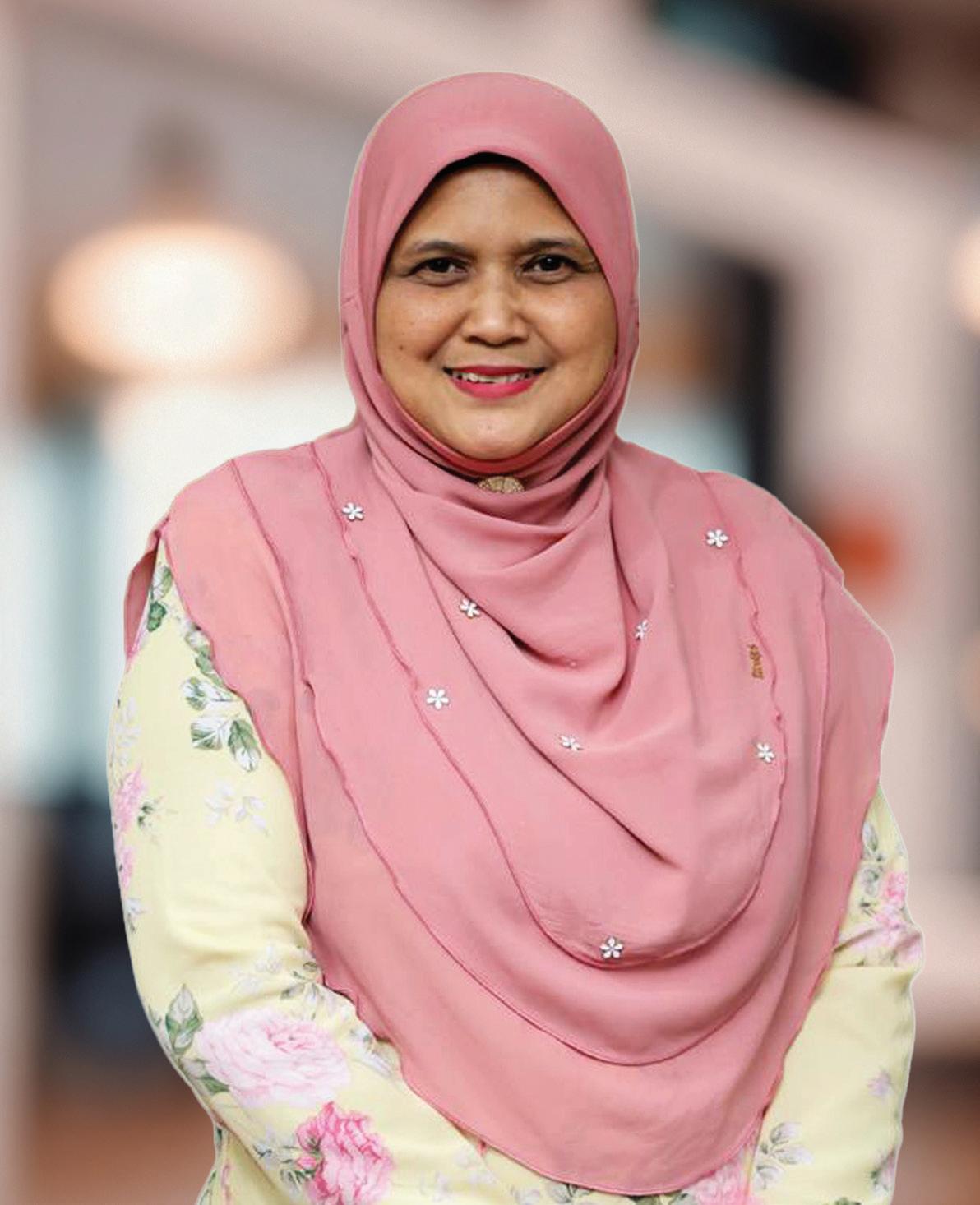
Professor Dr Habibah A Wahab FASc , currently serving as the Deputy Vice-Chancellor of Research and Innovation at USM, specialises in computational chemistry (structural bioinformatics, computer-aided drug design) and drug nanoformulation. She works in the field of medicinal chemistry and is a pioneer in computational biochemistry. She regularly publishes and secures research grants, with an H-index of 33 and 3,728 citations, showcasing her impactful research.
Her footprint in research is evident with the establishment of various labs, including the Laboratory of Biocrystallography and Structural Bioinformatics and the USM-RIKEN Joint Laboratory. She also actively participated in roles such as the Chairperson of the Pharmacy Deans’ Council and VicePresident 1 of the Malaysian Pharmacists Society. Professor Habibah has also served as a member of Pharmacy Board of Malaysia.
Dr Habibah A Wahab FASc
Professor Habibah served as the Director-General of the Malaysian Institute of Pharmaceuticals and Nutraceuticals (IPharm) where she advanced research facilities and international networks in drug discovery research and development (R&D). One of her remarkable contributions as DG was establishing the Animal Research Facility (ARF) and getting it GLP-certified. IPharm has also successfully forged partnerships with renowned international entities and academic institutions.
Her decade-long association as a steering committee of Pacific Rim Grid Middleware and Application (PRAGMA) association, as an Associate Editor for the Journal of Chemical Information and Modelling, as well as her commitment to ASEAN ACS on Campus activities, stands as a testament to her dedication to her field and the wider scientific community.
Deputy Vice-Chancellor (Research and Innovation) Universiti Sains Malaysia (USM)
Professor
Professor Ir Dr Chai Siang Piao FASc
Deputy Head of School (Research)
School of Engineering
Monash University Malaysia
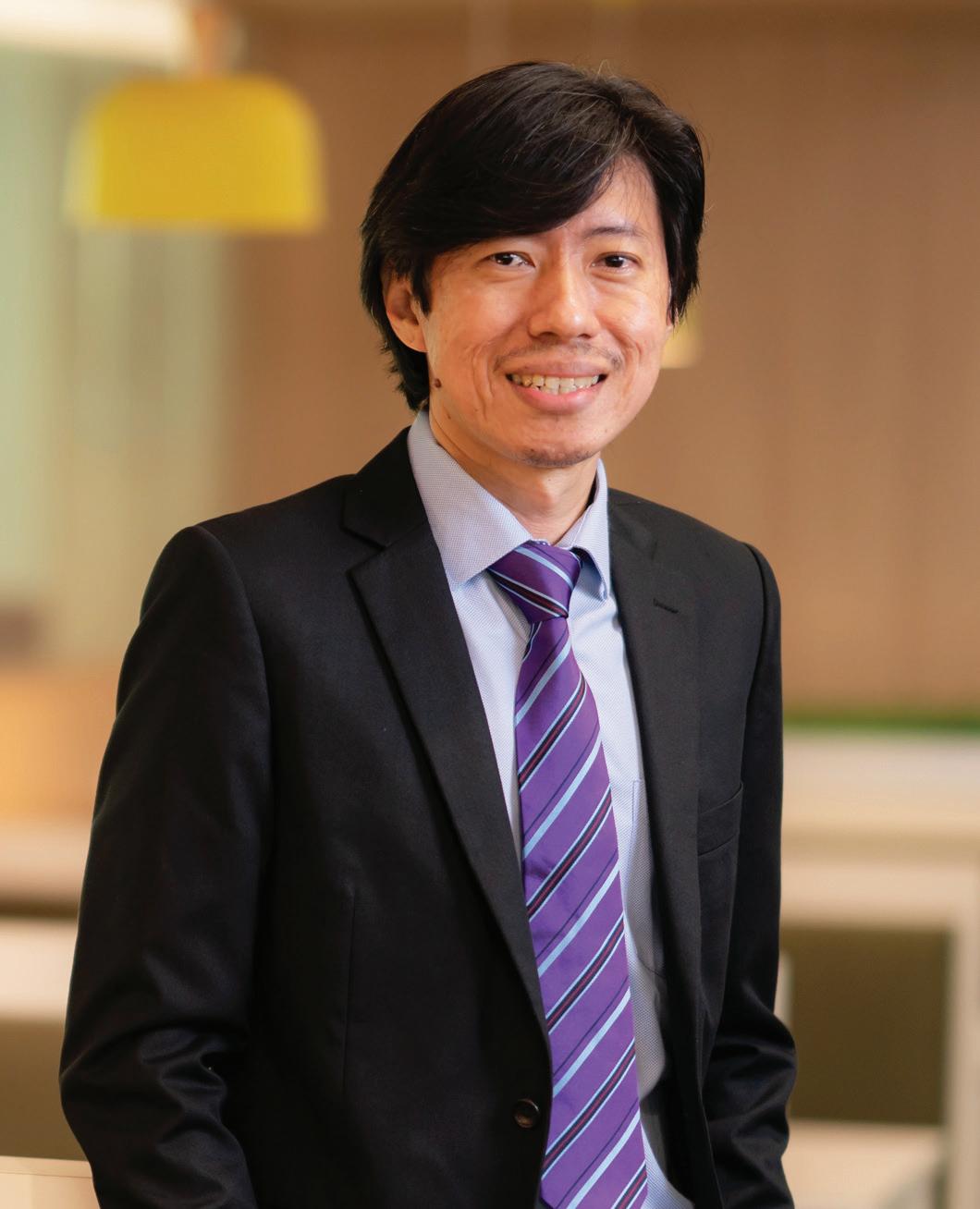
Professor Ir Dr Chai Siang Piao FASc specialises in heterogeneous catalysis, photocatalysis, reaction engineering and advanced functional materials. His relentless pursuit of knowledge is currently centred on creating cutting-edge photocatalytic and electrocatalytic materials for environmental and sustainable energy applications. He also maintains an exceptional publication track record, having an H-index of 66 with over 23,568 citations.
Professor Chai has made significant contributions to advancing the fields of photocatalysis, particularly in photocatalytic water splitting into green hydrogen and carbon dioxide reduction into hydrocarbon fuels. He also contributed his expertise as a grant assessor for national funders such as the Collaborative Research
in Engineering, Science and Technology (CREST), Ministry of Higher Education (MOHE) and Ministry of Science, Technology and Innovation (MOSTI), as well as for international funders from Austria, China, Kuwait, Poland, South Africa, the European Union, and the United States, demonstrating his remarkable impact on the scientific and professional communities.
He has garnered numerous prestigious awards for his achievements in groundbreaking research innovations, including the Highly Cited Researcher by Clarivate, World’s Top 2% Scientist by Stanford University, Top Research Scientist Malaysia (TRSM), Malaysia’s Research Star Award and the National Outstanding Educator Award (Research).
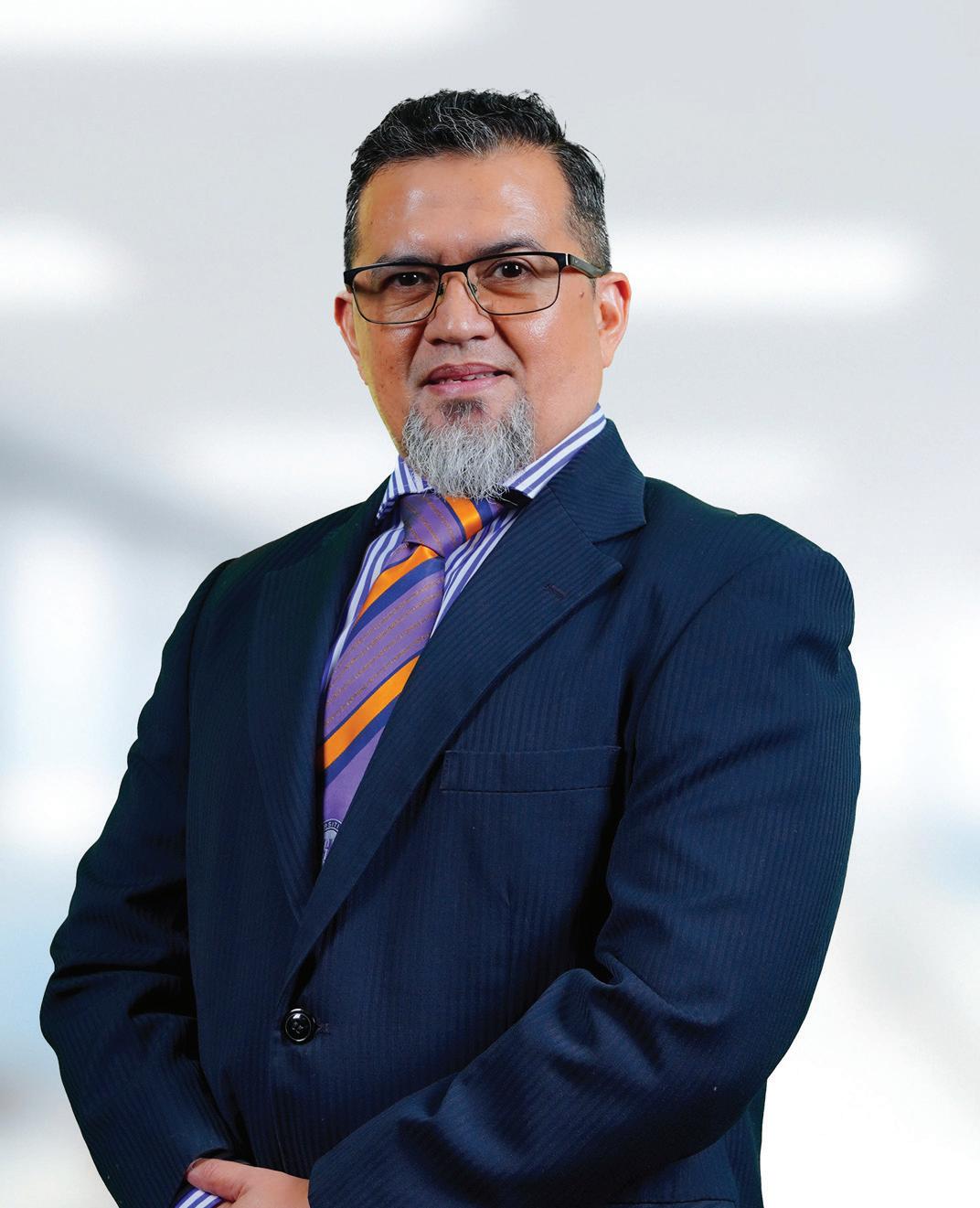
Professor Dr Hazizan Md Akil FASc is a leading expert in natural fibre composites, especially Kenaf fibre. His research interests include polymer composites, with special emphasis on natural fibre-reinforced composites, mechanics of composites, impact response of composites and sandwich structures, chitosan, and dynamic response of composites using Split Hopkinson Pressure Bar Technique. He is one of the team leaders for the cluster of polymer composites research in USM, focusing on producing pultruded composites from Kenaf fibres.
He has published over 250 journal papers, with an H-index of 65 and 16,751 citations. He is regularly invited to review international research grant proposals from research funding agencies such as the Qatar Foundation and the National Science Centre, Poland. A globally-renowned expert in natural fibre composites, he has made significant contributions that have reshaped the field. He is currently an editorial board member of several international
Professor Dr Hazizan Md Akil FASc
School of Materials and Mineral Resources Engineering Universiti Sains Malaysia (USM)
journals such as Journal of Natural Fibers (Taylor & Francis), Composites part ‘C’ (Elsevier B.V), Nonlinear Engineering-Modelling and application (De Gruyter).
Professor Hazizan is often consulted for his expertise by various international and local institutions, universities and industries. These include Lembaga Kenaf dan Tembakau Negara (LTKN), the Malaysian Agricultural Research and Development Institute (MARDI), the Asian Workshop on Polymer Processing (AWPP) Association, Asian Polymer Association (APA) and MMFG Composites Sdn. Bhd.
He is also involved in community service, helping improve the socio-economy of rural communities through the knowledge transfer project to develop Kenaf fibre-based polymer composites for various applications.
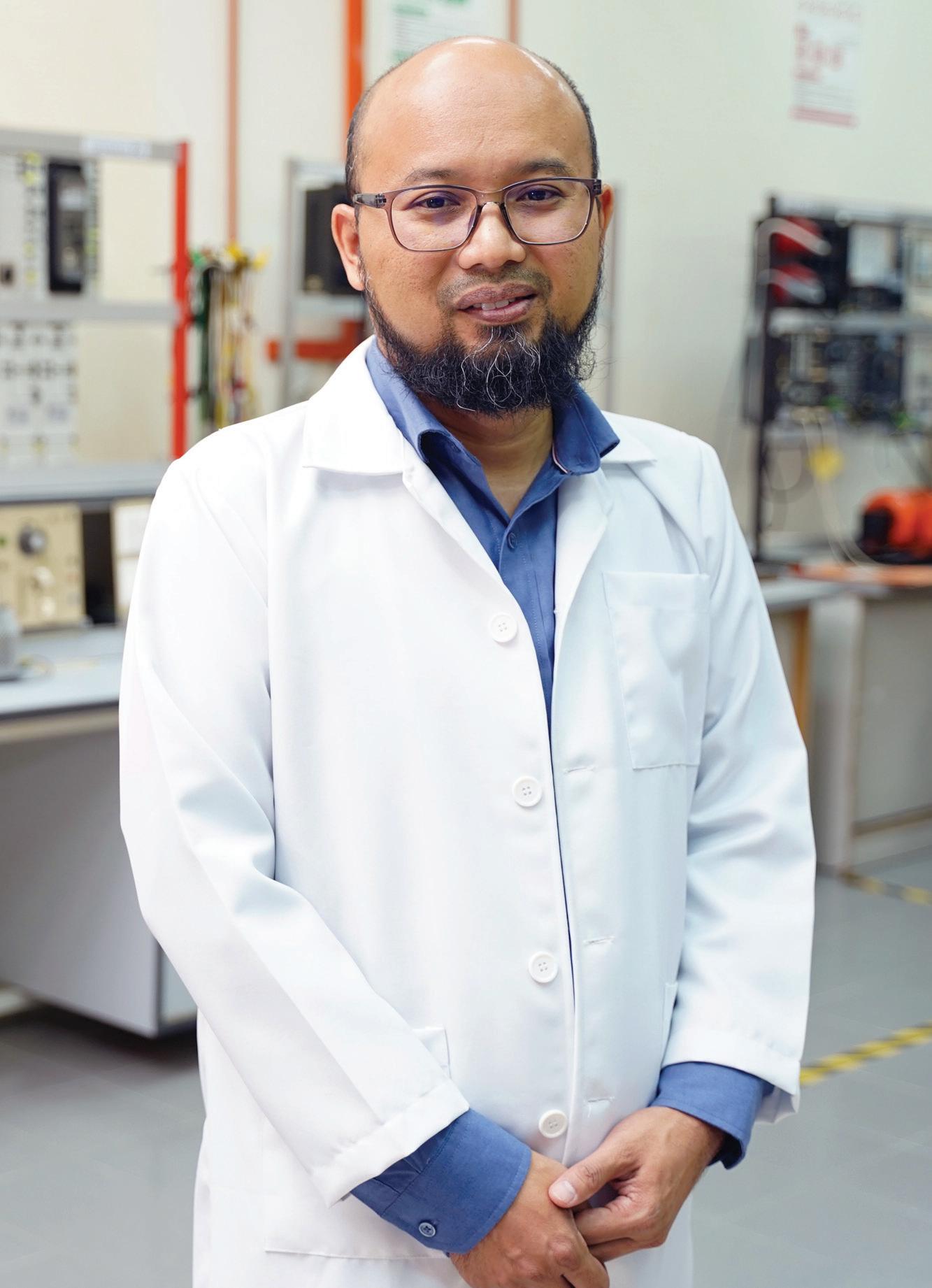
Professor Ir Dr Hazlie Mokhlis FASc
Chairperson of Cluster Innovative
Industry & Sustainability Science
Universiti Malaya (UM)
Professor Ir Dr Hazlie Mokhlis FASc is an expert in electrical power systems, a field crucial due to the high dependency on electrical energy across various sectors. He and his research team work on various methods to improve the performance of the electrical energy supply system for planning and operation. He has over 300 publications, an H-index of 63, and 16,426 citations.
Among his significant contributions is the identification of lightning strike types in Tenaga Nasional Berhad’s transmission lines for effective mitigation. He also helped UM to reduce electricity costs through the implementation of a distribution system configuration. Building on his expertise, his outstanding contributions led to his appointment to the project advisory committee on the Smart Grid Project in 2019.
He was also selected as an expert consultant for the Development of a Replication and Scale Up Plan of Smart Grid in Malaysia by Universiti Tenaga Nasional (UNITEN). Both projects, funded by United Nations Industrial Development Organization (UNIDO) and Tenaga Nasional Berhad, will change the energy landscape in Malaysia by introducing clean, efficient, and intelligent systems to manage electrical energy usage.
Professor Hazlie has actively participated in working groups dedicated to developing industry standards in Malaysia. Two of the standards contributed to High Voltage Switchgear Control Gear & Assemblies (MS IEC 60265-1:2006) and Guidelines for Power System Steady State, Transient Stability, and Reliability Studies (MS 2572:2014) have been widely adopted by industries along with two other standards: Protection Relay Devices (NSC OS/TC 7 /WG 5) and Solar Energy Technologies (NSC 5/TC 8/WG 5) being developed. He represents Malaysia in the standard development activities of the International Electrotechnical Commission (IEC) in TC 8/JWG 10, focusing on system aspects of electrical energy supply.
Professor Ir Dr Kaharudin Dimyati FASc is an expert in wireless communication, optical communication, and disaster management. He has published over 200 high-impact journals covering wireless communications, with the latest on beyond 5G/6G, optical communications, and disaster management employing wireless technology. His H-index is 35, with 4,363 citations.
His work in emergency wireless communications includes a patented technology for determining minimal determinants for multiple transmit and receive antennas, which is now used for low-cost, long-range wireless communication networks for SAR Missions. The technology has received support from Jabatan Bomba dan Penyelamat Malaysia (JBPM). He holds three patented technologies, namely, Modulation of a Signal in Optical Systems, Orbit Satellite Receiver Systems, and a Method for Determining Minimum Determinants for Multiple Transmit and Receive Antennas.
Professor Kaharudin is recognised as a world expert in his field and has contributed significantly to shaping electrical and electronics engineering (EEE) education through his involvement in the Engineering Accreditation Council (EAC), Board of Engineers Malaysia (BEM). He holds the esteemed positions of an EAC Senior Panel and External Examiner to at least five regional EEE programmes.
Since 2003, he has been a consultant and an advisor to various government agencies, industries, and academic institutions. His exceptional expertise and contributions were further recognised when he was appointed as a Tribunal Rayuan Komunikasi dan Multimedia (TRKM) member.
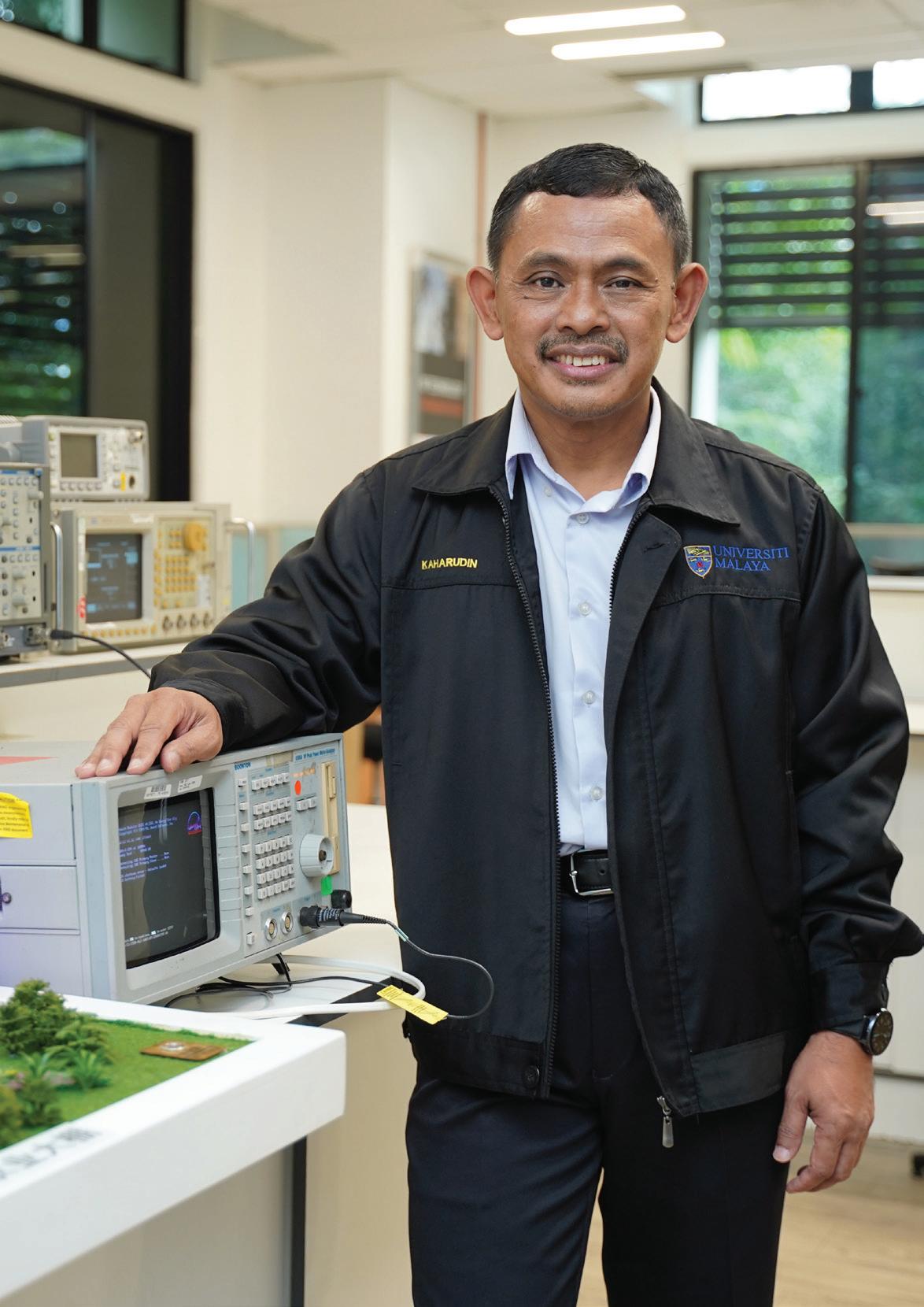
Professor Ir Dr Kaharudin Dimyati FASc
Deputy Vice-Chancellor (Research & Innovation) Universiti Malaya (UM)
Professor Ir Dr Khairul Salleh Mohamed Sahari FASc is an expert in service robotics in Malaysia. His research interests include service and mobile robotics, UAV, and application of control systems, image processing, automation, optimisation, artificial intelligence and sensing. He has published more than 140 papers in SCOPUS-indexed publications. His H-index is 29, with 3,142 citations.
His research achievements encompass pioneering methods for the robotic manipulation of clothing and the development of versatile mobile robots that excel in performing a wide array of tasks. His work on inspection robots has contributed to novel boiler header and pipe inspection techniques in power plants, creating wealth through services rendered using developed inspection robots. His latest collaborative work with the Malaysian Nuclear Agency on a radiation detection robot has enabled accurate mapping of an unknown area contaminated with
radiation sources. The work is currently undergoing further development for commercialisation by the Malaysian Nuclear Agency.
As the Deputy CEO of the Malaysian Qualifications Agency (MQA) from 2019 until 2024, he has contributed towards various quality assurance policies for higher education, including policies that allowed alternative and flexibility in programme delivery and assessment during the COVID-19 MCO period which were published in the form of advisory notes.
Professor Khairul led the ASM Task Force that developed the National Robotics Roadmap 2021-2025. He also participated as a member of the ASM SIG for Machine Learning and the development of the position paper: New Horizon for STI (NHSTI) - A Strategy to Enhance Higher Education in Malaysia.
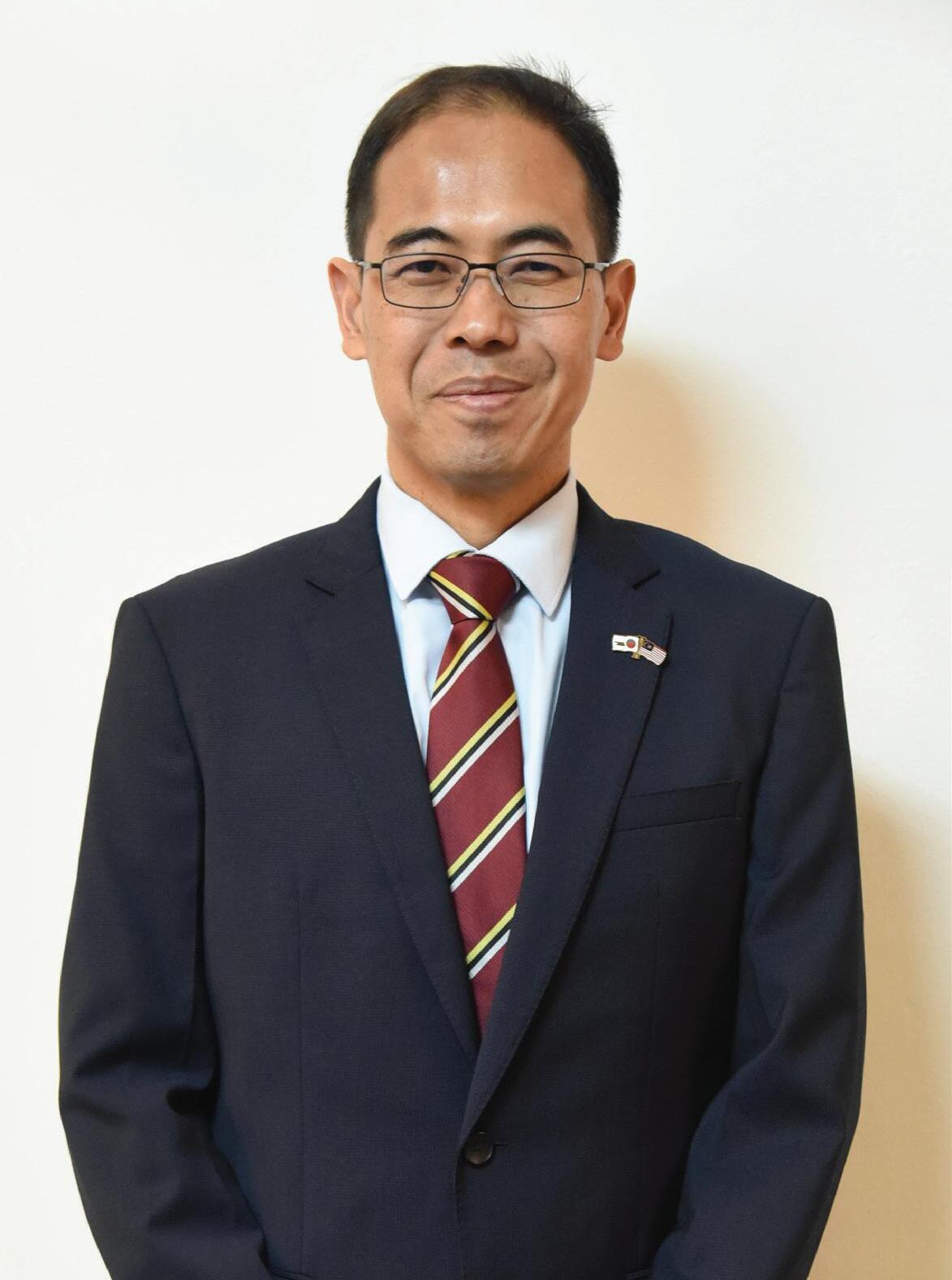
Professor Ir Dr Khairul Salleh Mohamed Sahari FASc
Vice-Chancellor
Universiti Tenaga Nasional (UNITEN)
Professor Ir Ts Dr Mohd Rizal Arshad FASc
School of Electrical & Electronics Engineering
Universiti Sains Malaysia (USM)
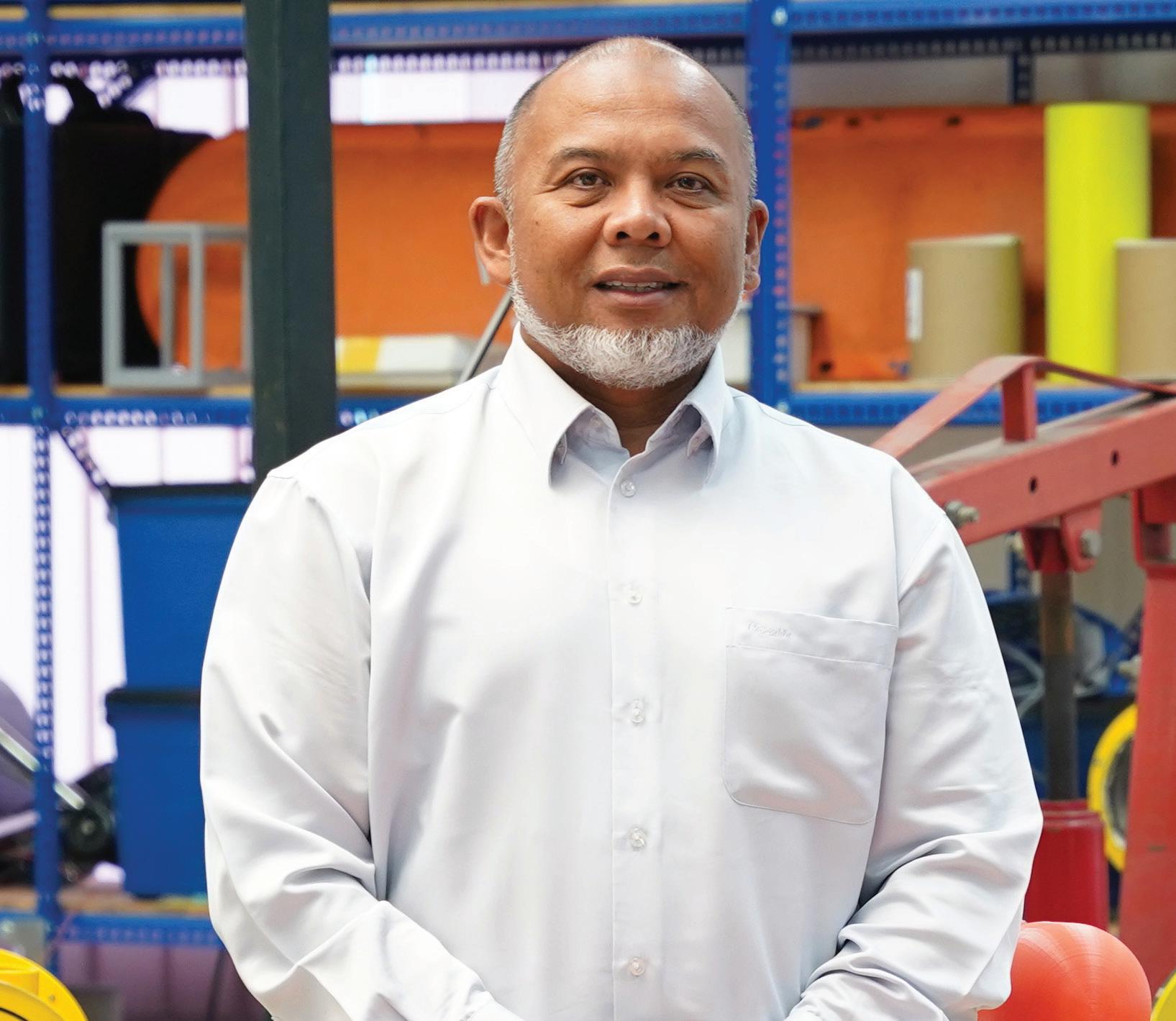
Professor Ir Ts Dr Mohd Rizal Arshad FASc is a distinguished professor at the School of Electrical & Electronics Engineering, USM. With deep expertise in control and robotics technology, particularly in intelligent control approaches, automation, underwater robotics, and sensor design & instrumentation for ocean applications, Professor Rizal has made significant contributions to the field. His research primarily focuses on the practical application of intelligent control methods and industrial robotics. His innovative work has resulted in three patents related to robotic solutions, which are currently being utilised by IROSS Sdn Bhd. With an impressive H-index of 22 and 2,655 citations, his research has been widely recognised and has had a substantial impact on the field.
Professor Rizal’s pioneering work has inspired and influenced numerous researchers, research groups, and technical activities at various local universities; including UTEM, UTHM, UIA, UTM, and UMP. His commitment to fostering international collaboration has led to the establishment of strong research linkages with institutions in countries such as Japan, USA, Saudi Arabia, France, China, Australia, United Kingdom, Singapore, Indonesia, Brunei, and India.
Beyond his research endeavours, Professor Rizal is also a visionary leader in the field. He is the driving force behind the International Underwater System Technology (USYS) Conference series, a flagship conference of the IEEE Oceanic Engineering Society (OES). His dedication to promoting underwater technology has led to the successful initiation of the National Technical Seminar on Underwater System Technology, which has been held annually since 2006. Under his leadership, he has also played a pivotal role in establishing the IEEE OES Malaysia Chapter and the Malaysian Society for Automatic Control Engineers (MACE).
In addition to his academic and leadership roles, Professor Rizal has also been actively involved in industrial collaborations. He has undertaken consultancy work with various companies, including PLUS (M) Sdn Bhd, Subsea Group (M) Sdn Bhd, SEICHE (UK) Ltd, VCSB Sdn Bhd, and PETRONAS, demonstrating his ability to bridge the gap between academia and industry.
Ir Ts Dr Nordin Ramli FASc
Head of Technology Advisory Division
MIMOS Berhad
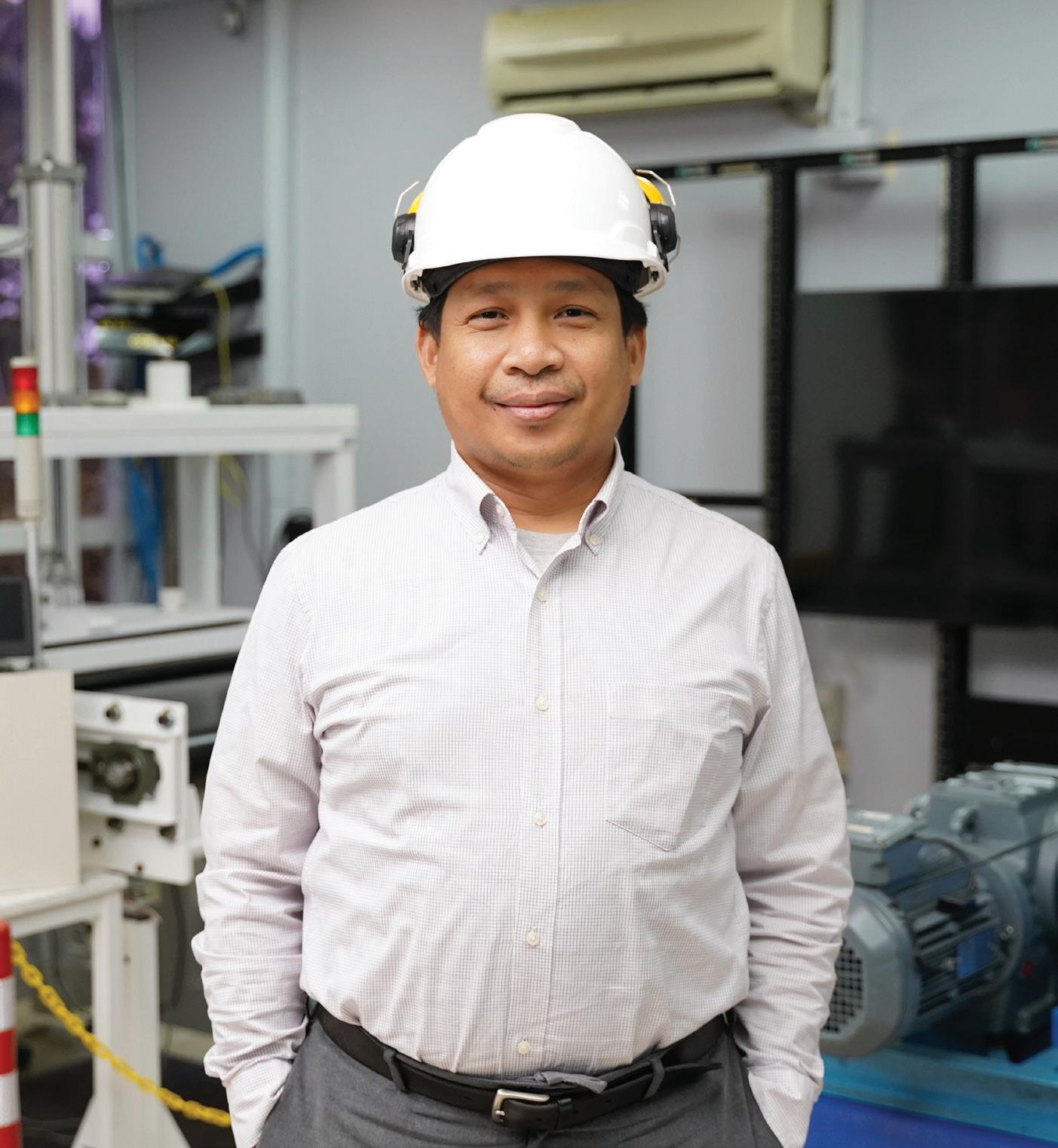
Ir Ts Dr Nordin Ramli FASc is a leading expert in advanced IoT, predictive analytics, and wireless communications, with over 20 years of experience, a portfolio of 30 intellectual properties and over 100 publications. He is a transformative force in Malaysia’s technology landscape. As Head of the Technology Advisory Division at MIMOS Berhad, Malaysia’s national applied R&D centre, he leads initiatives to enhance national competitiveness in ICT, semiconductors, microelectronics, and AI, advancing Malaysia’s intelligence economy. His leadership has played a key role in strengthening the electrical & electronics (E&E) industry, promoting technology commercialisation, and fostering a culture of innovation.
A recipient of the Top Research Scientists Malaysia (TRSM) award and a member of the Young Scientists Network (YSN-ASM), he also serves as Chair of the IEEE Malaysia Section in 2023 - 2024. In his adjunct professorships at Universiti Teknologi Malaysia and
Universiti Malaysia Terengganu, he mentors future engineers and forges impactful academic-industry partnerships.
In addition to his research, Dr Nordin is a committed educator, holding adjunct and advisory roles across Malaysian universities and mentoring over 20 master’s and PhD students. His career is distinguished by strategic partnerships that have secured significant funding, enabled pioneering research programmes, and facilitated access to advanced technologies. Currently, he oversees seven RMKe-12 programmes and 13 Strategic Research Funding (SRF) projects, collectively securing RM254 million over five years.
As a licensed Professional Engineer (PEPC) with the Board of Engineers Malaysia and a Professional Technologist with the Malaysian Board of Technologists (MBOT), Dr Nordin is dedicated to preparing future-ready engineers and technologists, contributing to the country’s development.
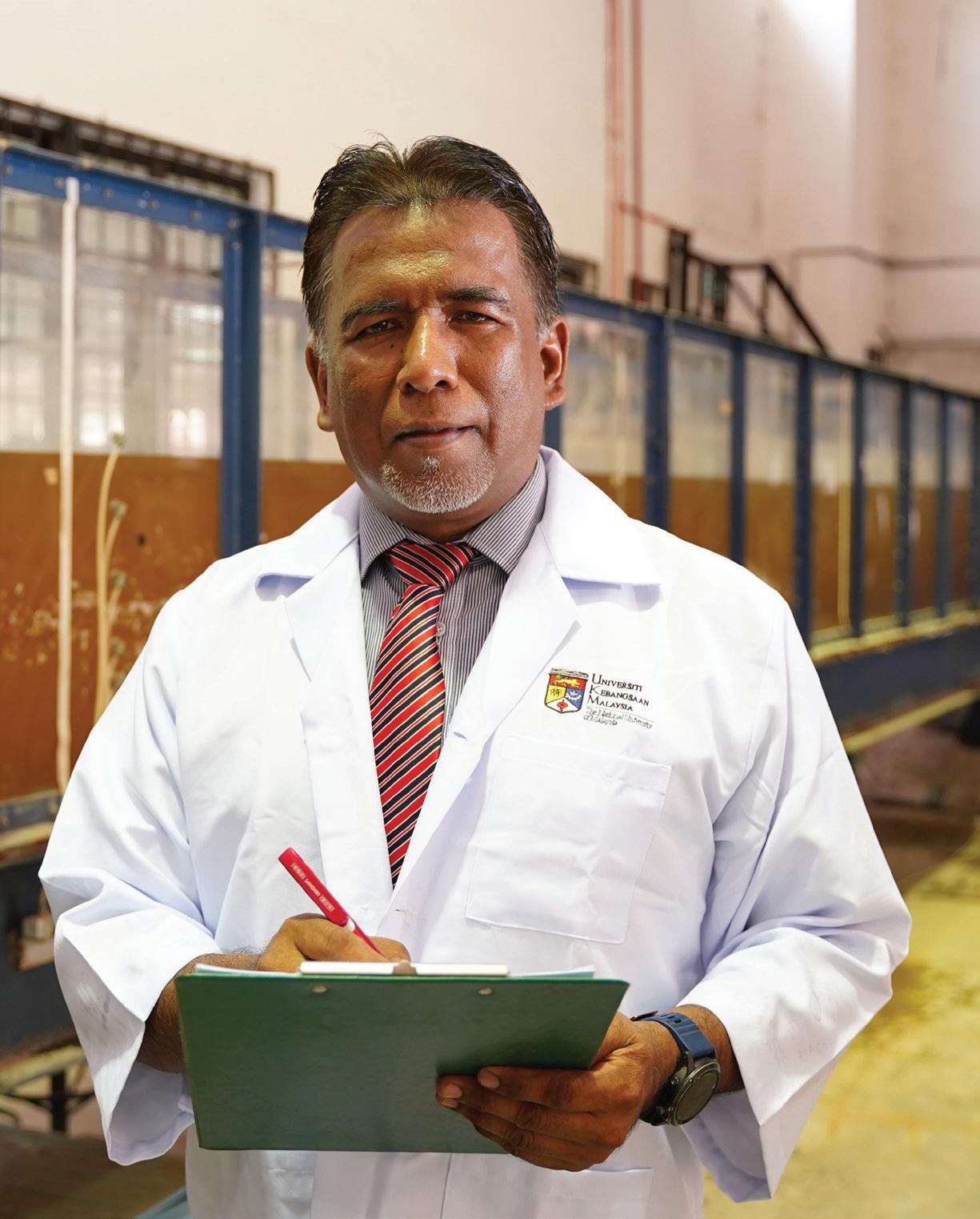
Professor Dato’ Ir Ts Dr Othman A Karim FASc is an expert in maritime civil engineering, specialising in coastal and hydraulics engineering. His expertise is often sought for the development of coastal reclamation guidelines and projects. He is actively involved in teaching, research, and development in science, technology, and innovation, specialising in coastal engineering. With 75 published journal articles, an H-index of 22, and 2,594 citations, his research speaks volumes, marking him as a key contributor to his field.
He has an outstanding record both as an academician and administrator at UKM. He has been among the pioneers at the Department of Civil Engineering UKM since 1986 and has been responsible for setting up civil solid engineering programmes at undergraduate and postgraduate levels. He is among the Malaysian experts appointed in an International Law of the Sea (ITLOS) Case concerning Singapore’s Land Reclamation in and around the Straits of Johor.
Professor Dato’ Ir Ts Dr Othman A Karim FASc
Faculty of Engineering and Built Environment Universiti Kebangsaan Malaysia (UKM)
He has also contributed significantly as a team leader and coastal expert in conducting many environmental impact assessments (EIAs) for big projects and led a team in producing guidelines for the Department of Environment (DOE), Department of Irrigation and Drainage (DID), and Jabatan Perancangan Bandar dan Desa (JPBD).
Professor Dato’ Ir Ts Dr Othman has received prestigious awards such as the Anugerah Inovasi Pendidikan (2012), Anugerah Penyelidikan (2012), MyRA – Anugerah Kecemerlangan MyRA Prestasi (2021), Anugerah Pingat Gangsa INOVASI (2022) and Tokoh Koperasi Negeri Selangor (2022).
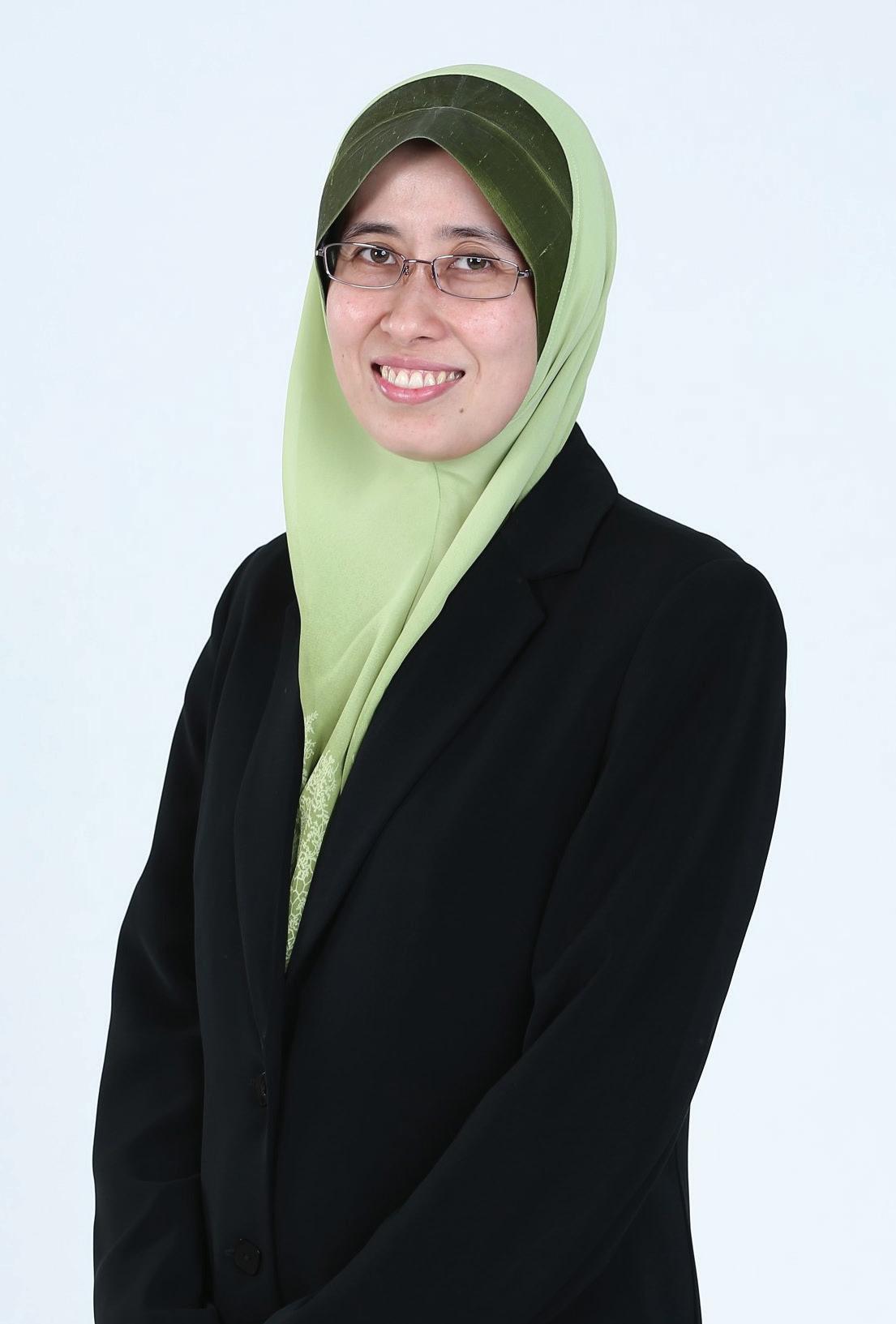
Professor Ir Ts Dr Sharifah Rafidah Wan Alwi FASc
Faculty of Chemical and Energy Engineering
Universiti Teknologi Malaysia (UTM)
Professor Ir Ts Dr Sharifah Rafidah Wan Alwi FASc is an expert in resource conservation, specifically on the minimisation and optimisation of energy, water, and resources. She has assisted and trained companies to reduce energy and emissions, as well as commercialised software and solutions. Her research influence is profound and far-reaching with an H-index of 48 and an impressive 8,670 citations.
She led UTM-PROSPECT as its director for ten years (2011-2021) to become a well-known global process systems engineering centre via international and national collaborations. She and her team founded the UTM Spin-off Company Optimal Systems Engineering (OPTIMISE) in 2014 to translate their IPs into products and solutions that benefit the industries. Their signature product, eSMART, a realtime smart energy system, was awarded the Superb Teraju and Platcom HIPP2 Grant to advance it to market.
She chaired the PSSE 2016, co-chaired the PRES 2015, and was appointed Chairperson of the Young Engineer Group by the Institution of Chemical Engineers (IChemE) to help groom more young engineers to excel in their careers. As a Young Scientists Network (YSN)-ASM member, she chaired the YSN-ASM Science Leadership in 2021 and successfully organised the Chrysalis Award to cultivate future leaders.
Professor Sharifah has also actively contributed through local and global professional societies such as the Institute of Engineers Malaysia (IEM) and ChemE.
Professor Dr Wong Shaw Voon FASc
Chairman
Malaysian Institute of Road Safety Research (MIROS)
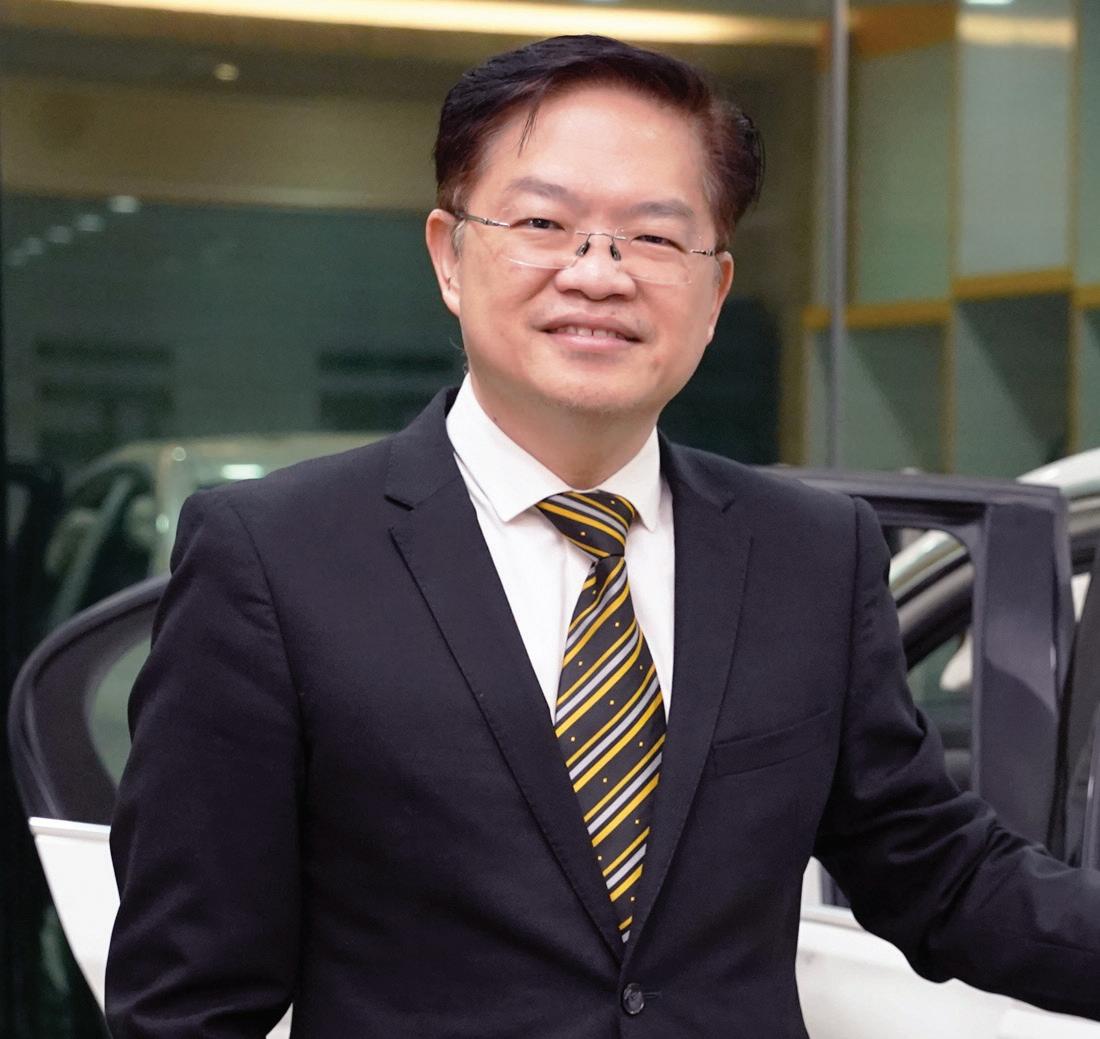
Professor Dr Wong Shaw Voon FASc is an expert in traffic collision analysis, road safety management and vehicle safety. He is often sought as an expert in road crash investigations, having analysed over 450 traffic collisions and provided expert opinions in more than 120 cases at various Malaysian and foreign courts. He has driven the drafting, deliberation, and enactment of the Malaysian Institute of Road Safety Research Act 2012 by the Parliament of Malaysia. His expertise has earned him prominent international roles such as, among others, Special Advisor to the Minister of Transport and Communications of Myanmar and Consultant to the Government of Myanmar funded by the Suu Foundation, one of the 12 road safety experts in the Commonwealth Road Safety Initiatives.
The United Nations (UN) recognised Professor Wong’s expertise by appointing him to the steering committee of the UN Road Safety Fund, representing the Research and Academia community. He also led the UN expert panel on road safety, involved in the appraisal to over 80 project proposals from various UN organisations around the world, as well as provided consultations to the UNRSF secretariat on
impactful strategies and approaches in the revision of the funding criteria, policies, operations and business plans. He had also served in the High-Level Panel Road Safety Expert of the Federation of International Automobile and to the UN Secretary General Special Envoy on road safety.
One notable achievement as an academician is that Professor Wong is the only representative from Asia to be appointed as a member of the Academic Expert Group convened by the Swedish Transport Administration since 2019. His views and recommendations were deliberated at the 3rd Global Ministerial Conference on Road Safety 2020, which led to the Stockholm Declaration on Road Safety 2020 endorsed by the UN General Assembly. He was reappointed as a member of the group in 2024 to continue working towards producing another report to be deliberated at the 4th Global Ministerial Conference on Road Safety in 2025. He has since produced over 500 publications, nine patents, an H-index of 32, and 2,759 citations, marking him a prolific and influential figure in his field.
Professor Ts Dr Norita Md Norwawi FASc is an expert in AI with a specific focus on AI ethics and responsible use. Her research interests include AI, machine learning, and data science. She has published over 100 papers in esteemed journals and conferences, with an H-index of 20 and 1,416 citations.
Professor Norita has actively engaged in the field of AI ethics. In 2021, she represented Malaysia as a state member at the UNESCO intergovernmental meeting on policy recommendations for AI ethics. She played a pivotal role on the Technical Evaluation Committee for Malaysia’s National AI Roadmap 2020-2021. In 2024, her expertise earned her a prestigious appointment as a visiting scholar at Oxford University’s Institute of Ethics on AI.
Beyond her academic contributions, Professor Norita has made commendable contributions to various community initiatives. These include serving as university representative for the Academic2Gaza Visit in Palestine in 2013, committee membership for Malaysia Global Outreach - MyCommunity Cluster from 2014 to 2016, participation in the Leadership Training Community Program in Turkey, and advisor for the Global Islamic Student Outreach Program and Humanitarian Program across multiple countries from 2012 to 2019. These community engagements underscore her commitment to making a positive impact beyond the academic realm.
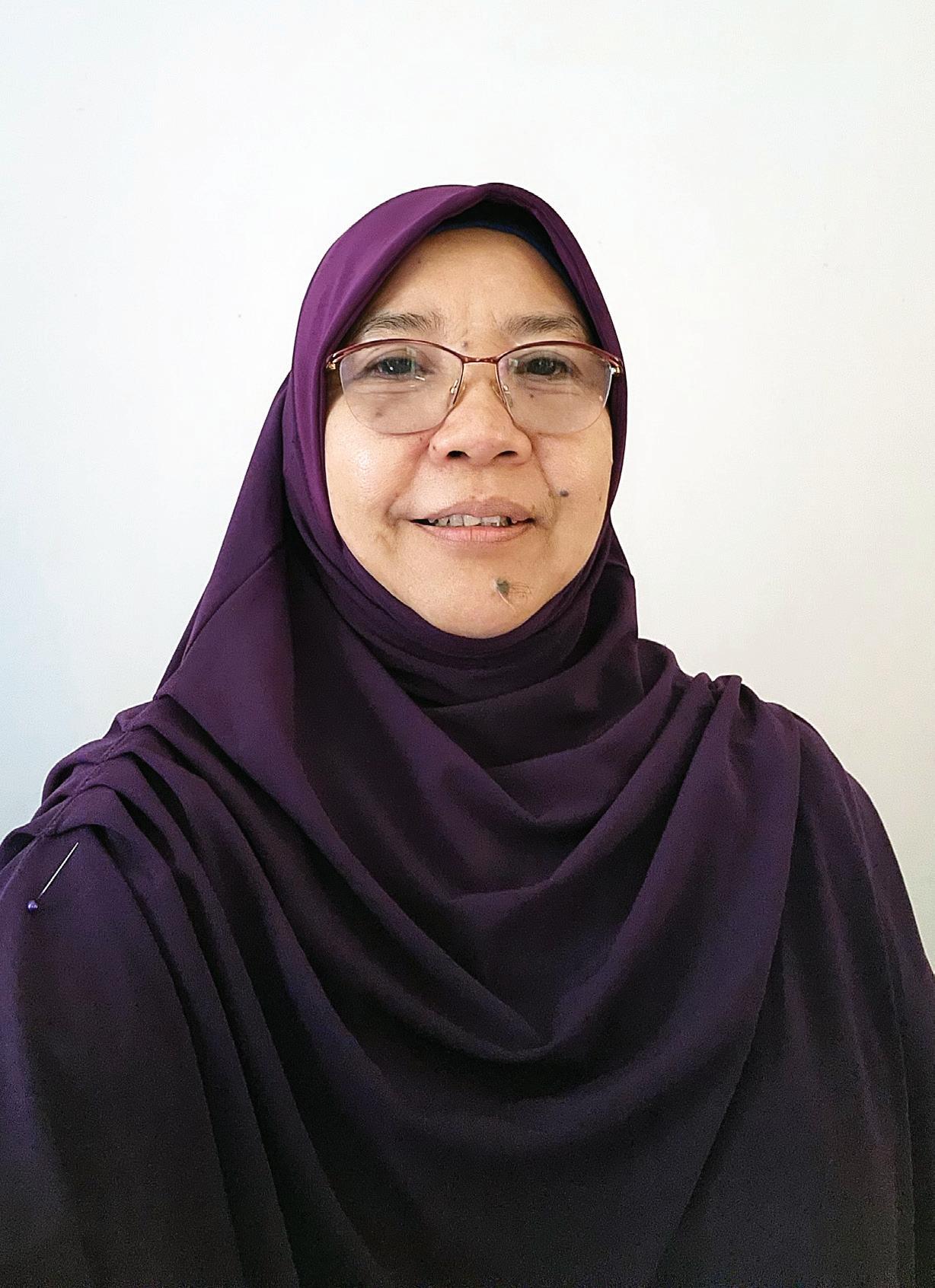
Professor Ts Dr Norita Md Norwawi FASc
Faculty of Science and Technology Universiti Sains Islam Malaysia (USIM)
Professor Ir Dr Sim Kok Swee FASc
Faculty of Engineering and Technology
Multimedia University (MMU)

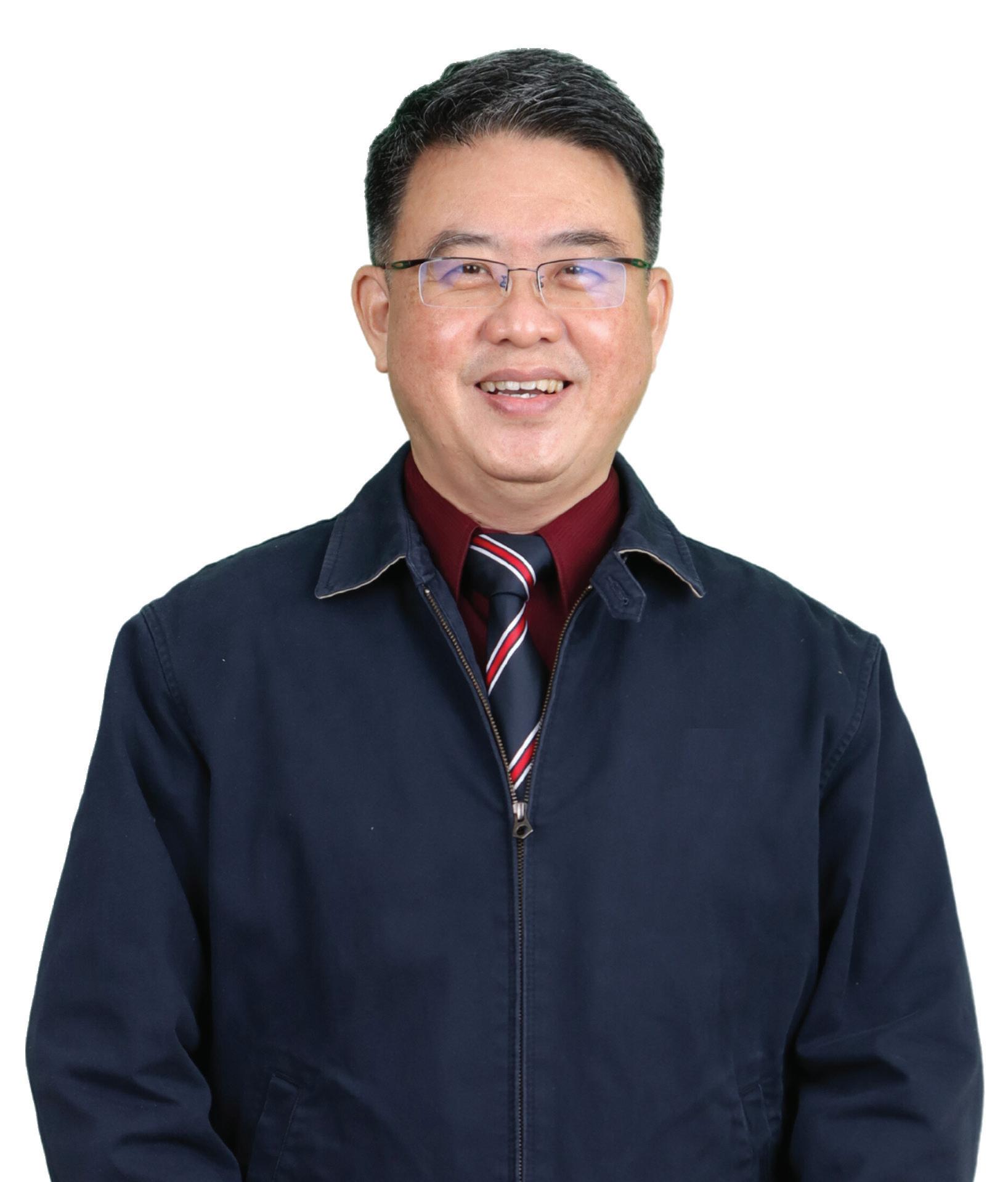
Professor Ir Dr Sim Kok Swee FASc is an expert in signal and image processing. He has made significant R&D contributions to information technology and computer sciences globally. He has filed 19 patents, secured 85 copyrights, and received numerous awards. His H-index is 24, with 3,285 citations.
His notable works include a novel single-image signal-to-noise estimation technique in an electron microscope that enables real-time sample imaging without the risk of sample carbonisation. His innovations have resulted in a novel method for early detection of brain infarct. Furthermore, Professor Sim has developed an innovative software-based breast cancer detection technique, namely dynamic contrast-enhanced magnetic resonance imaging (DCE-MRI).
In the medical field, his research on protein detection in latex gloves and an automated latex glove samplecutting machine have reduced testing times from a standard 8-hour duration to only 30 minutes.
Professor Sim is also actively involved in professional bodies such as the Institution of Engineers Malaysia (IEM) and the Engineering Accreditation Council (EAC) and is the Fellow of both the Institution of Engineers, Malaysia (IEM), and Institution of Engineering & Technology (IET). In 2016 and 2017, he chaired the Organising Committee of the International Conference on Robotics, Automation, and Sciences (IJORAS). He is now the Chief Editor for International Journal on Robotics, Automation and Sciences (IJORAS), Multimedia University.
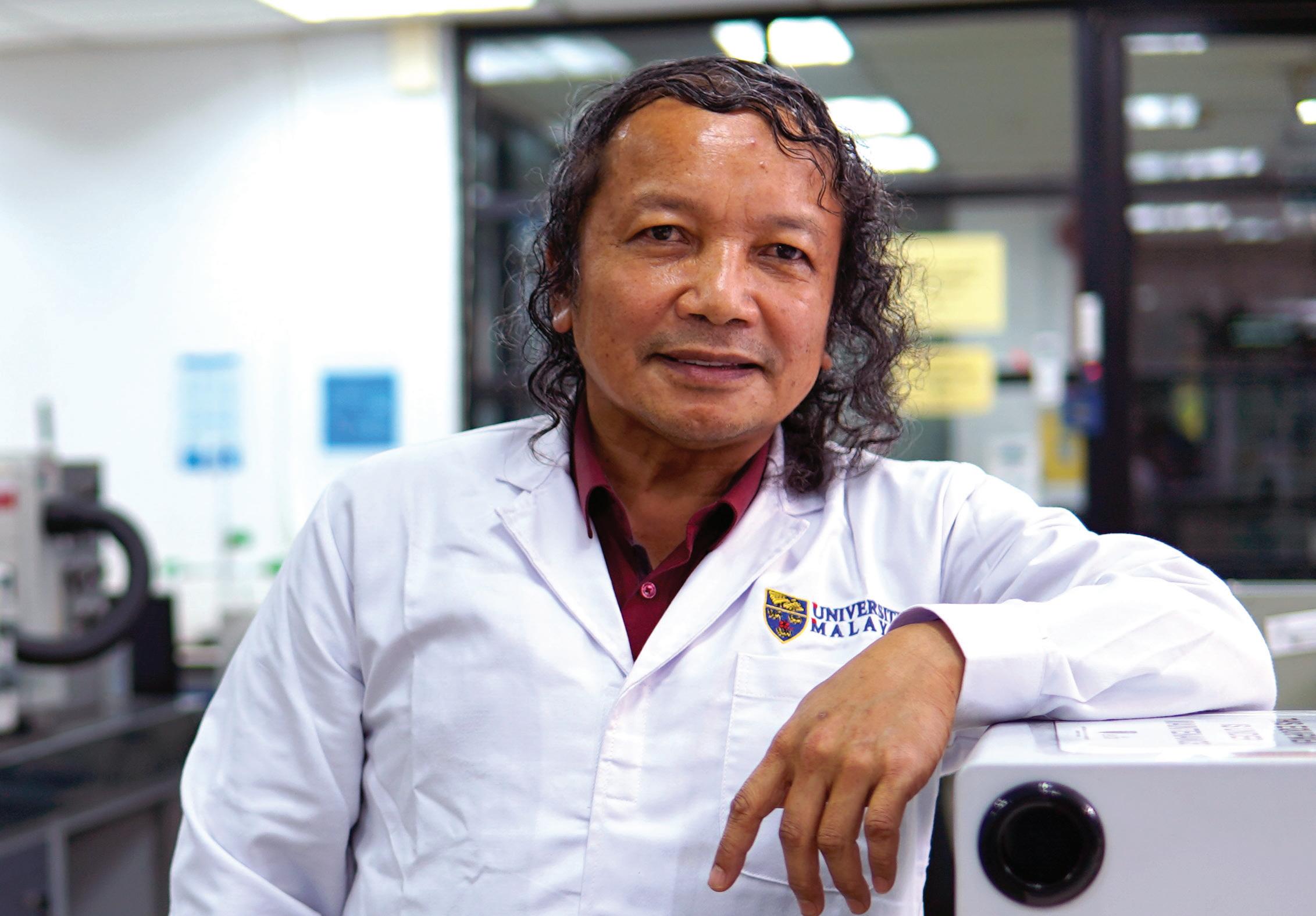
Professor Dr Mohd Rafie Johan FASc
Director
Nanotechnology & Catalysis Research Center (NANOCAT)
Universiti Malaya (UM)
Professor Dr Mohd Rafie Johan FASc specialises in the field of nanotechnology. This encompasses the fields of physics, chemistry, materials science, and engineering. His research pursuits extend beyond fundamental exploration to translational applications, demonstrating a significant impact within the industry. His prolific publication record comprises over 350 ISI papers. His H-index is 50, with 10,473 citations. Additionally, he owned 12 intellectual property/patents and was recognised as one of the World’s Top 2% Scientists.
He was a PI for research projects with several leading industries mainly in CO 2 methanation, pilot plant iron oxide nanoparticles for magnetic gloves, and sodium borohydride. He had actively promoted the patent for product commercialisation, especially for a 7-in-1 DNA kit for halal food and iron oxide nanoparticles for medicine and agriculture.
Professor Rafie’s mentoring legacy is evident through the supervision of postgraduate students, including PhD and Master’s graduates. As the Director of the Nanotechnology and Catalysis Research Center at UM since 2017, he provides strategic direction to research initiatives.
Global impact is evident through his roles as a Visiting Scientist at the Department of Materials Science and Metallurgy, University of Cambridge, in 2010, and a Visiting Scholar at the Abdus Salam International Center of Theoretical Physics (ICTP), Trieste, Italy, in 2021.
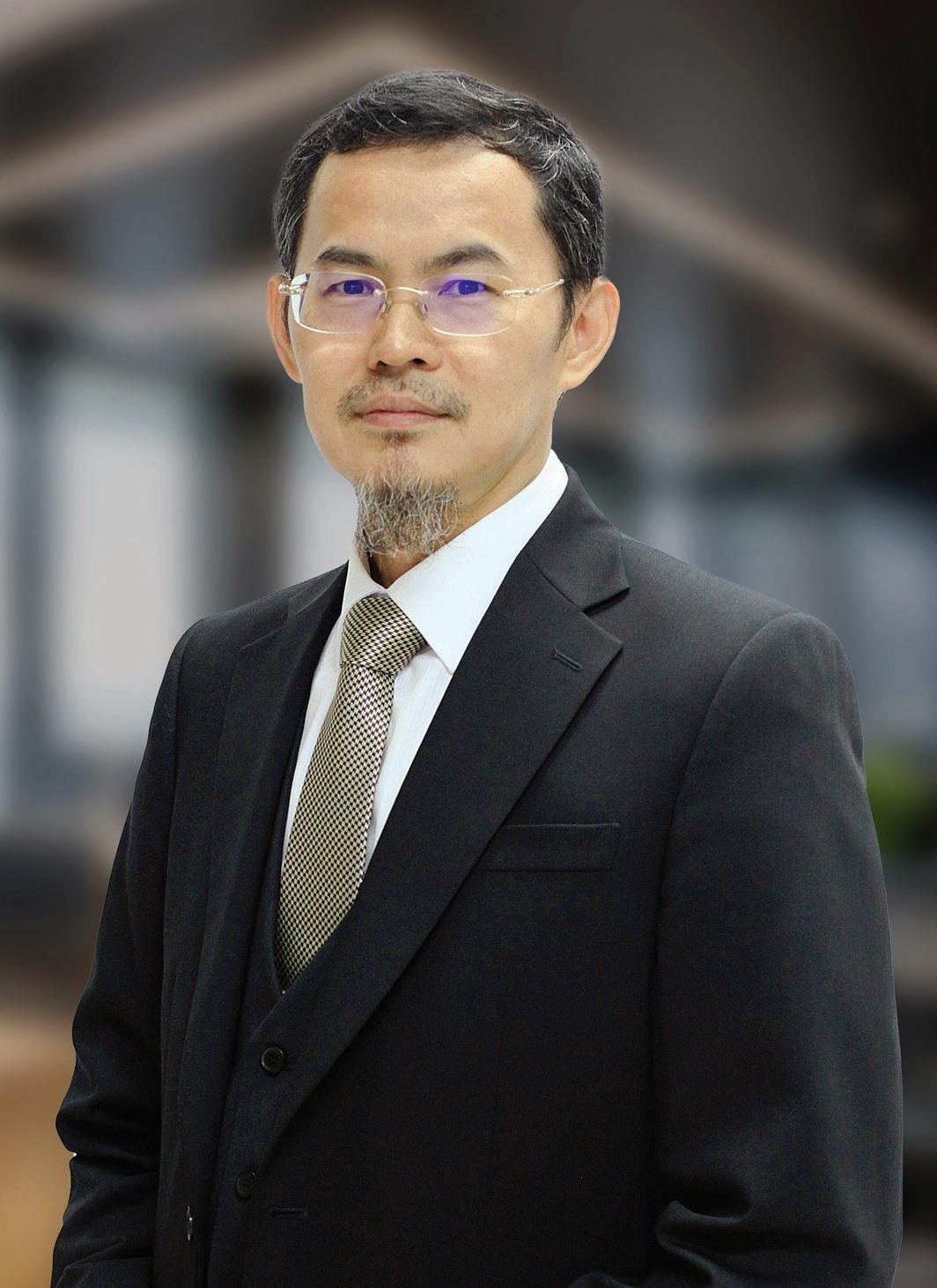
Faculty of Science
Universiti Teknologi Malaysia (UTM)
Professor Ts Dr Muhammad Hisyam Lee FASc is a distinguished statistician specialising in control charts, forecasting, and statistical modelling. His knowledge extends across foundational statistics, engineering statistics, experimental design, statistical process control, multivariate statistical analysis, generalised linear models, and research methodology. His H-index is 36, with 4,356 citations, highlighting his exceptional contributions to the field.
He possesses analytics, data management, academic programme accreditation, and institutional auditing skills and is competent in statistical programming languages such as R, SAS, and Python. His expertise is often sought by MOHE, MQA, and the Ministry of Youth and Sports. He has contributed to numerous action research and consultancies such as analysis on graduate employability, MyMoheS system effectiveness, and the Industry Revolution 4.0 Readiness.
With an illustrious teaching career spanning 30 years, Professor Hisyam has imparted his expertise in various undergraduate and postgraduate statistics courses. He has played a pivotal role in shaping award-winning individuals, with many receiving prestigious accolades like the Pro-Chancellor and Postgraduate Best Student awards.
Professor Ts Dr Muhammad Hisyam Lee FASc
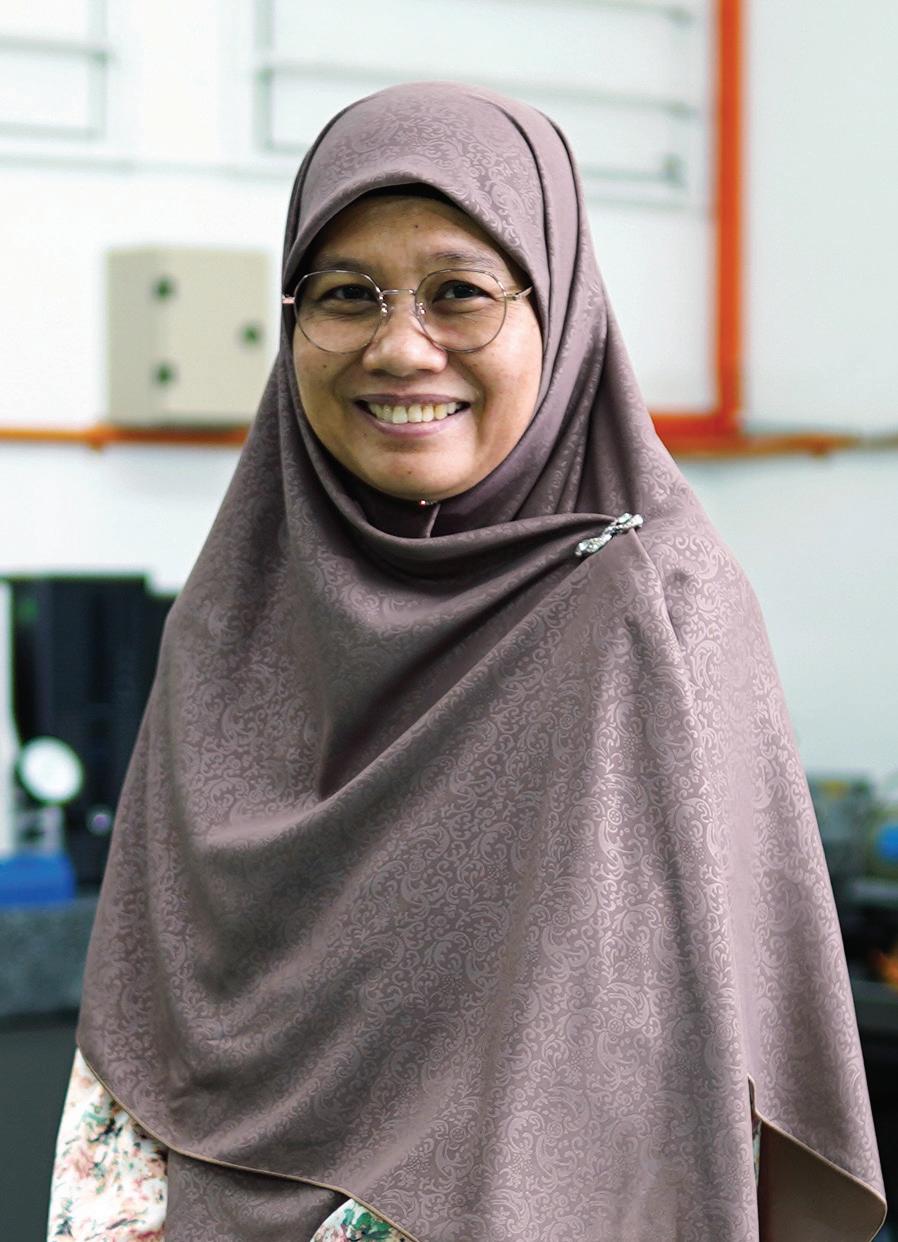
Professor Dr Wan Haliza Abd Majid FASc
Head of Low Dimensional Materials Research Center (LDMRC) Universiti Malaya (UM)
Professor Dr Wan Haliza Abd Majid FASc specialises in solid-state physics, focusing on low-dimensional materials. She has contributed to the advancement of knowledge in the field of electronic transport theory, mechanism, materials for Organic Light Emitting Diodes (OLEDs) and Vertical Organic Field Effect transistors (VOFET), and the development of new materials in composite and polymer thin films for the application in pyroelectric sensors, ferroelectric and piezoelectric devices. With an H-index of 27 and 6,876 citations, her research commands significant respect and recognition in the academic world.
Internationally, she has been one of the panel reviewers for the Slovak Research and Development Agency since 2016 and was awarded the Certificate of International Peer Review Expert by the agency in 2016. In recognition of her significant contributions to the international and regional network, she was selected as a nominator for the Nobel Prize in Physics for the year 2021 by the Royal Swedish Academy.
Her extensive involvement in various expert panels at both UM and national levels includes participation in panels such as the Long-Term Research Grant Scheme Distinguished Masters Trail (LRGSJSU) and the Fundamental Research Grant Scheme (FRGS). Her dedication to academia and knowledge-sharing is evident through her mentoring and coaching activities.
Since 2015, she has been invited to speak at programmes organised by the Centre for Academic Improvement and Leadership Development (ADEC) and has actively contributed to coaching and training postgraduate students in their Master’s and PhD journeys.
Professor Dr Nortina Shahrizaila FASc is a Professor of Neurology at Universiti Malaya and Senior Consultant Neurologist at Universiti Malaya Medical Centre. She is recognised for her leadership in neuromuscular disorders, specifically in Guillain-Barré syndrome (GBS) and Amyotrophic Lateral Sclerosis (ALS), as well as in peripheral clinical neurophysiology. Her scholarly impact extends across both fields boasting over 110 publications, a H-index of 31, with 5,531 citations to date.
She holds several international leadership positions and is the current Secretary of the International Federation of Clinical Neurophysiology (IFCN), the second woman to hold an officer position in the organisation’s 75-year history. She is also the President-Elect of the Pan-Asian Consortium for Treatment and Research in ALS (PACTALS) and recently served as Scientific Programme Committee CoChair of the 2024 Peripheral Nerve Society (PNS) meeting held in Montreal, Canada.
She is renowned for her expertise in GBS which led to an invitation by The Lancet to lead a review article on GBS - a remarkable achievement for a Malaysian in the field of medicine. She also leads the clinical and research group focused on ALS, establishing the first dedicated multidisciplinary ALS clinic in the country. The group has also pioneered clinical and genetic ALS studies in the Southeast Asian region, including elucidating mutations in common ALS genes in a multi-ethnic cohort of patients.
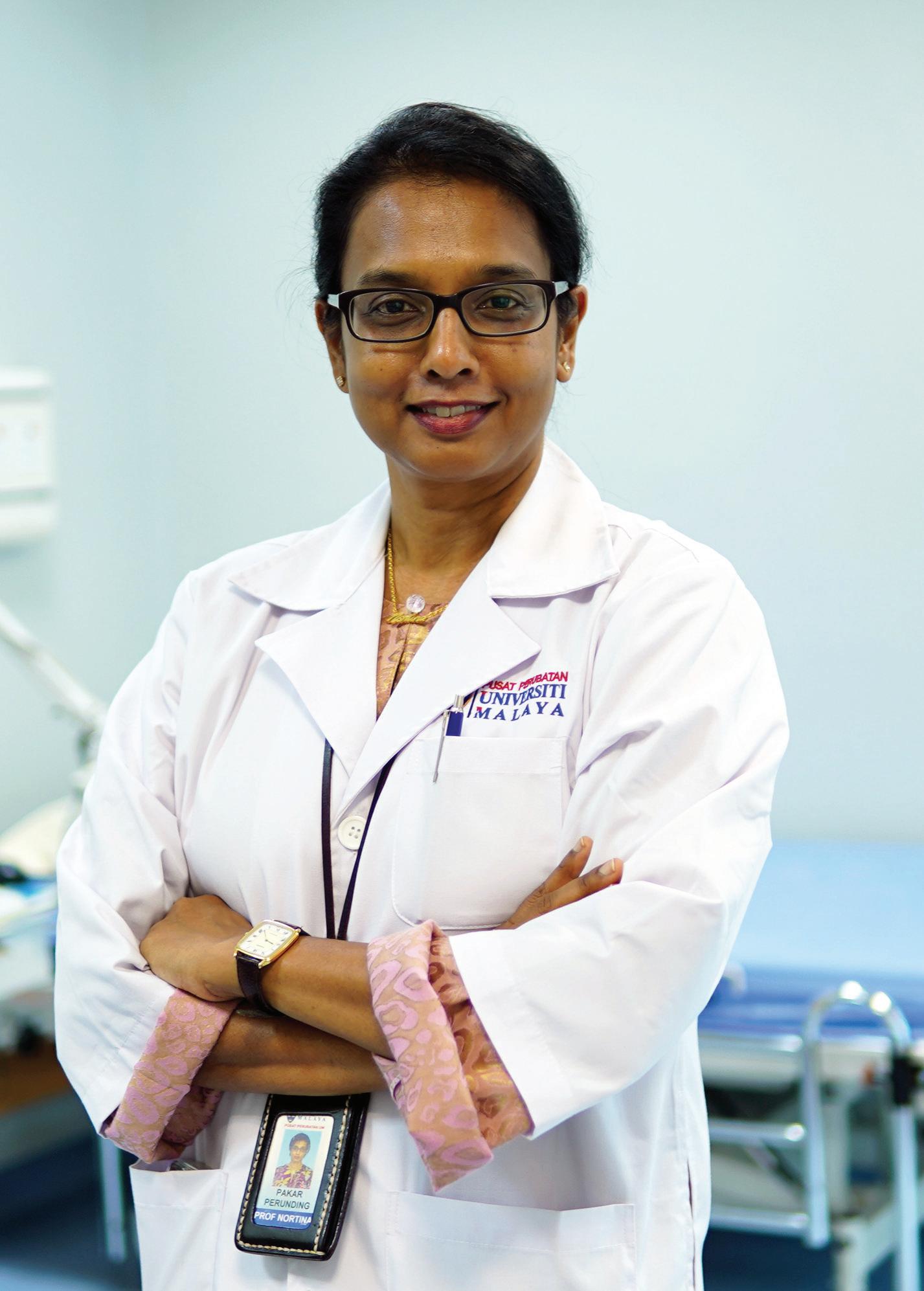
Professor Dr Nortina Shahrizaila FASc
Faculty of Medicine Universiti Malaya (UM)
Professor Dr Poh Bee Koon FASc is a distinguished nutritionist, specialising in childhood and adolescent nutrition, obesity, and public health. Her role in shaping national policies and guidelines related to nutrition has been instrumental in promoting better health outcomes for the Malaysian population.
Her involvement in key government committees, including the Ministry of Health Malaysia’s Allied Health Profession Act (Nutrition Profession Committee) and the National Coordinating Committee on Food and Nutrition, highlights her commitment to fostering impactful change nationally. She has made substantial contributions to public health, particularly in shaping the Recommended Nutrient Intakes and Malaysian Dietary Guidelines.
She has also led significant projects, including the Southeast Asian Nutrition Surveys (SEANUTS) and the ToyBox Study Malaysia intervention to reduce obesity rates among preschoolers. In 2006, the United Nations’ International Atomic Energy Agency awarded her a Fellowship under the IAEA Nobel Peace Prize Fund Schools in Nutrition.
Professor Poh’s commitment to advancing the field of nutrition is reflected in her dedication to disseminating knowledge and best practices. Her leadership extends to numerous international projects, where she has successfully secured funding from esteemed organisations, such as the United Kingdom Medical Research Council, and the International Development Research Centre (IDRC) Canada. She has authored over 150 journal articles, achieved an H-index of 46 with 22,712 citations, and is currently the Editor-inChief of the Malaysian Journal of Nutrition.
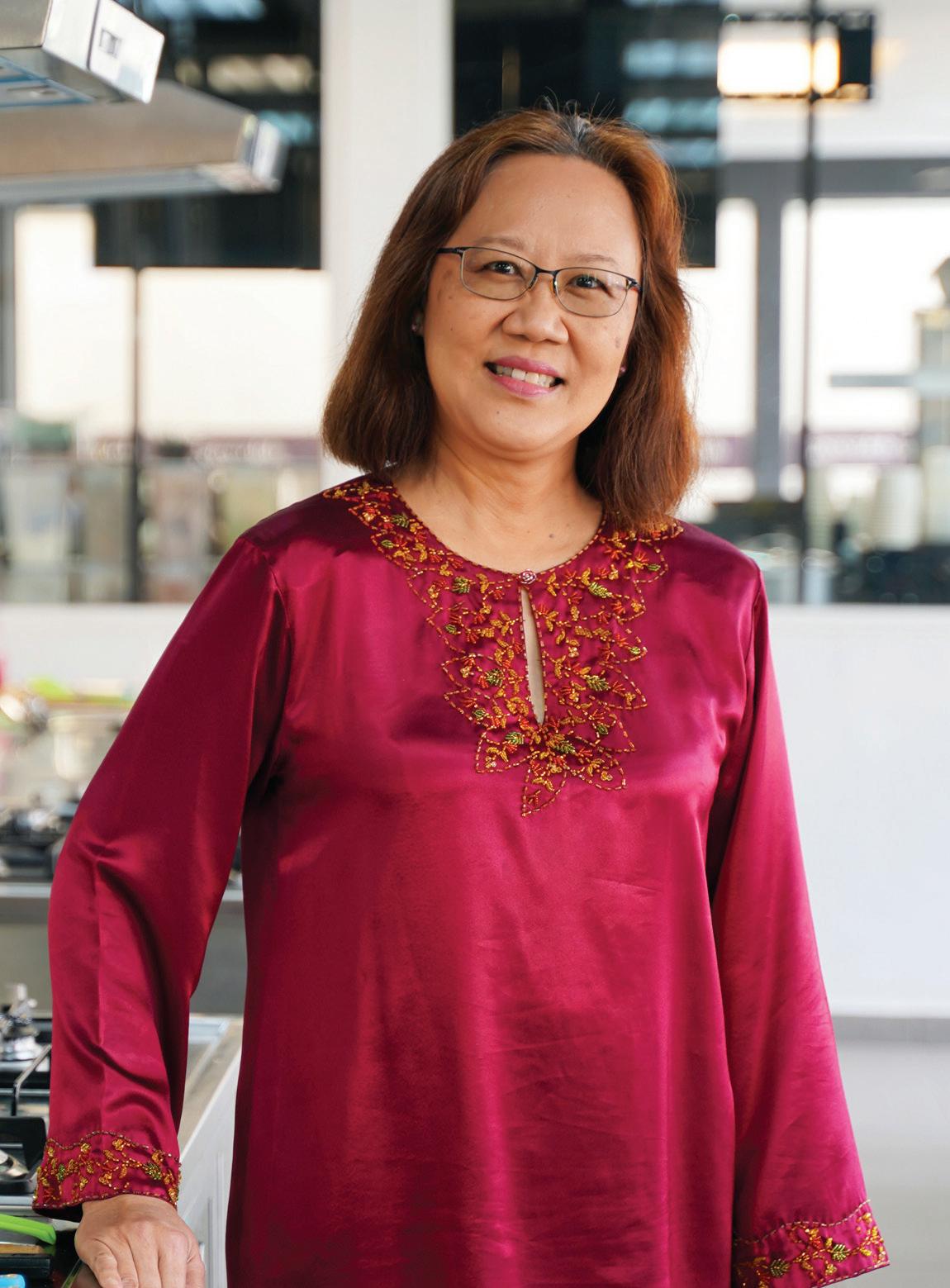
Professor Dr Poh Bee Koon FASc
Chairperson
Centre for Community Health Studies (ReaCH)
Faculty of Health Sciences Universiti Kebangsaan Malaysia (UKM)
Professor Dr Tilakavati Karupaiah FASc
Faculty of Health and Medical Sciences
Taylor’s University
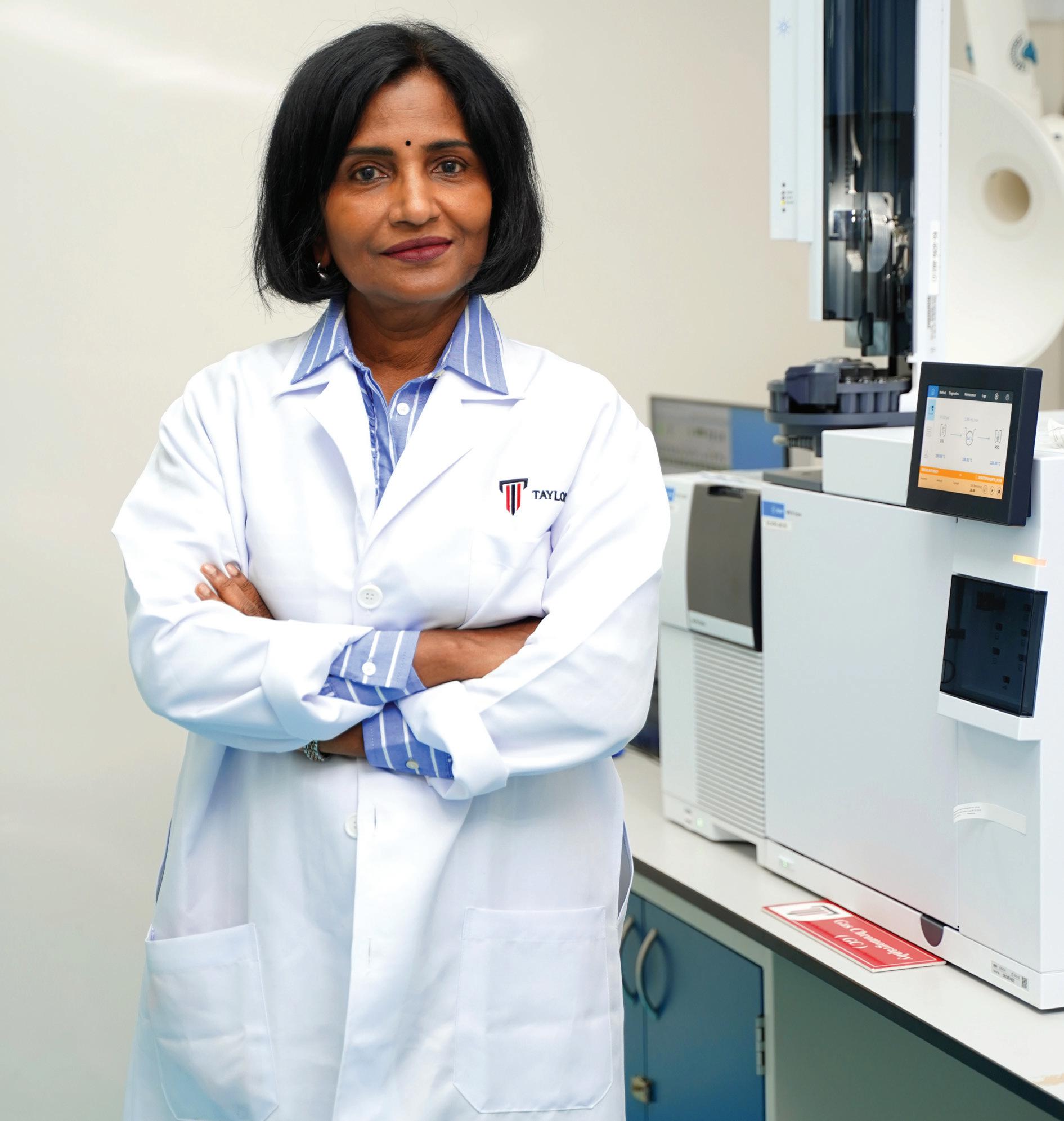
Professor Dr Tilakavati Karupaiah FASc is a dietitian by training, specialises in cardiometabolic and renal nutrition, and seeks preventative action through food environment and policy research. Her extensive expertise is showcased through her leadership in international and national level research programmes on developing the management of dietary health in cardiometabolic conditions and renal diseases, with a keen emphasis on policy evidence and translation. With an H-index of 28 and 3,648 citations, her research is making a lasting impact and solidifying her reputation in the community.
She has developed a cutting-edge mobile app calculator designed to precisely calibrate dietary phosphate and binder doses, specifically tailored for managing and preventing hyperphosphatemia in chronic kidney disease. Professor Tilakavati’s commitment to advancing global expertise in renal nutrition is evident in her role as the driving force behind the Global Renal Internet Course for Dietitians (GRID), which aims to address the global shortage
of expertise in renal dietitians by bringing together leading 5-star faculties. Given her experience of the causative factors in non-communicable diseases in Malaysia, she is now integrating skills in food environment analysis through undertaking capacity-building projects with the INFORMAS (International Network for Food and Obesity/non-communicable diseases Research, Monitoring and Action Support). Working in partnership with INFORMAS, she is collaborating with Asian countries to tackle unhealthy food marketing to children and adolescents.
Adding to her illustrious achievements, she made history as the first Asian recipient of the United States National Kidney Foundation-Council on Renal Nutrition’s Joel D. Kopple International Award in 2017. Professor Dr Tilakavati is currently serving on the Expert Advisory Committee of the Bloomberg Global Food Research Program, University of North Carolina at Chapel Hill.
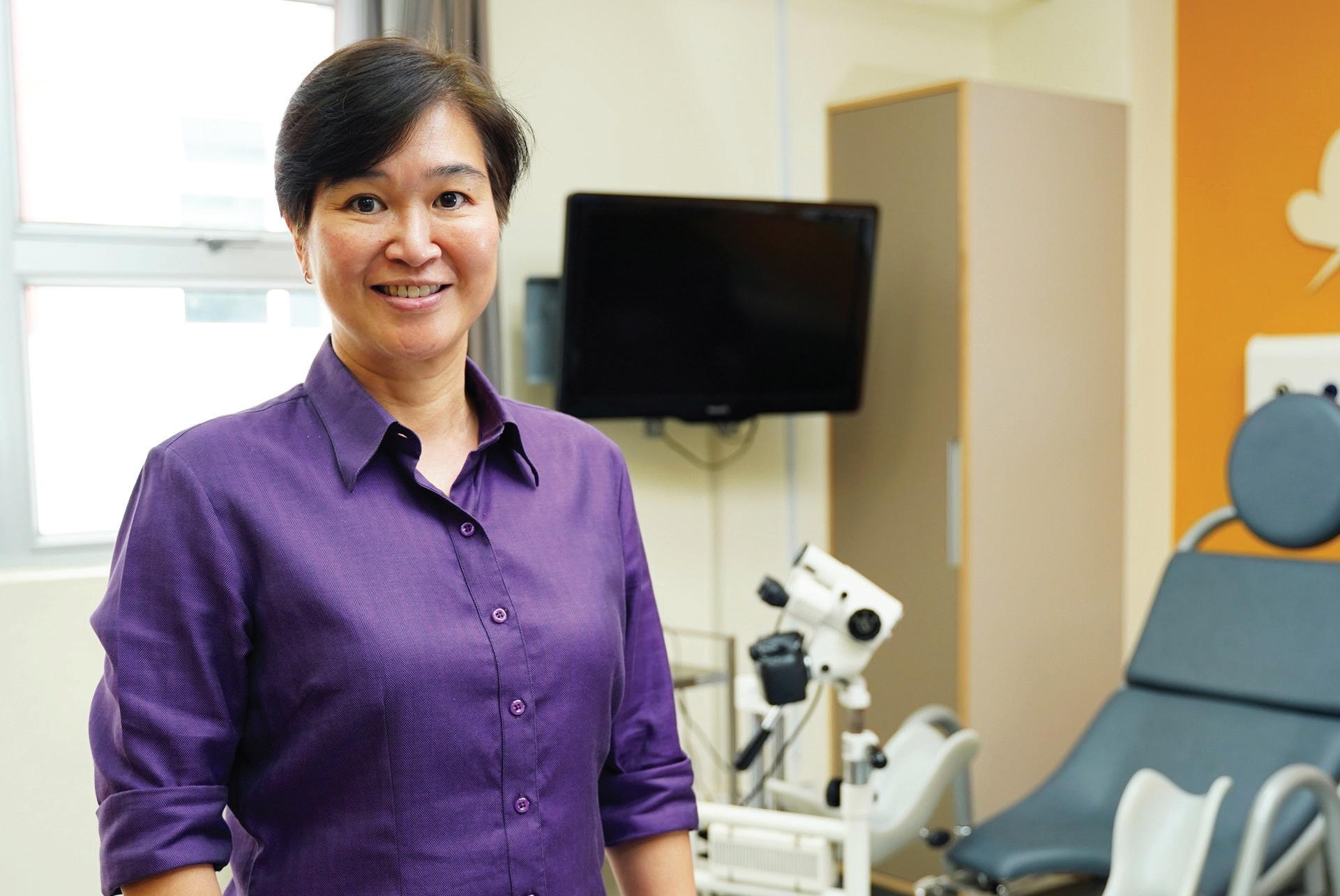
Professor Dr Woo Yin Ling FASc
Faculty of Medicine
Universiti Malaya (UM)
Professor Dr Woo Yin Ling FASc is a distinguished expert in gynaecological oncology. Her publications consistently reflect her specialised interest in this field, particularly in cervical cancer. Her H-index is 38, with 5,106 citations.
Her scientific impact is underscored by her contributions to implementation science, evident in both the ROSE Project and the MAGIC Study (Mainstreaming Genetic Counselling for Ovarian Cancer Patients). She established the ROSE Foundation to eliminate cervical cancer in Malaysia through early detection by expanding HPV selftesting and linkage to care. It has gained local and international acknowledgement, like the World Health Organization (WHO) and the National Cancer Institute.
Currently, Professor Woo is the Malaysian representative for the Asia-Oceania Research Organisation in Genital Infection and Neoplasia (AOGIN) and a member of the Asia-Pacific Economic Consortium (APEC) and Commonwealth Cervical Cancer Working Group. She plays a key leadership role
in cervical cancer elimination, serving as a committee member of the Malaysian National Taskforce for Cervical Cancer Elimination (2022-present), board member of the International Papillomavirus society and the WHO living guideline development expert.
She has also received numerous awards, including the Royal College of Obstetricians and Gynaecologists Gold Medal (2000) and the Cancer Research UK Gordon Hamilton Fairley Fellowship (2002), FIGO Women’s Award (2021) and the NIH Rachel Pearline Award Recipient (2023).
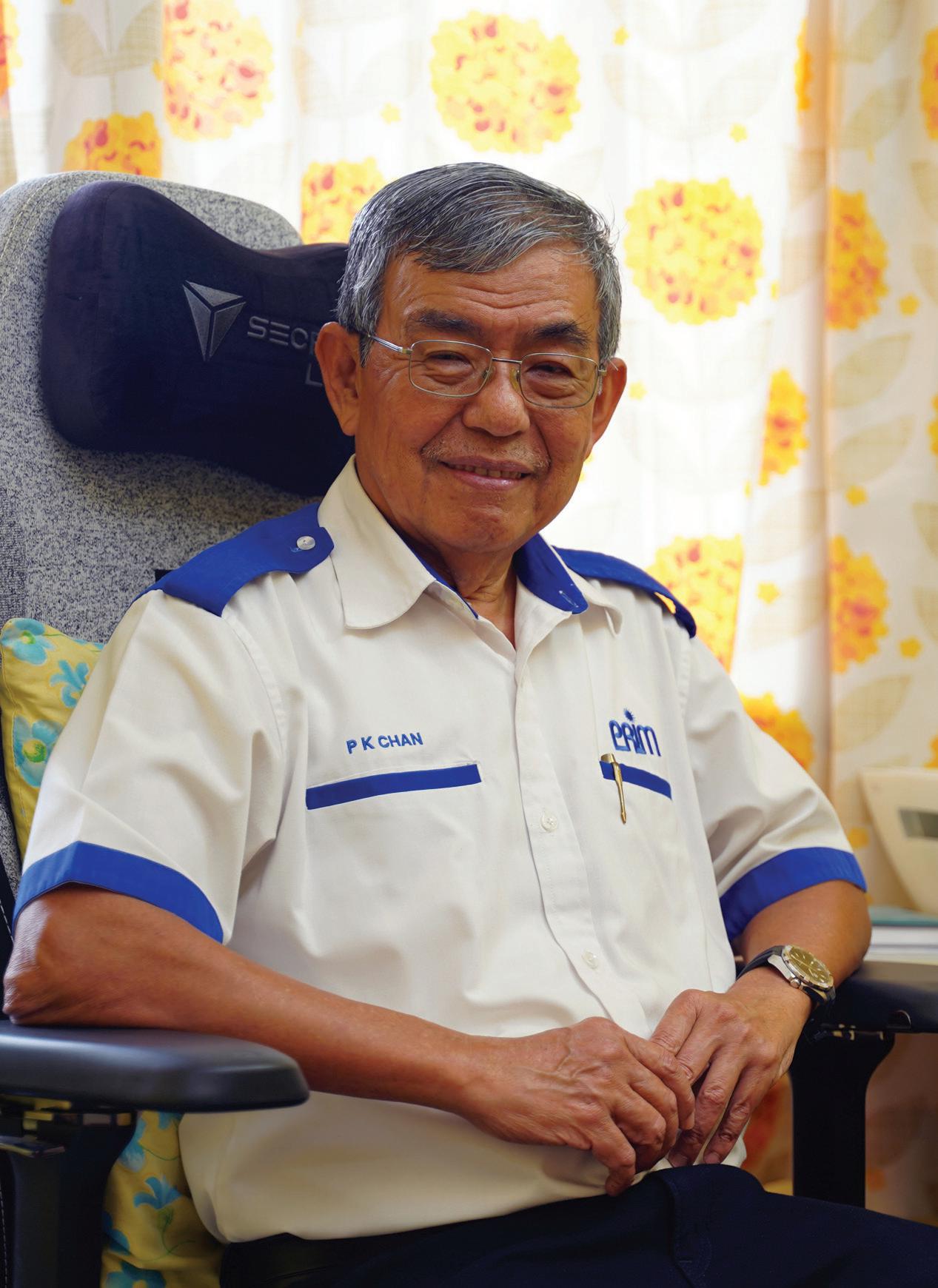
Mr Chan Pak Kuen FASc
Mr Chan Pak Kuen FASc specialises in mineral processing technology, particularly new rubber product development (downstream sector) and rubber-to-metal bonding. His impactful work extends to industrial training and capacity building, making him a key reference person for the rubber industry and a substantial contributor to standards development.
He had served LINATEX/WEIR Minerals Malaysia (WEIR GROUP PLC) for 42 years, last position being the Global Rubber Technical Consultant, until retirement. He was responsible for research and technology, industrial rubber compounding, and processing innovations and applications for the mineral processing sector, where he served nationally and internationally. With strong networks and networking skills, he was the President of the Plastics and Rubber Institute of Malaysia (PRIM) and has been a Fellow of PRIM since 1996.
He actively participates in national and international conferences, delivering keynotes, plenary sessions, and presentations. He holds accreditation as a trainer from the Human Resource Development Corporation from 2022 to 2025 and the Train the Trainer Certificate in 2021.
Mr Chan’s experience in industrial automation and industrial expertise is evident through his involvement in the National Standard Committee (NSC) for Malaysian Standards (MS), managed by the Department of Standards Malaysia (DSM) and the International Standard Organisation (ISO). In the realm of education, he is involved in upskilling and reskilling initiatives within the rubber industry, showcasing his commitment to continuous learning and development.
The Plastics & Rubber Institute Malaysia (PRIM)
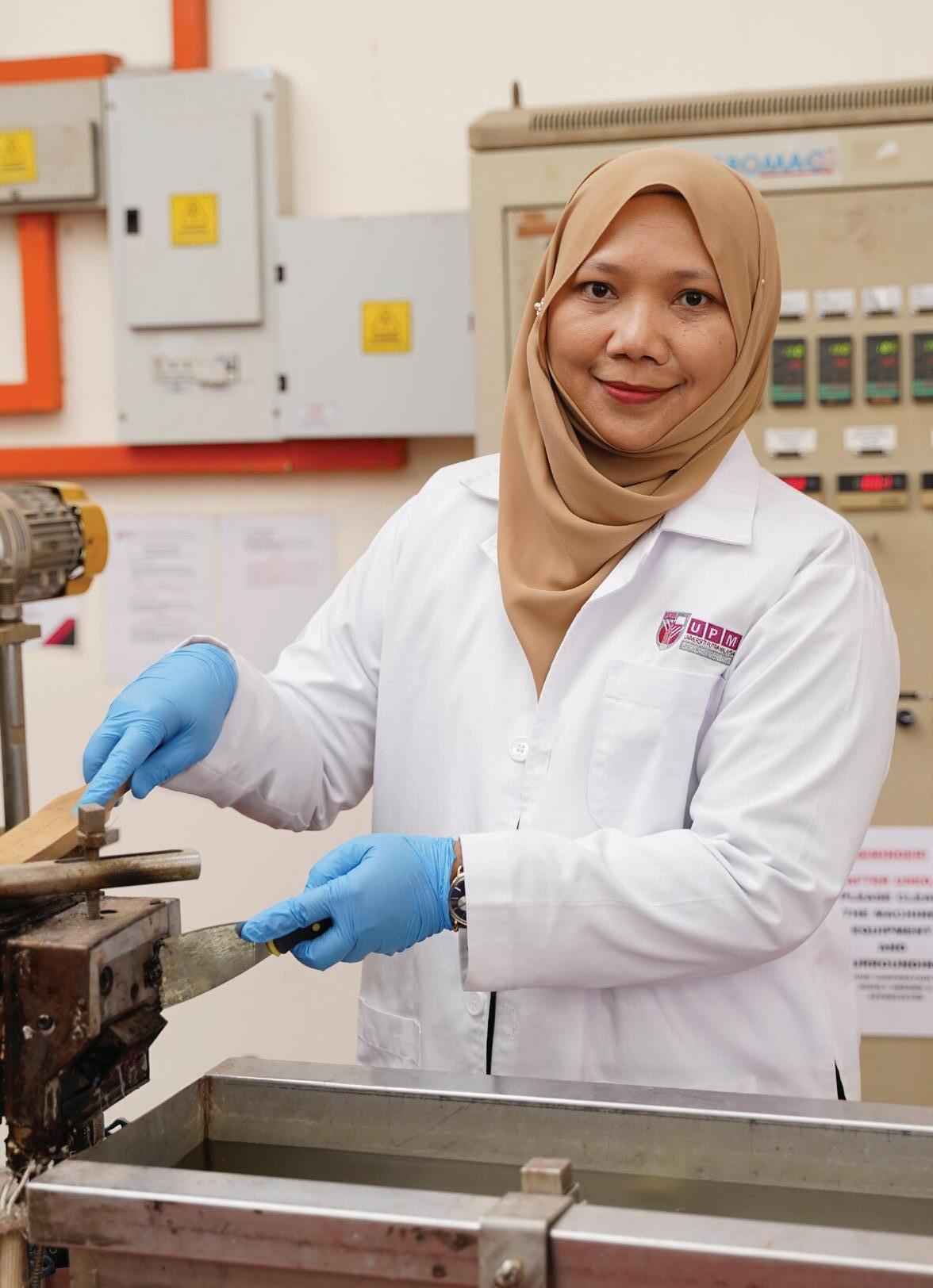
Professor Ir Ts Dr Khalina Abdan FASc
Director
Institute of Tropical and Forest Products (INTROP)
Universiti Putra Malaysia (UPM)
Professor Ir Ts Dr Khalina Abdan FASc specialises in biocomposite technology. Her significant contribution is transforming biomass into highvalue products, particularly promoting local biomass resources in various manufacturing industries. Her primary focus is collaborating with strategic partners to co-create high-quality goods production using biomass resources, thus promoting sustainable production and consumption, thereby accelerating economic growth. Her H-index stands at an impressive 71, with a remarkable 17,308 citations.
Her leadership at INTROP has contributed to supporting the Bamboo Industry Development Action Plan 2021-2030, and Kenaf Research & Development Initiatives, focusing on tropical wood and fibre niches to enhance the competitiveness of not only bamboo, oil palm, and kenaf fibres but also other native biomass. She has successfully spearheaded initiatives, including the proposal of a business canvas model for bamboo entrepreneurs and the implementation of strategic plans for a sustainable bamboo village landscape. She also played a pivotal role in developing the biomass woven textile to entrepreneurs in Kuala Terengganu, which led to a notable outcome in terms of the functionality and feasibility of biocomposite products for the maritime sectors.
Professor Khalina has also pursued exposing university laboratory resources for the pupils to explore and promote STEM education. As the chairman and founder of these programmes for three consecutive years, she has fostered STEM awareness among primary and secondary school children.
Dato’ Ng Tong Se also known as Dato’ Peter is an entrepreneur who has dedicated his career to community development through the provision of quality education. A computer scientist by training, he founded UCSI University in 1986 and prioritised capacity building, the creation of socio-economic value, and the optimisation of local expertise.
He served as UCSI’s founding vicechancellor until 2010. Under his leadership, UCSI quickly progressed to become the first private institution in Malaysia to introduce programmes in biotechnology, food science, nutrition, music, and aquatic science. Since then, he has led many initiatives on the development and assessment of strategies, frameworks, and policies for higher education excellence in Malaysia and the region.
Dato’ Peter currently holds the esteemed position of a council member at the Malaysian Qualifications Agency (MQA) and an advisor to the KSI Strategic Institute for the Asia Pacific and the Regional Centre of Expertise Education for Sustainable Development. He is often invited as a keynote speaker, panellist, or moderator to provide insights on issues in Malaysia and the region.
He has diversified UCSI Group’s portfolio, venturing into consulting, healthcare, hospitality, property, technology and automotive dealership. The UCSI Hospital–a state-of-the-art healthcare facility is being developed and is expected to turn Springhill and Port Dickson into a hub of healthcare, wellness, and education.
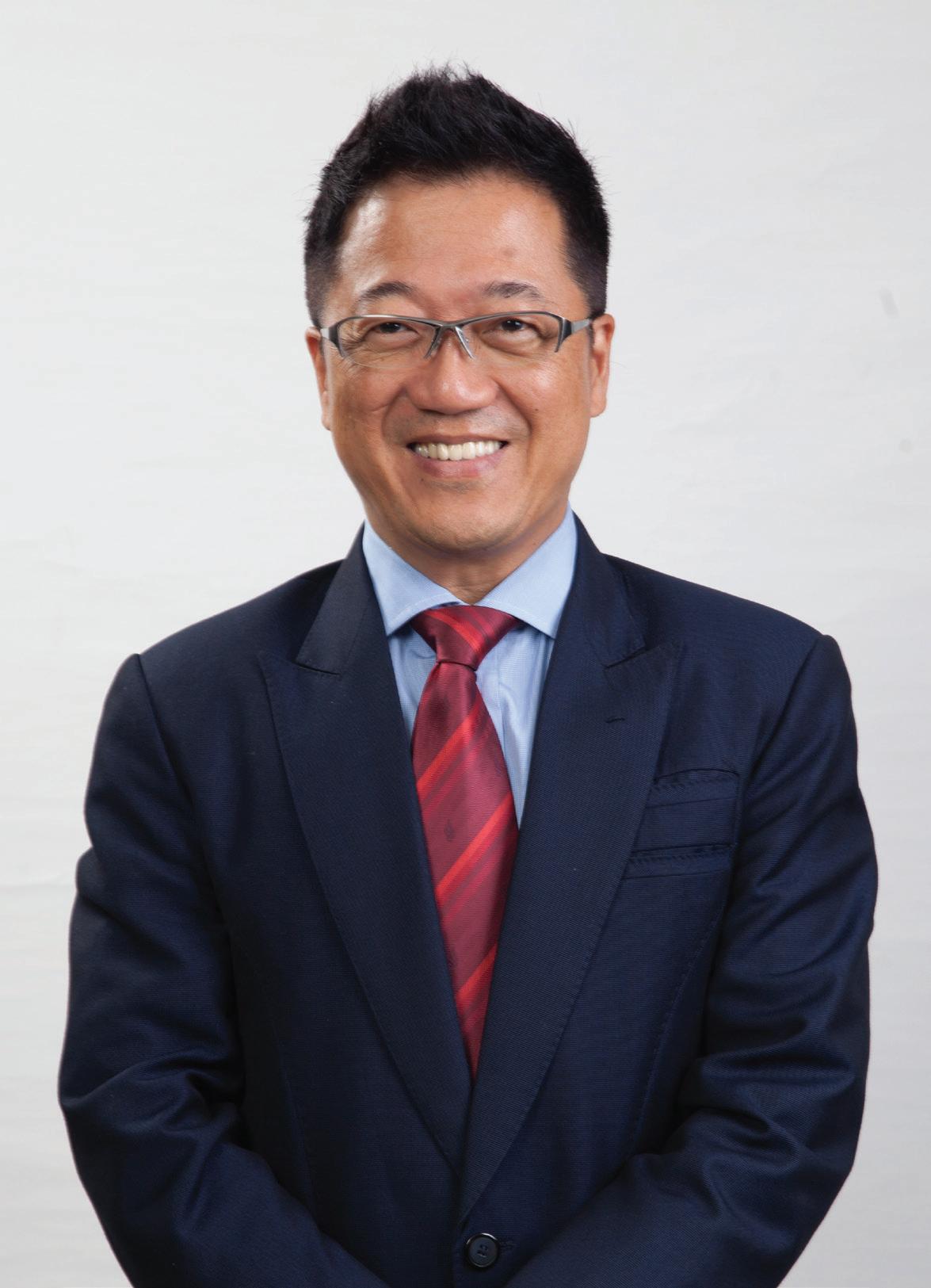
Dato’ Ng Tong Se FASc
Executive Chairman
UCSI Group
Ir Dr Selamat Aliman FASc is an industry luminary who has significantly contributed to the advancement of the natural resources sector. Proficient in technical, laws and regulations governing mineral resources in Malaysia, he has authored over 60 best practice reports and guidelines for sustainable mining and quarrying industry.
He is ranked the top 5% of peers in mining engineering and sustainable mineral resource development (MRD) in Malaysia. As a pioneer consulting engineer involved in mine development and operation projects, he is frequently sought after by governmental bodies and industry players for advice on sustainable development aspects of the industry. He plays a pivotal role as a leading consultant in developing SOP for NonRadioactive Rare Earth Elements (NR-REE) Mining in the State of Perak, a project under the Ministry of Natural Resource and Environmental Sustainability (NRES).
Being a consultant for the first and only legal ionadsorption clay (IAC) REE mining operation in Malaysia, he is considered an unparalleled expert in REE ISL mining operation using in-situ leaching (ISL) methods in the country. His numerous professional reports, lectures, and presentations have significantly enhanced the understanding of Environmental Impact Assessment (EIA) preparations, sustainable mineral resource planning, development and operations of the industry.
Dr Selamat’s engagement as a subject specialist in specific task forces and committees at both state and national levels, related to mineral resources development and operation, is acknowledged by his prestigious Pingat Pekerti Terpilih (PPT) award from His Majesty the Sultan of Perak.
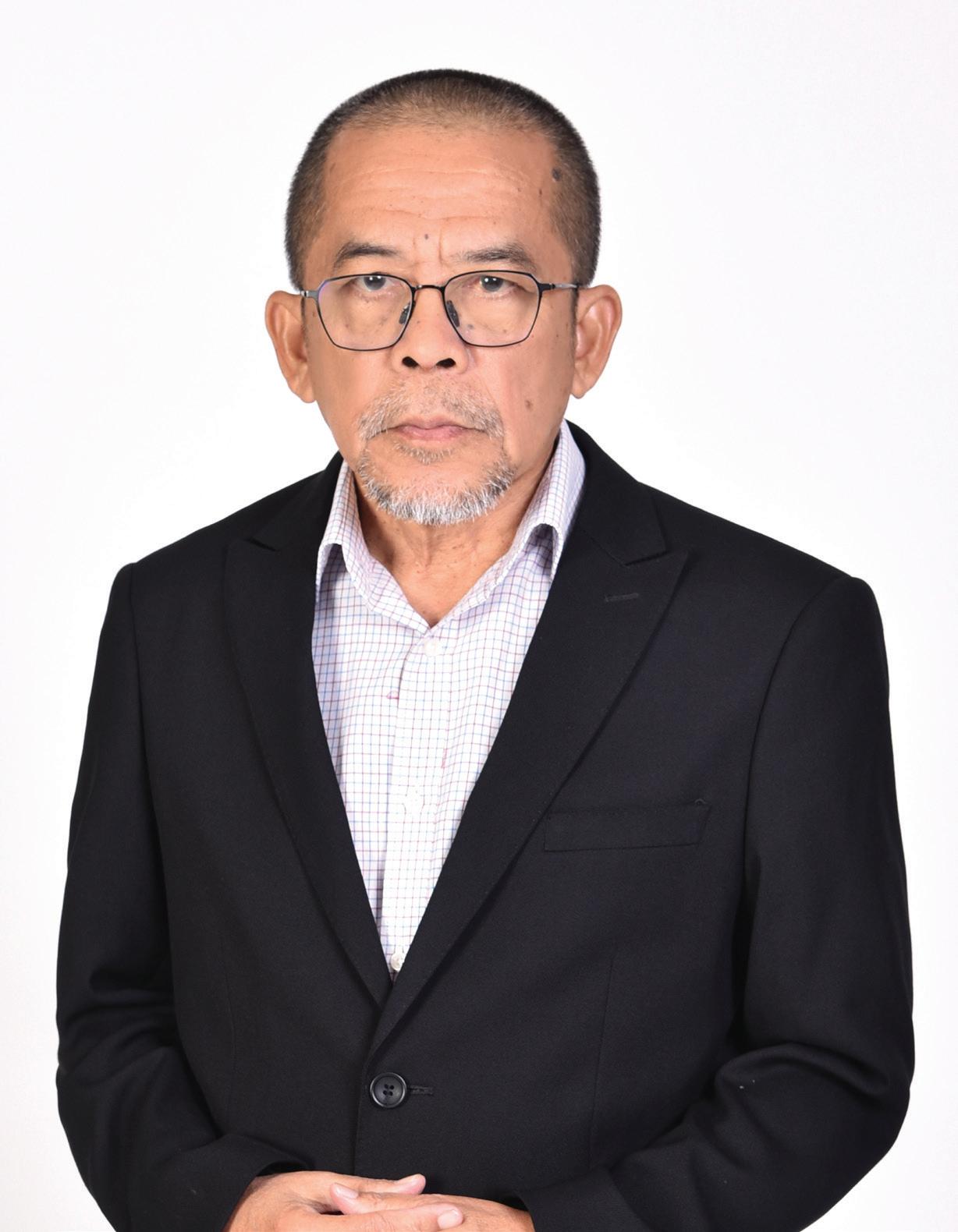
Ir Dr Selamat Aliman FASc
Consulting Professional Mining Engineer SBA Consultants
Dr Supramaniam Shanmugam FASc
Managing Director
Bonric Group of Companies
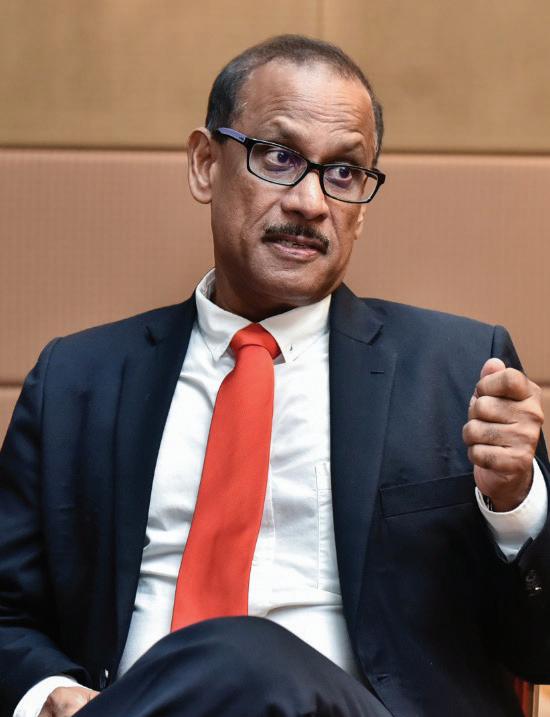
Dr Supramaniam Shanmugam FASc has significantly contributed to the rubber glove industry, particularly in establishing its standards and policies. He played a key role in enhancing the efficiency and sustainability of rubber glove manufacturing. Through his advocacy within the Malaysian Rubber Gloves Manufacturers Association (MARGMA), the glove industry has increased its support for R&D and technical expertise.
He has been actively involved as an entrepreneur, focusing on elastomers. With an extensive background in elastomers for gloves, tyres, and circular economy initiatives, he has served on various committees related to these sectors. He possesses international
experience and an in-depth understanding of glove markets and pricing trends, making him a soughtafter expert by international market analysts.
He also collaborates with Lembaga Getah Malaysia and Nano Malaysia to restore the market demand for natural rubber gloves and leads research on using nanomaterials to enhance gloves’ properties and characteristics. Recognising the importance of the environmental, social, and governance (ESG) standards, Dr Supramaniam actively works on solutions to address environmental issues related to rubber and rubber products.
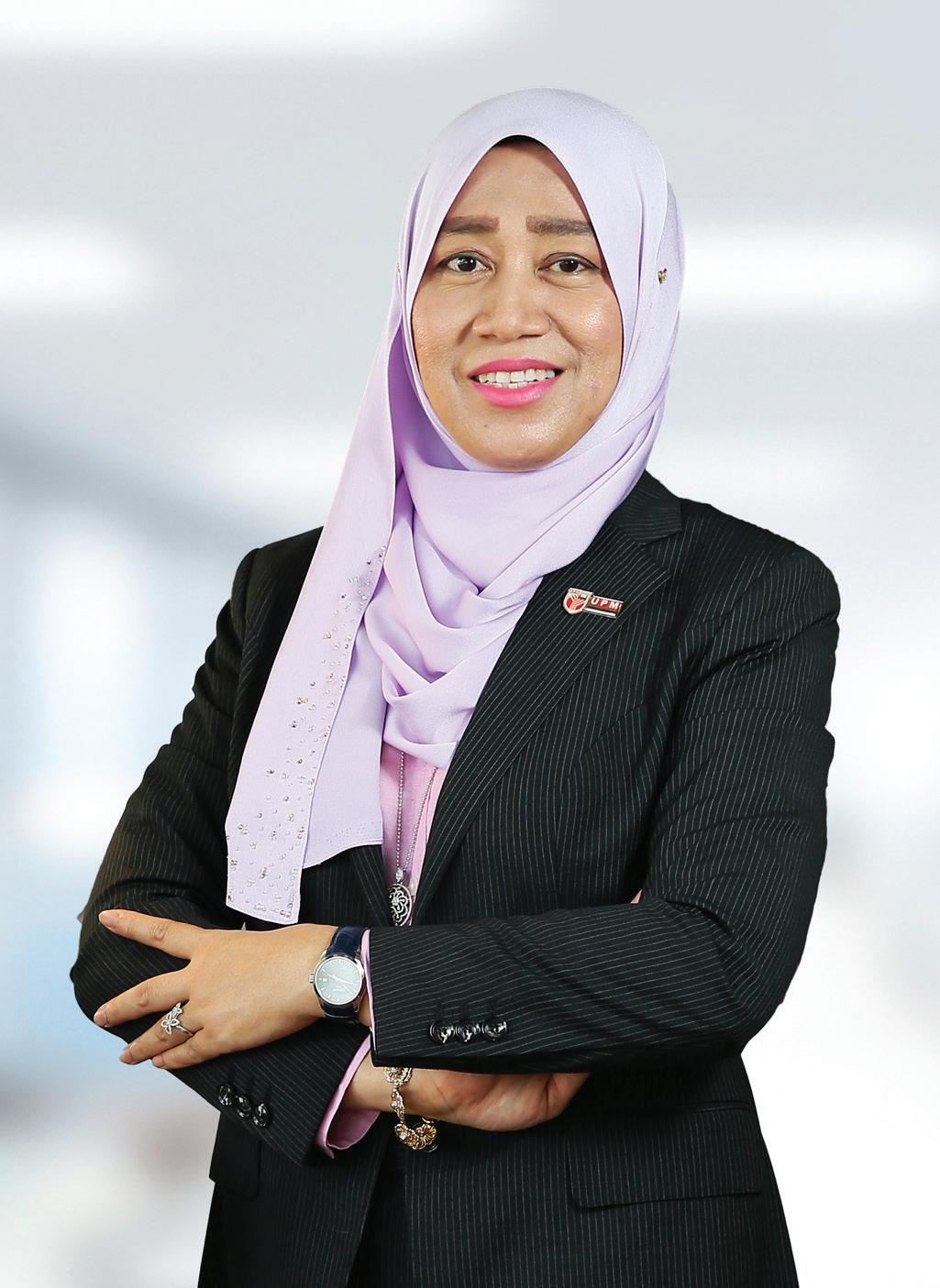
Professor Dr Azmawani Abd Rahman FASc
President and Chief Executive Officer
Putra Business School
Universiti Putra Malaysia (UPM)
Professor Dr Azmawani Abd Rahman FASc specialises in business management, with primary contributions in economics and business. An H-index of 33 and 6,365 citations highlight her exceptional influence and the widespread recognition of her research.
She has taught more than 60 courses in operations, supply chain, and strategic management. Through her teaching and research, she has significantly contributed to enhancing industry knowledge and advancing business excellence and performance. She actively delivered topics on leaderships, franchise business and development, and on operational excellence to both public and private sectors, contributing to the nation’s capacity development through her active role as a trainer.
Professor Azmawani has been instrumental to various key administrative positions at UPM and at the national level. She serves on the executive committee of the Malaysia Franchise Association (MFA) and works closely with the government as a think tank for the franchise industry’s development. Her global influence is further highlighted by her prestigious role as an auditor of business schools worldwide for the Association to Advance Collegiate Schools of Business (AACSB) and as key speaker in the AACSB conferences. She is highly sought after by the private sector, public service, and higher education for consultancy and research. Her insights have been featured in over 80 appearances across national mainstream media platforms, including newspapers, television, and radio.
In 2022, she was honoured with a fellowship award from the Institute of Marketing Malaysia. She has also led CEO and Leadership training programmes, including industry visit to South Korea, Japan and Thailand, contributing to her understanding of national, regional, and global business dynamics.
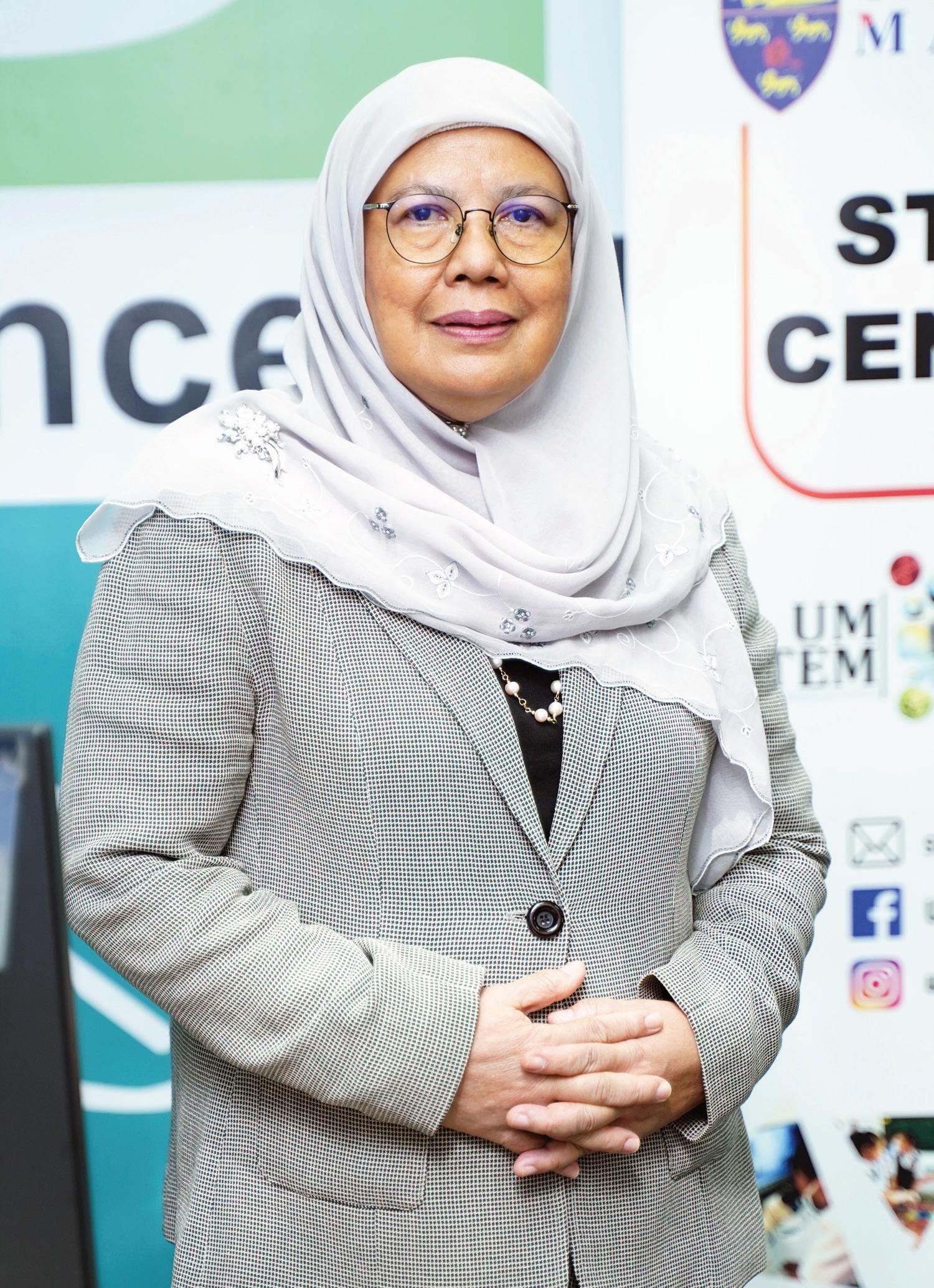
Professor Emeritus Dato’
Dr Noraini Idris FASc
President
National STEM Association
UM STEM Centre
Universiti Malaya (UM)
Professor Emeritus Dato’ Dr Noraini Idris FASc is an advocate of STEM education in Malaysia. She stands at the forefront of STEM, an indelible mark on the landscape as the President and Founder of the National STEM Association (NSA) in early 2000s. As the President and Founder of NSA, she has been involved with championing STEM Education in Malaysia. This organisation has played a pivotal role in seamlessly integrating STEM subjects across various educational levels.
She championed the Mini Theatre STEM initiative, combining theatre techniques with STEM education to inculcate students’ interest in STEM. Professor Emeritus Dato’ Dr Noraini has also been consulted by organisations such as SEAMEO STEM Education in Bangkok, the Ministry of Education for crafting strategic educational frameworks with national reach, and the National Science Foundation in the USA for collaboration on Women in STEM research. At present, she represents Malaysia under SEAMEO STEM Education Bangkok, with her research entitled Southeast Asian Teacher Education Program (SEA-TEP). Her expertise is often sought in STEM summits, for example, the Qatar and the Saudi STEM Education Summit in 2023. She has also led the drafting of the Singapore STEM report.
Beyond that, she holds over 30 product innovation medals, including a Gold Medal at ITEX (Geneva, 2005), and has consistently received Best Awards and Gold Medals at MTE (2004-2020) for innovations in assessment systems, educational modules, and teacher education models in STEM. Her remarkable contributions have earned her various awards, including being the only Asian recipient of the Distinguished Diversity Enhancement Awards at the Ohio State University in Ohio, USA, the Global Education Leadership Award, and the Outstanding and Excellent Leadership in STEM from the Republic of Croatia in 2019. In 2020, she received the International Recognition Award from INNOPA, Indonesia, solidifying her status as a leader in cultivating STEM entrepreneurs.
Senior Professor Dr P’ng Tean Hwa FASc specialises in piano performance and pedagogy, boasting 45 years of teaching experience in diverse capacities. He has showcased his musical prowess in over 100 concerts across Malaysia, Thailand, Indonesia, South Korea, Hungary, and the USA.
In Malaysia, he is one of the few Malaysians featured as a concerto soloist with the Malaysian Philharmonic Orchestra in over twenty years, when he performed Ravel’s Concerto for the Left Hand in October 2019. Professor P’ng, an accomplished musician, pedagogue, and scholar, consistently receives invitations to judge competitions, examine recitals, and conduct masterclasses and seminars, both nationally and internationally.
Appointed as an MQA panel member, he contributes to the review of Programme Standards for Performing Arts. In recent years, he played a role in reviewing the National Arts Policy, shaping the National Occupational Skills Standard (NOSS) curriculum for piano teaching, and contributing ideas towards the establishment of the Master of Music programme at UiTM. Within the ASEAN region, Professor P’ng holds a prominent position as an executive council member of the Southeast Asian Directors of Music (SEADOM) Association from 2023 to 2025, serving as the Malaysian Representative from 2017 to 2023.
Through his musical performances at various local and international concerts, his work on performativity delves into the significance of performing arts in shaping national identity. It explores its potential impact on socioeconomic and science education.
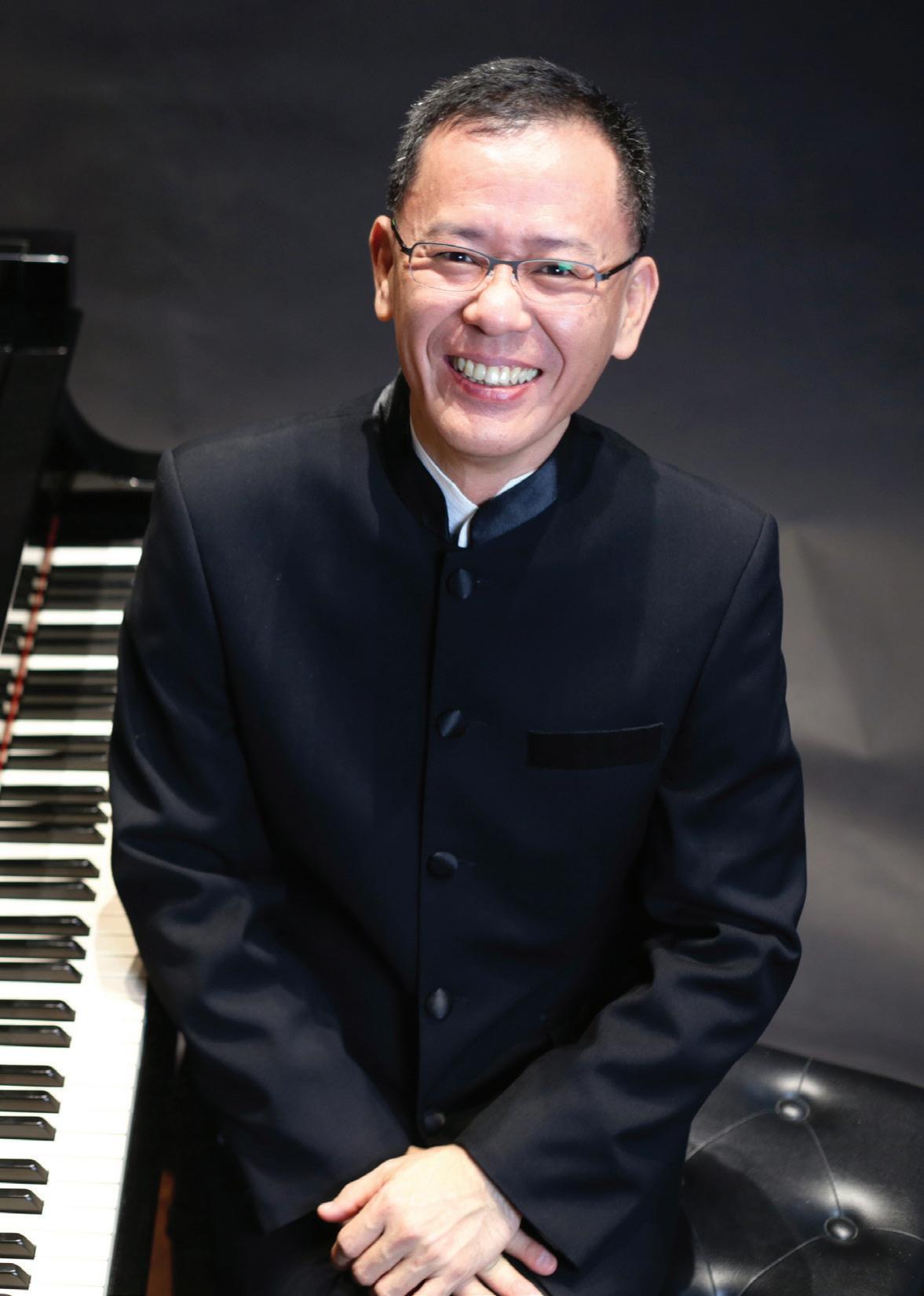
Senior Professor Dr P’ng Tean Hwa FASc
Director Institute of Music UCSI University
Professor Ts Dr Shahrina Md Nordin ACM FASc is a communication expert in social innovation whose works provide connectivity that bridges technologies to various stakeholders. Her works on communication models and approaches are imperative in addressing the grand challenges of sustainability. Her outstanding H-index of 30 and 3,845 citations underscores her substantial and widespread impact in her field.
At UTP, she is the former Founding Head of the Centre of Social Innovation and is currently the Director of the Institute of Smart and Sustainable Living. Previously, she served as the Director of the Project Management Office for international rankings and initiatives and was also part of the Transformation Plan and Execution team, which played a key role in transforming the university into a research-intensive institution. She also serves as the Lead Facilitator for the Energy Transition Malaysian Alliance (ET-MAce),
providing high-level insights into technology choices, investment imperatives, policy frameworks, and the socioeconomic impacts of achieving a sustainable, resilient, and inclusive energy future in Malaysia. Her works with the indigenous people in the Borneo island are notable example of social innovation projects aimed at uplifting the livelihoods of the communities.
Internationally, Professor Shahrina is the project overseer for Green Hydrogen Advocacy for Clean Energy in the Asia Pacific, involving 11 economies funded by APEC, and led Social Innovation research funded by the British Council. She is often invited as a keynote speaker at the international conferences and events to champion sustainability. Recognising her achievements, she was then appointed Penasihat Strategik (Inovasi Sosial) of the Sekretariat Toh Muda Laksamana Raja Mahkota.
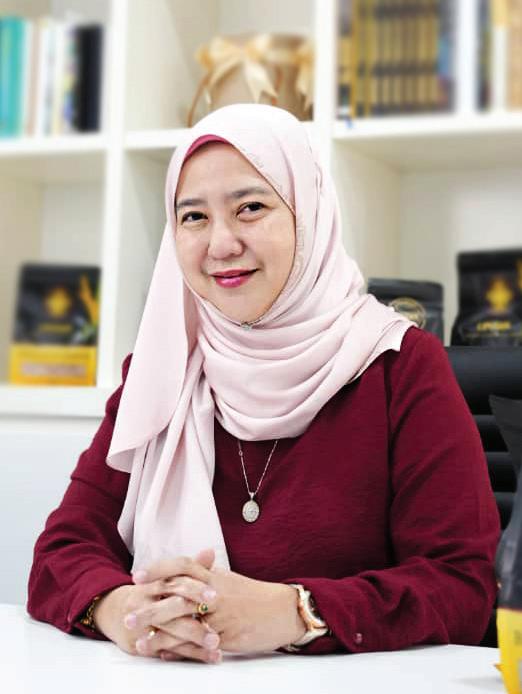
Professor Ts Dr Shahrina Md Nordin ACM FASc
Director
Institute of Smart and Sustainable Living
Universiti Teknologi PETRONAS (UTP)
Professor Dr Stefanie Shamila Pillai FASc
Faculty of Languages & Linguistics
Universiti Malaya (UM)
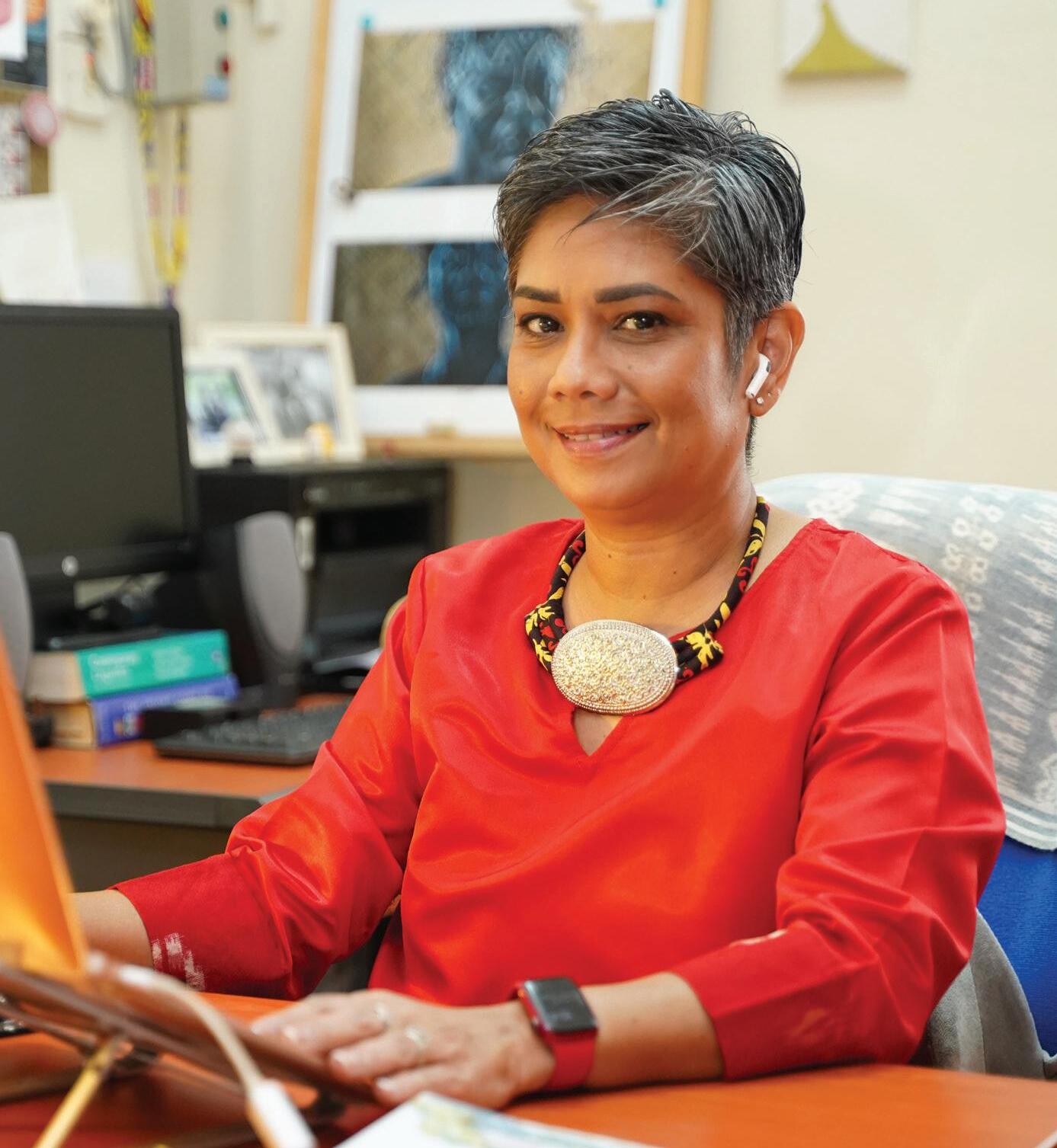
Professor Dr Stefanie Shamila Pillai FASc specialises in varieties of English, with a focus on the Malaysian variety of English, as well as language use in society. She has secured nine copyrights and a trademark for her work, with an H-index of 20 and 1,473 citations underscoring the impact of her work.
As a well-established and internationally recognised researcher, she has translated her scholarly endeavours into impactful advocacy, community projects, and policy initiatives. Her digitally archived documentation of Melaka Portuguese (MP) and subsequent revitalisation projects, in collaboration with community representatives, have produced print and mobile learning materials that are being used to teach endangered language and encourage its use. The community initiatives also included a
micro-tourism initiative, the Language Travels. She is currently working on a project with the National Department of Culture and Arts (Melaka) on the Melaka Portuguese language and culture.
She contributed to the National English Language Roadmap which set the direction for English language education in the country. Recognising her expertise in English in Malaysia, Professor Stefanie has received invitations to contribute to internationally published edited collections. Presently, she is a consultant for new Malaysian English entries to the Oxford English Dictionary. In acknowledgement of her exemplary work in these areas, she holds the distinction of being the only Malaysian to receive the Ian Gordon Fellowship from the School of Linguistics and Applied Language Studies at Victoria University Wellington.
Dr Sumit Mandal FASc
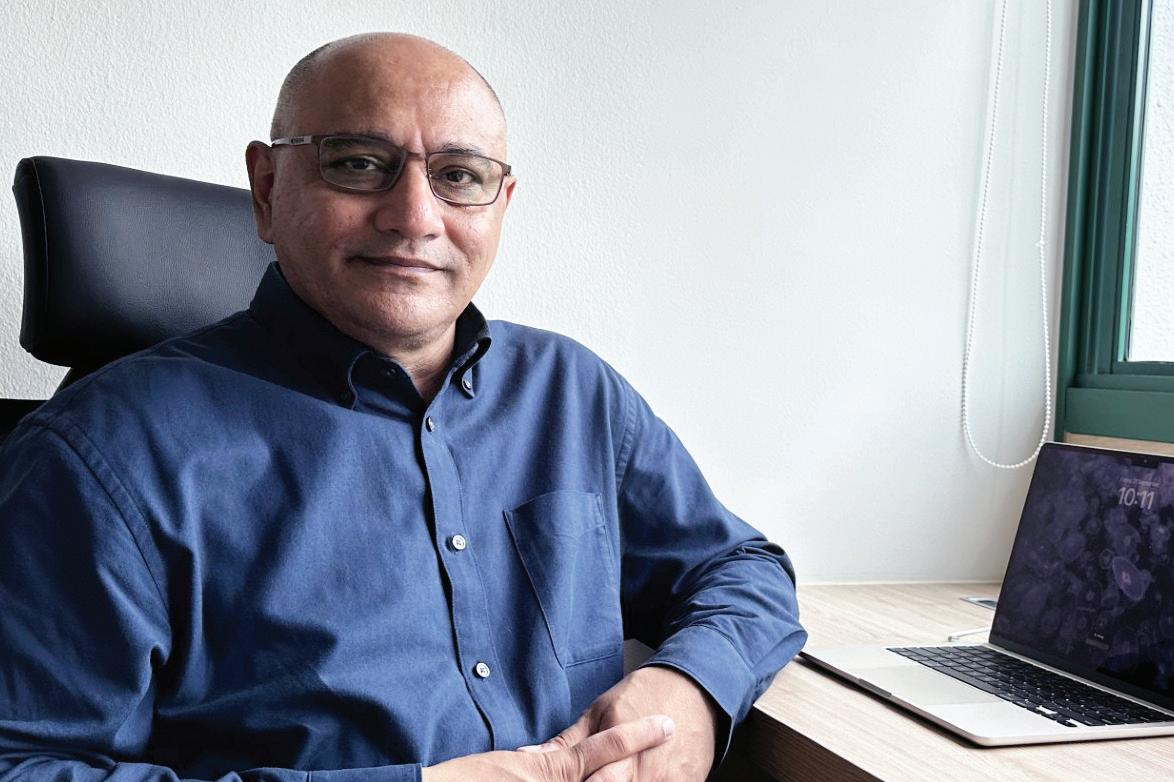
Muhammad Alagil Chair in Arabia Asia Studies
Asia Research Institute
National University of Singapore
Dr Sumit Mandal FASc is a historian who has made a significant impact globally by redefining and expanding the scope of Malay World Studies. He has advanced a conceptualisation of the Malay world as a porous and absorptive cultural geography that existed before nation-states and was a site of dynamic transregional social interaction on multiple scales. This perspective transforms the Malay world into an interpretive framework that advances the study of culturally diverse contexts as well as fluid and malleable identities.
Dr Sumit’s “Becoming Arab: Creole Histories and Modern Identity in the Malay World” (Cambridge, 2018) was awarded the 2020 Harry J Benda Prize by the Association for Asian Studies in the United States. In addition, he has notable publications on ethnicity
and cultural diversity, art and performance, and Pramoedya Ananta Toer, the Indonesian novelist and historian. He has also written extensively on these topics in the popular media.
Dr Sumit has given public talks and interviews on transregional history and Malaysian identity in Malaysia and internationally, including Indonesia, Singapore, Japan, South Africa, Germany, and the United States. He has also disseminated knowledge about the Malay world beyond the classroom in lectures organised by bookshops, cultural groups, and other non-governmental organisations.
In 2022, he was appointed to the Advisory Board of the 170-year-old journal, Bijdragen tot de taal-, land- en volkenkunde (Journal of the Humanities and Social Sciences of Southeast Asia) based in the Netherlands.
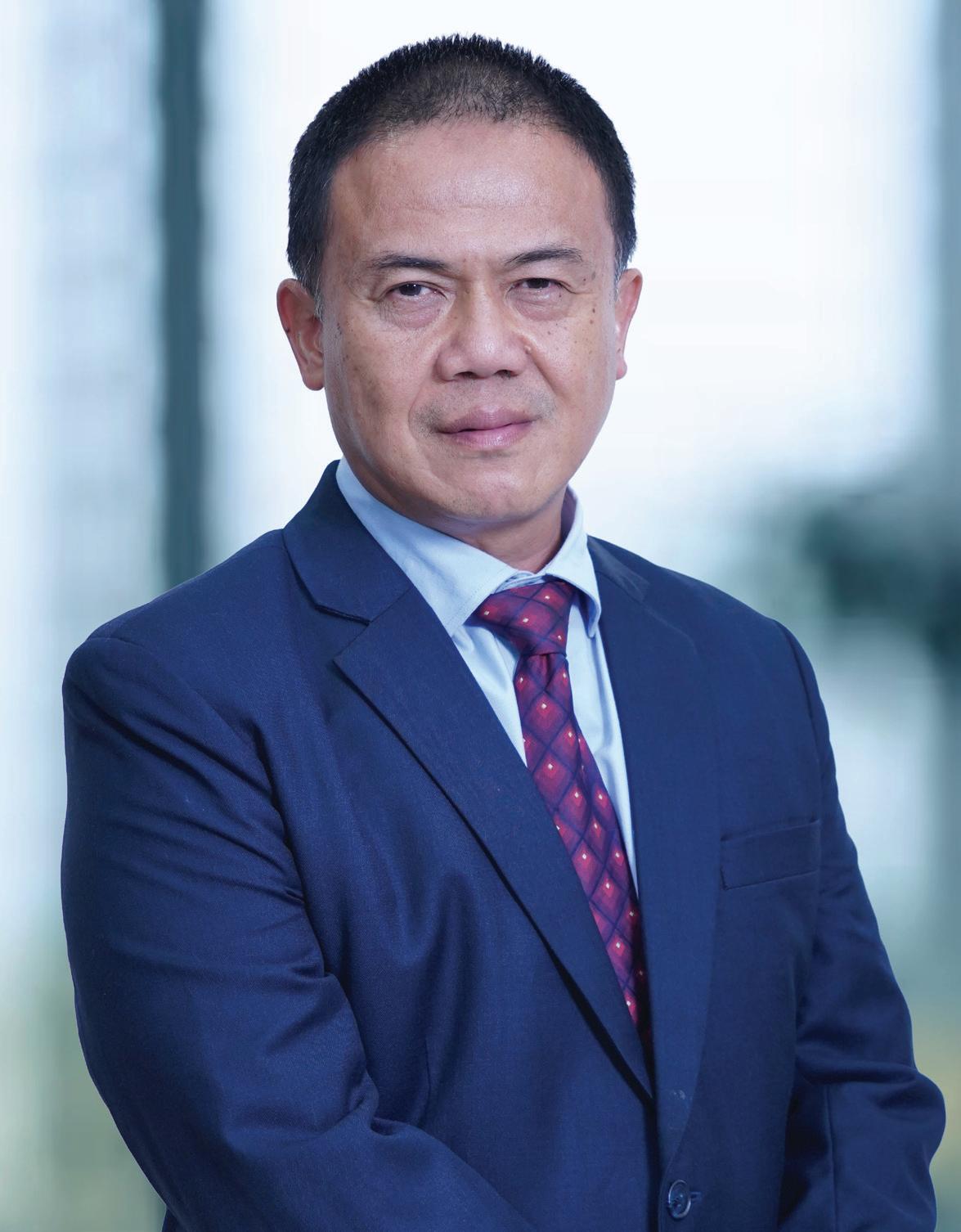
Professor Dr Awis Qurni Sazili FASc specialises in meat science, halal slaughter management, and animal welfare. His work has significantly advanced animal welfare, improved product quality, and provided scientific validation for the halal meat industry. Recognised as one of Elsevier’s World’s Top 2% Scientists in 2022, 2023, and 2024, he has authored numerous high-impact publications, accumulating 5,573 citations and an h-index of 40.
Professor Awis has spearheaded pioneering research on electrical stunning techniques for halal slaughter. Projects such as the validation of electrical water bath stunning techniques for broiler chickens have been crucial in shaping halal meat industry regulations. He has played an instrumental role in balancing religious requirements with scientific practices, making substantial contributions to the development and implementation of humane and efficient slaughter methods that comply with Islamic guidelines. This research has provided the halal meat industry with
Professor Dr Awis Qurni Sazili FASc
Faculty of Agriculture
Universiti Putra Malaysia (UPM)
robust scientific validation, improving both animal welfare and product quality. Additionally, his research on natural additives in animal nutrition has provided sustainable solutions for meat quality enhancement and preservation, addressing both public health and environmental concerns.
Professor Awis also holds several key positions at national, regional, and international levels. His collaborations with global organisations, such as the World Organisation for Animal Health (WOAH), the Standards and Metrology Institute for Islamic Countries (SMIIC), and the United Nations Economic Commission for Europe (UNECE), have influenced international standards for meat production. His extensive consultancy work with governmental agencies, including the Department of Veterinary Services Malaysia and the Department of Standards Malaysia, has facilitated the integration of scientific advancements into national policies.
Professor Dr Goh Yong Meng FASc is an expert in biological sciences, specialising in physiology and veterinary medicine. His extensive research has earned widespread recognition, with 7,576 citations and an h-index of 47. He played a pivotal role as a pioneering member in drafting the Malaysian Animal Welfare Act 2015 (Act 772) and helped establish the code of practice on animal welfare.
He co-developed the Malaysian Code for the Care and Use of Animals for Scientific Purposes (MyCODE), a regulatory framework enforced through Act 772. His expertise extends beyond national policies, with his research on humane cattle slaughter being referenced by the Australian Meat and Livestock Association (MLA) since 2011. His contributions have also shaped intergovernmental discussions on Australian beef imports to Malaysia, ensuring that Australian animal welfare regulations align with Malaysian Halal standards (MS1500:2009).
His research has gained widespread recognition both locally and internationally. Since 2020, he has served on the World Organisation for Animal Health (WOAH) International Expert Panel for Veterinary Workforce Development and the WOAH-ASEAN Veterinary Medicine Curriculum Accreditation Task Force, contributing to global veterinary education and policy development. The Japanese Association for Laboratory Animal Science (JALAS) honoured him with its prestigious international award for his groundbreaking work on memory and cognition in laboratory animals. His research team has also earned significant acclaim, winning over 18 gold, silver, and bronze awards at UPM and national levels for their innovative research and scientific contributions since 2004.
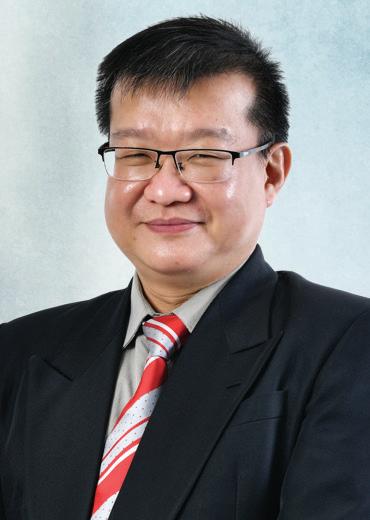
Professor Dr Goh Yong Meng FASc
Faculty of Veterinary Medicine
Universiti Putra Malaysia (UPM)

Mr Hoh Chee Choong FASc is an expert in genomics, computational biology, and comparative genomics. He founded Codon Genomics, Southeast Asia’s first biological data company, and has collaborated with over 60 local and international academic and research institutions as a service provider and research partner.
Mr Hoh and his team identified the first extensively multidrug-resistant Mycobacterium tuberculosis strain, a critical breakthrough in public health. He co-funded and led a novel rare disease diagnostics and publication with Hospital Universiti Kebangsaan Malaysia (HUKM) to strengthen Malaysia’s diagnostic capabilities. In cancer genomics, he contributed to sequencing over 100 genomes, laying the foundation for personalised medicine and developed the Genomics Ecosystem Integration Platform (GEIP). In the agriculture sector, he developed Agrinome, which has been widely adopted in the industry and earned the Most Transformative Technology Award at the 2024 World Palm Oil Conference. He also developed the CGBarc Platform, tracking 92,000 fungal genes under the National Ganoderma Programme.
Committed to nurturing future scientists, he has conducted over 50 seminars and workshops across Southeast Asia, training early-career researchers in bioinformatics and genomics. His dedication to knowledge transfer and mentorship earned him an Adjunct Professorship at UPM. On a global scale, he collaborates with institutions in over 60 countries, including Emory University, the Wellcome Trust, and Lund University, strengthening Malaysia’s role in international genomics research. Beyond research, he actively contributes to ASM’s initiatives, including the Science, Technology, and Innovation Masterplan (STIMP) 2020–2030, the National Planetary Health Action Plan, and the National Biotechnology Policy.
Chief Executive Officer
Codon Genomics Sdn Bhd
Mr Hoh Chee Choong FASc
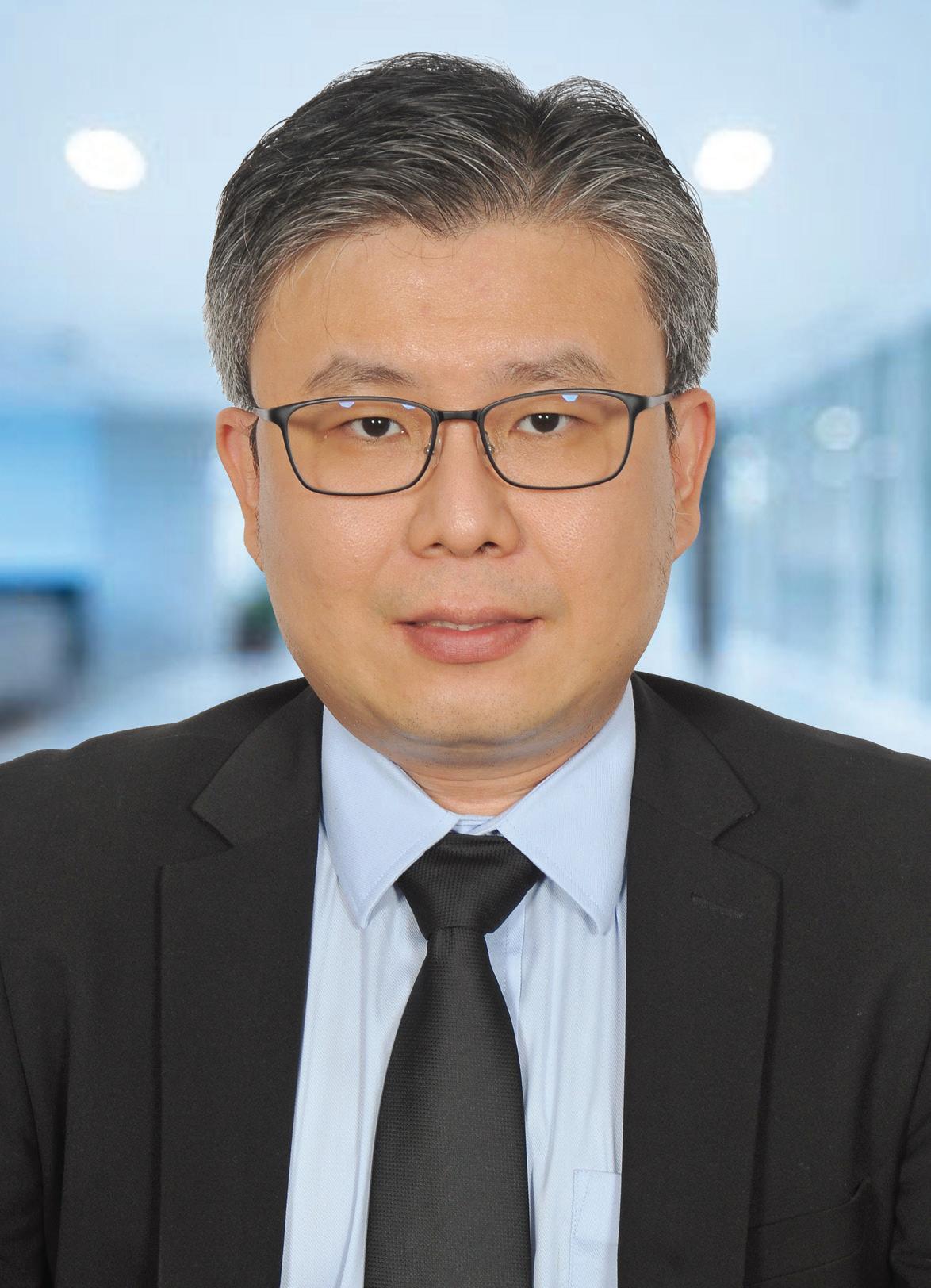
Professor Ts Dr Lee Khai Ern FASc
Institute for Environment and Development (LESTARI) Universiti Kebangsaan Malaysia (UKM)
Professor Ts Dr Lee Khai Ern FASc specialises in green technology and sustainability management, with expertise in environmental science, technology, and jurisprudence. He plays a crucial role as the focal person for the Sustainable Development Solutions Network (SDSN) Malaysia Chapter and is recognised by the Malaysia Board of Technologists (MBOT) as a professional technologist in green technology. He is also accredited as a panel mediator for environmental dispute resolution by the Malaysia International Mediation Centre (MIMC), under the Bar Council of Malaysia.
At the international level, he served as a lead auditor certified by the International Register of Certificated Auditors (IRCA), overseeing quality, environmental, health, and safety compliance for corporate branches across the Asia-Pacific region. Currently, he serves as the Co-Chair of the Water and Mineral Resources Cluster in the Science Panel for Borneo. He is also a Senior Fellow under the United Nations Sustainable Development Solutions Network (UN-SDSN).
Professor Lee has pioneered innovative environmental solutions, including his patented Mobile Constructed Wetland, which won a Gold Medal at the 35th International Invention, Innovation and Technology Competition & Exhibition Malaysia (ITEX 2024) and leads the Integrated Water Research Synergy Consortium (IWaReS). At ASM, he has contributed as a writer for Science Outlook 2017, served as a Module Cluster Leader for Water Sector Transformation 2040, a member of the YSN-ASM Science Leadership Working Group, as well as currently serving as Secretary of the ASM WEHAB++ Environment Committee.
Dr Leslie Low Eng Ti FASc is a leading expert in genomics, bioinformatics, and oil palm genome informatics, with substantial contributions to global knowledge in the field. His pioneering work in oil palm gene annotation and ontology positioned him as a joint first author in Nature for the publication of the oil palm genome sequence. He played a crucial role in several groundbreaking discoveries published in Nature and co-discovered the fruit colour gene, a key determinant of fruit ripening and oil yield. His research output resulted in 2,793 citations and an h-index of 21.
Dr Low has been instrumental in developing bioinformatics tools and resources that have significantly advanced oil palm research. He established the Oil Palm Genome Programme Data Centre, a comprehensive hub for data analysis, bioinformatics support, and training. His efforts also led to the creation of several critical online platforms, including GenomSawit, MYPalmViewer, PalmXplore, and OPSRI. These interlinked portals have been used by researchers from 114 countries, facilitating global collaboration in oil palm genomics.
Dr Low has also played a key role in creating the MPOB Bioinformatics Portal, BioWiseV2, and co-developed Seqping. He holds nine patents, of which eight have been granted, with several successfully translated into commercial applications. Among these, SureSawit™ SHELL has gained global recognition as an efficient tool for screening and selecting thin-shelled, high-yielding oil palms. His groundbreaking innovations have earned Platinum and Gold Awards at the British Invention Show, solidifying his impact in the field. Through his research, technological advancements, and contributions to bioinformatics, Dr Low has played a pivotal role in shaping the future of oil palm genomics.
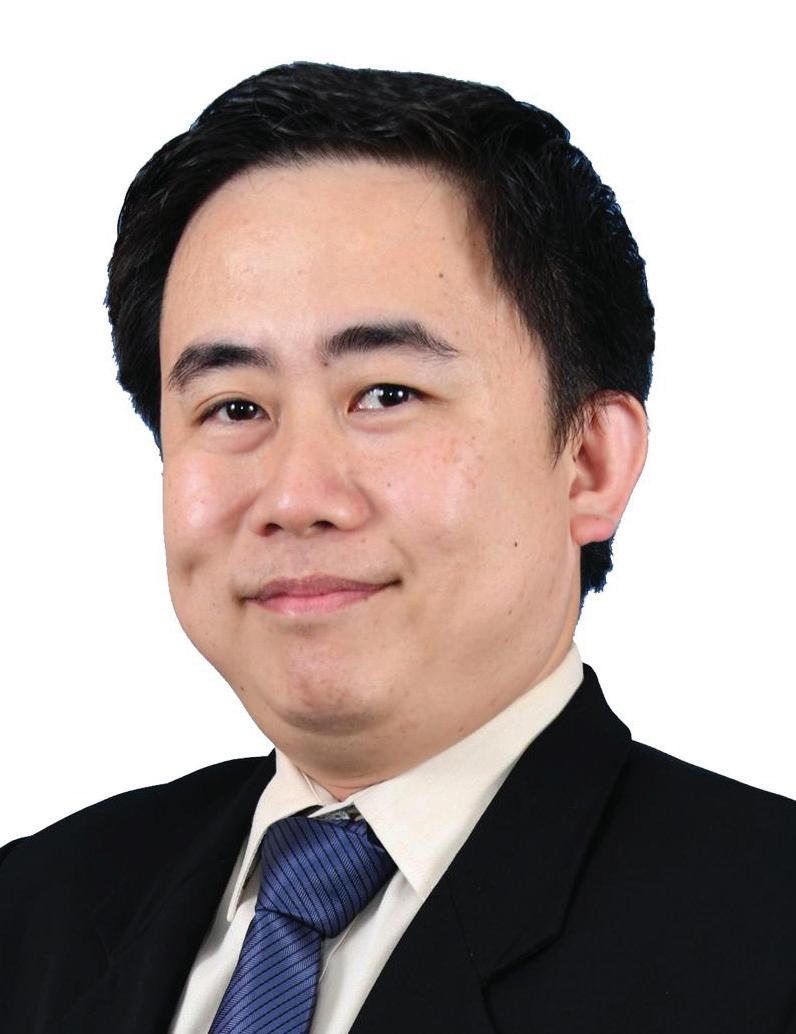
Dr Leslie Low Eng Ti FASc
Head of Bioinformatics Unit Malaysian Palm Oil Board (MPOB)
Professor Dr Lim Po Teen FASc is a leading scientist in harmful algal blooms (HAB) research. His work has significantly minimised the impact of algal blooms on seafood safety, fisheries livelihoods, and marine ecosystems. He has published over 170 scientific papers, accumulated 4,376 citations, and achieved an h-index of 36. His research has identified more than 15 novel harmful algal species, including eight toxic diatoms from the genus Pseudo-nitzschia. Several species, such as Pseudo-nitzschia limii, Heterocapsa limii, and Alexandrium limii, have been named in his honour, recognising his two decades of contributions to HAB research.
Professor Lim plays a key leadership role in international HAB bodies and has served as Vice President of the International Society for the Study of Harmful Algae (ISSHA) for three consecutive terms (2018–present). He actively contributes to national
and global initiatives, including the UNESCO IOC Intergovernmental Panel on Harmful Algae Blooms (IPHAB), the National Technical Working Group on Biotoxins and HABs, and Malaysia’s Task Force on Import/Export Seafood Products and Safety.
He is also a sought-after speaker, having delivered over 150 presentations at conferences globally, including a plenary talk at the 2023 International Conference on Harmful Algae in Hiroshima, Japan. He frequently provides insights on seafood safety and biosecurity through outreach programmes for regulatory authorities. Professor Lim’s excellence in research has earned him international recognition, including the prestigious Chinese Academy of Sciences President’s International Fellowship Initiative (CASPIFI) in 2024. He was also awarded the Senior Visiting Fellowship at the State Key Lab in Marine Environmental Sciences, Xiamen University.
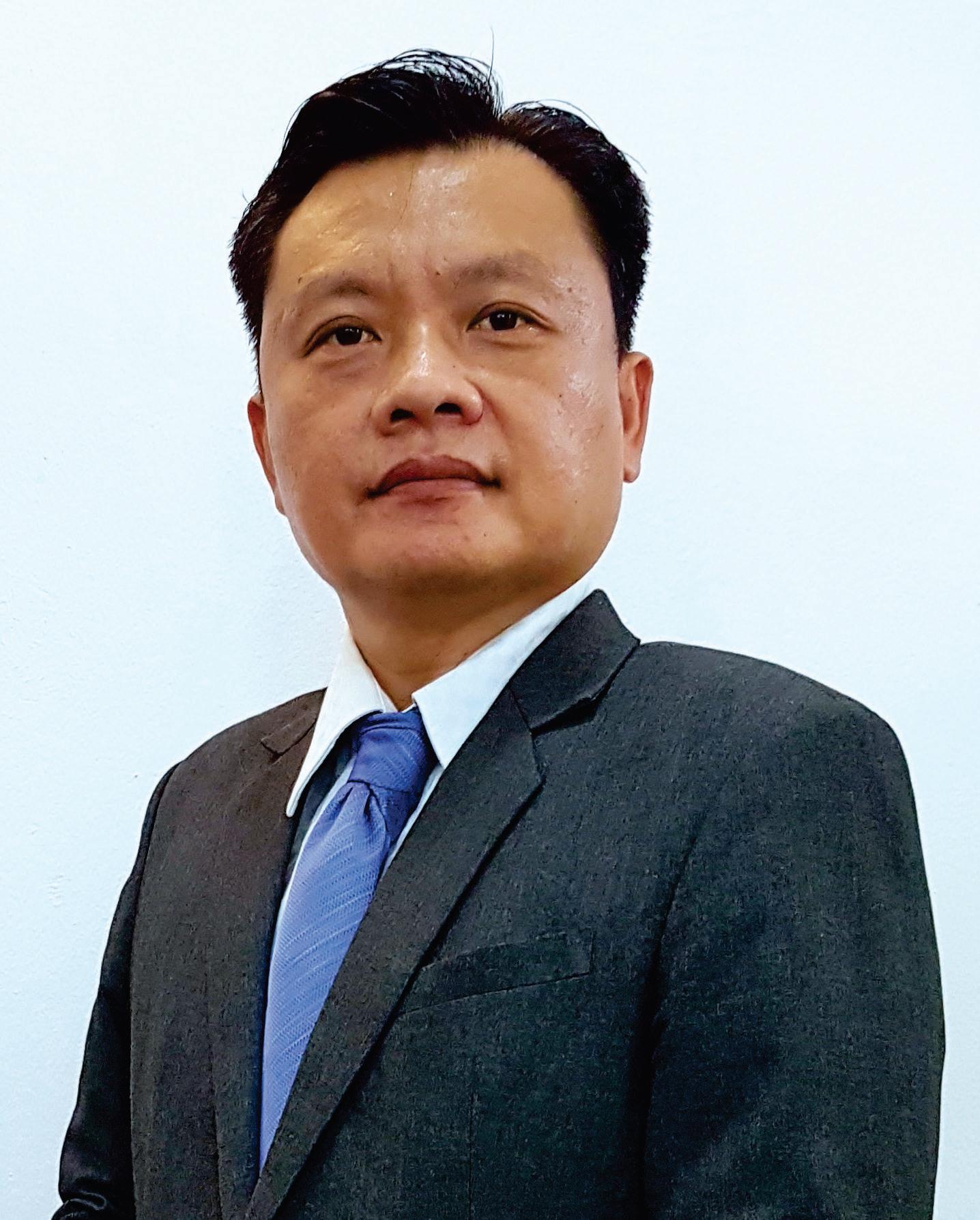
Professor Dr Lim Po Teen FASc
Institute of Ocean and Earth Sciences Universiti Malaya (UM)
Professor Dr Loh Teck Chwen FASc
Faculty of Agriculture Universiti Putra Malaysia (UPM)
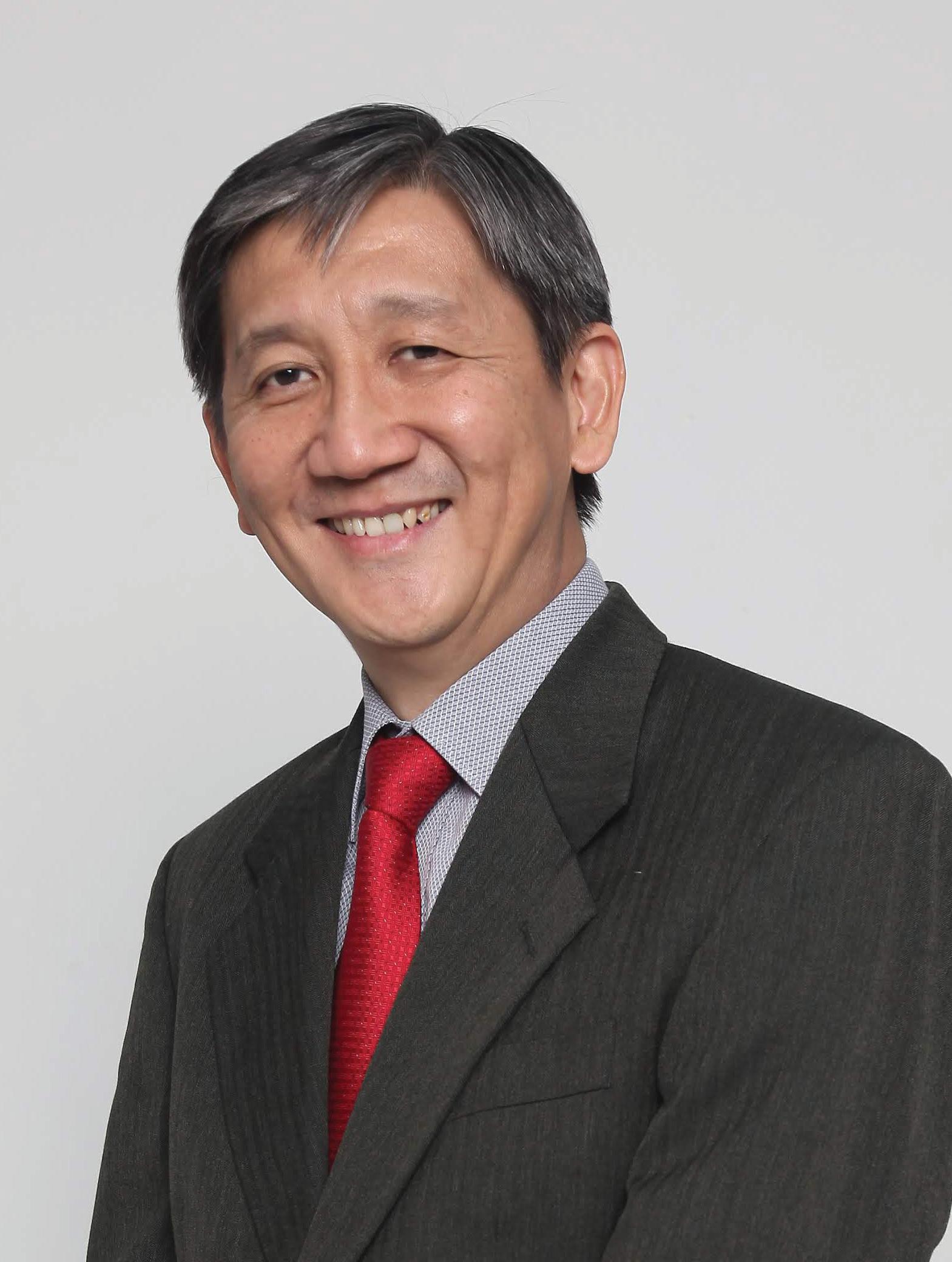
Professor Dr Loh Teck Chwen FASc is a distinguished academic and researcher in animal production and nutrition. His contributions to the field have significantly advanced understanding of balanced diets and least-cost feed formulation in livestock and poultry, resulting in tangible improvements in animal health through the use of friendly feed additives in the industry. He has an extensive publication record, with 4,704 citations and an h-index of 38. As Technical Vice-Chairman of the Federation of Livestock Farmers Association of Malaysia (FLFAM), he has provided guidance to farmers, advocating for Good Animal Husbandry Practices (GAHP) recommended by Malaysia’s Department of Veterinary Services.
One of his notable achievements is the commercialisation of a patented monogastric animal feed incorporating postbiotics as a feed additive. which offers a sustainable alternative to antimicrobial growth promoters. In 2017 and 2019, he was invited
by UKRI as a panel member to evaluate research proposals from leading UK universities. He is also a regular reviewer for multiple prestigious journals, reinforcing his active role in advancing scientific knowledge. In collaboration with MyFundAction, he trained nearly 20 individuals from the B40 community in chicken farming, enabling them to achieve a sustainable monthly income over three to four years, contributing to poverty alleviation.
Professor Loh has been actively involved in ASM activities, serving as a working group member of the National Planetary Health Action Plan for the Sustainable Food Pillar and a member of the Livestock Health and Production Working Group of the ASM Agriculture Committee. His contributions to research, innovation, leadership, and community engagement have had a profound impact on the livestock industry and farming communities.
Professor Dr Fasihuddin Badruddin Ahmad FASc is a natural product chemist, with a particular emphasis on drug discovery and development. He has demonstrated effective leadership qualities in leading the university towards the advancement of research, education and service at national and international levels. He teaches natural product chemistry, polymer chemistry, organic chemistry, biomacromolecule chemistry, medicinal chemistry, scientific communication, and food chemistry.
A distinguished researcher with a robust portfolio of publications and academic service, his publication contributions include three books, an editorial board for 10 books, 30 articles as book chapters, translation of one book, 154 journal articles (134 in international journals), and 93 proceeding papers. He also serves as a referee for several high-impact journal articles. His Google Scholar h-index is 27, with 3,087 citations.
Professor Fasihuddin had also effectively contributed to establishing education and research networks and collaborations between local scientists and their international counterparts through his role as Deputy Chairman of the Sarawak Traditional Medicine and Herbal Association, and had completed 45 research projects, either as a leader or co-researcher. He has strong research collaborations for drug development with various organisations such as Yamanouchi Pharmaceutical Co., Ltd, Japan; Tokushima Bunri University, Japan; University of Wales, Wrexham Campus; UKM, UM, Institut Penyelidikan dan Kemajuan Pertanian Malaysia (MARDI), and Forest Research Institute Malaysia (FRIM), among others. Professor Fasihuddin was honoured with the Gold Award at the Seoul International Invention Fair 2011: Novel inorganic compounds with microbial activities.
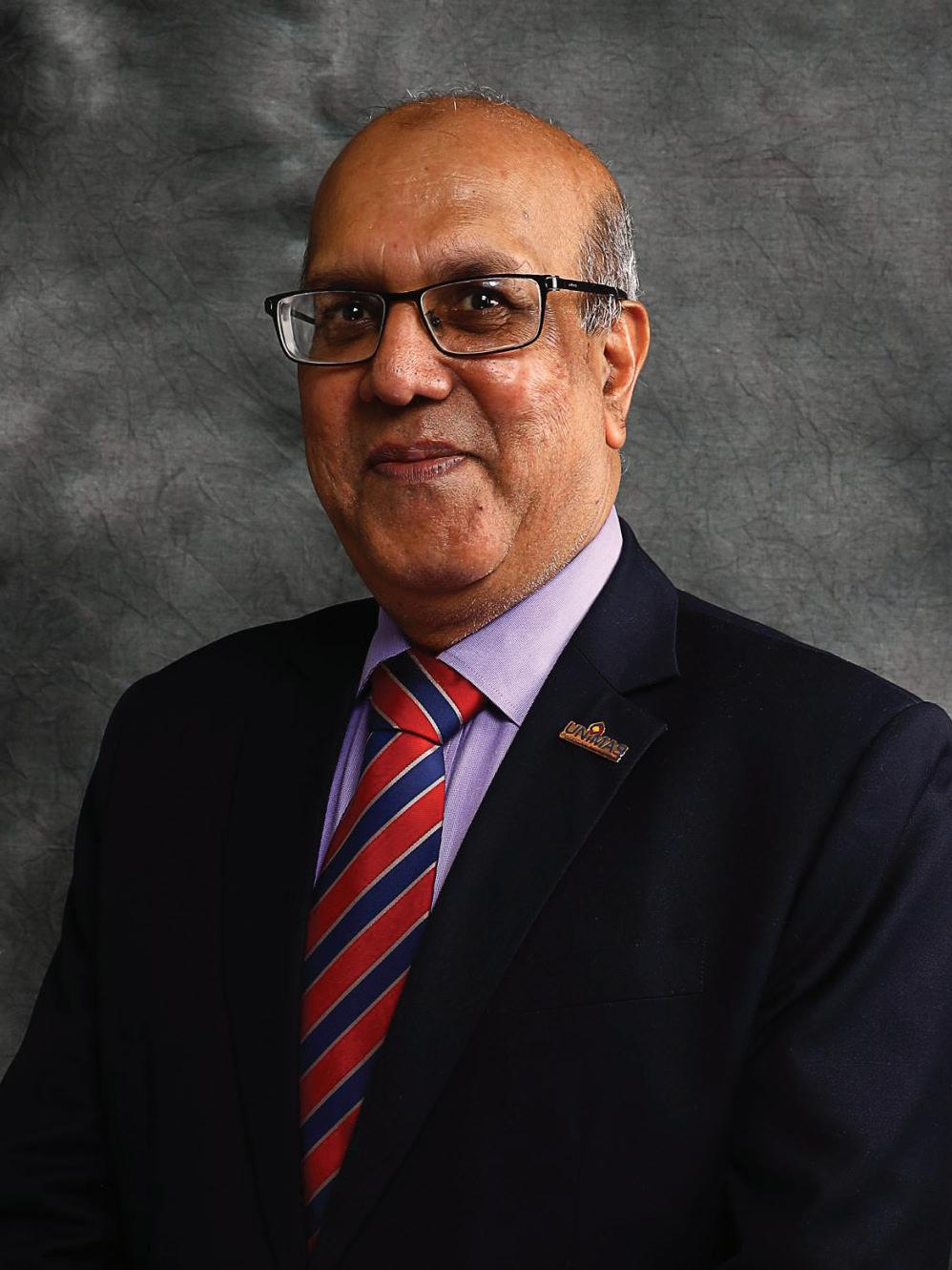
Professor Dr Fasihuddin Badruddin Ahmad FASc
Faculty of Resource Science & Technology Universiti Malaysia Sarawak (UNIMAS)
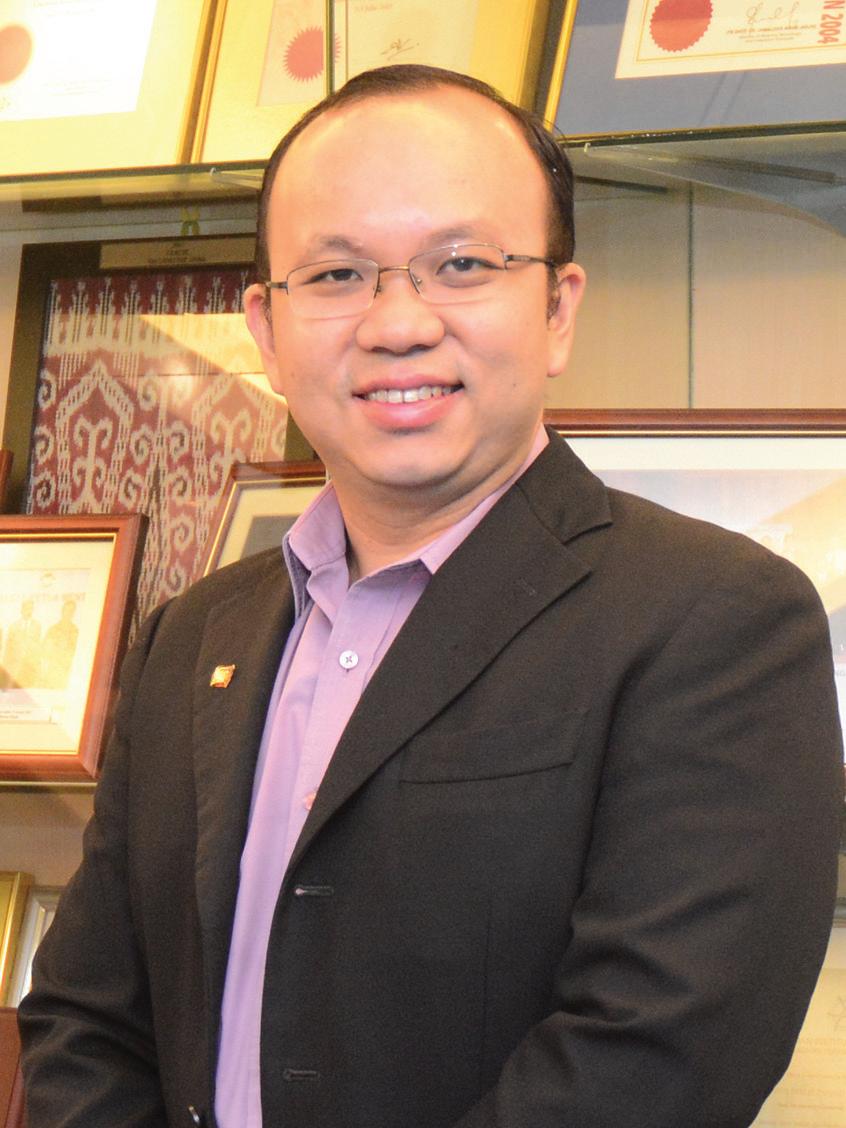
Professor ChM Dr Goh
Choo Ta FASc
Director & Principal Fellow
Institute for Environment and Development (LESTARI)
Universiti Kebangsaan Malaysia (UKM)
Professor ChM Dr Goh Choo Ta FASc specialises in chemical governance and safety. He provided technical inputs to the Government of Malaysia on matters related to chemical management. He has been recognised as a leader for 27 research/consultancy projects and has published over 70 journal articles and 30 chapters in books. His Scopus h-index is 15, with 555 citations.
He was appointed by NRES as Head of Advisory Panel for the National Chemicals Governance Committee and by MOH as an environmental health expert in the field of chemical governance and chemical safety. Internationally, he provided technical assistance on international agreements, such as the Minamata Convention on Mercury and the Stockholm Convention on Persistent Organic Pollutants. He has collaborated with the UN Institute for Training and Research (UNITAR) and the UN Development Programme (UNDP) on projects related to chemical management. He has extensive experience in implementing the Globally Harmonised System of Classification and Labelling of Chemicals (GHS). In this regard, he was appointed by the Ministry of Investment, Trade, and Industry (MITI) to develop a system known as the Classification Tool for Chemical Mixture (CATCH), which assists the industry in complying with the CLASS Regulations 2013.
Professor Goh had contributed to ASM as a Module Cluster Leader (Academia) for the Roadmap on Water Sector Transformation 2040. He was also involved in various studies as a committee member, including the ASM Task Force on the Sungai KimKim and Pasir Gudang Incidents and the ASM Steering Committee for the Review of the Environmental Quality Act 1974.
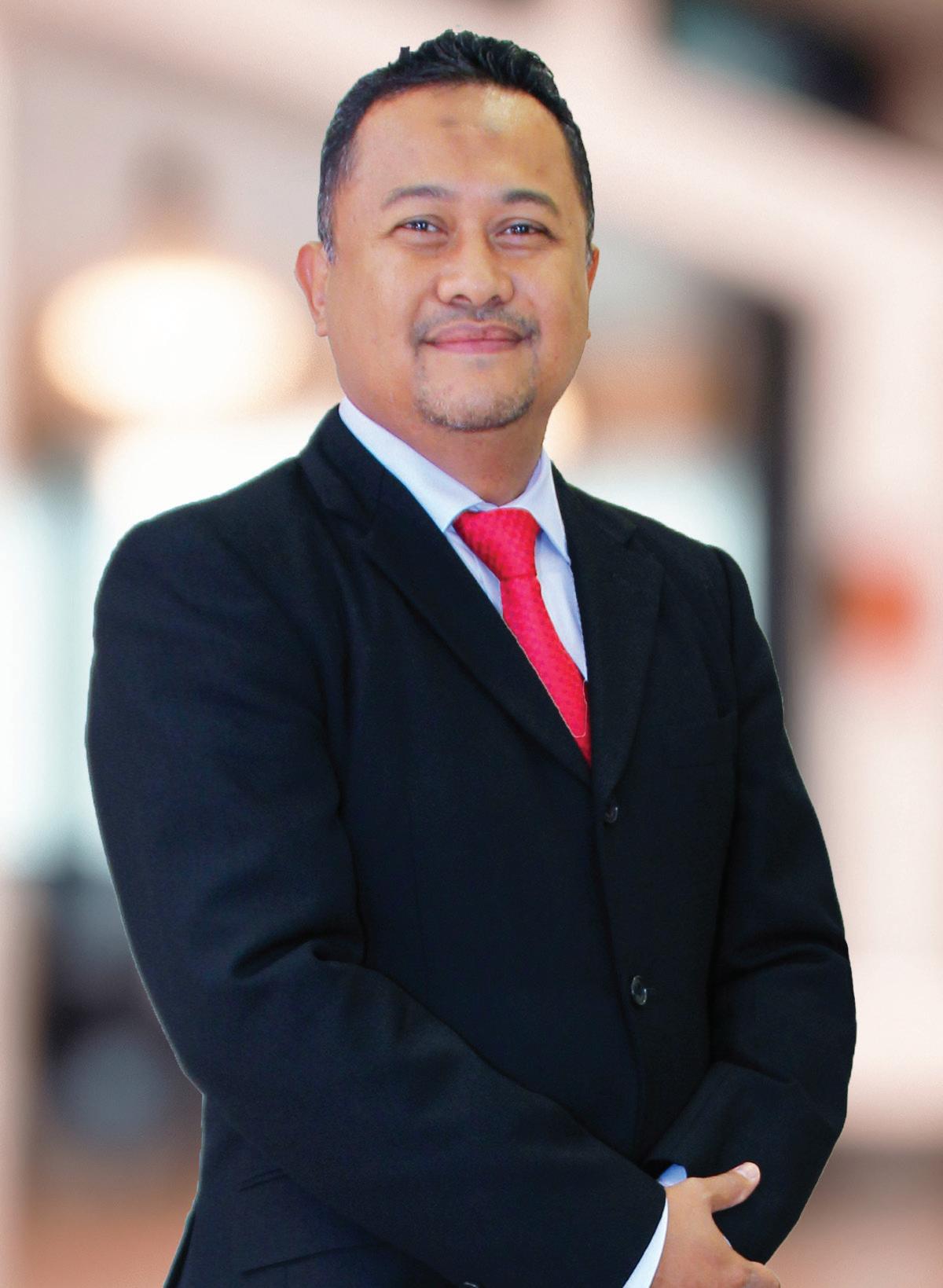
Professor Dr Mohd Cairul
Iqbal
Mohd Amin
FASc
Centre for Drug Delivery Technology and Vaccine (CENTRIC)
Faculty of Pharmacy
Universiti Kebangsaan Malaysia (UKM)
Professor Dr Mohd Cairul Iqbal Mohd Amin FASc specialises in nano drug delivery systems, focusing on developing nanocarriers such as micelles for cancer therapy and liposomal systems to combat bacterial resistance. He revolutionised the use of bacterial cellulose by transforming coconut-based jelly (nata de coco) into a versatile biomaterial for advanced drug delivery and tissue engineering. This led to applications in tablet film coatings, wound dressings, cell scaffolds for tissue engineering, and carriers for oral insulin and vaccines. Recognised for his contributions, he was listed in the Top 2% of Scientists worldwide by Stanford University in 2019 and 2020, with a Google Scholar h-index of 48 and 7,585 citations.
He patented a biopolymer coating composition, followed by the development of nata de coco-based hydrogel for various applications, a microwave-irradiated nata de coco hydrogel for pharmaceutical and cosmetic uses and a method for preparing drug-loaded amphiphilic copolymer micelles for targeted antitumor drug delivery. He founded the Malaysia Chapter of the Controlled Release Society (MyCRS) and served as its inaugural president for two terms. He was also a Visiting Professor at Prince of Songkla University, Thailand, and at Universitas Andalas, Indonesia.
Professor Cairul served as the Deputy Director-General of Higher Education from 2019 to 2021, overseeing research and international relations within the Malaysian higher education landscape. During his tenure, he initiated the University for Society (U4S) project, which bridged research from the laboratory to community applications through translational research activities, benefiting marginalised communities in Malaysia.
Professor Ir Ts Dr Ahmad ‘Athif Mohd Faudzi FASc is a leading expert in robotics and artificial intelligence at UTM. Having earned a Doctor of Engineering in System Integration from Okayama University, Japan, he has significantly advanced research in the fields of robotics, soft actuators, teleoperated and autonomous systems. He has published over 230 papers, which have recorded 3,460 citations with an h-index of 28.
As the former Director of UTM’s Centre for Artificial Intelligence and Robotics (CAIRO), he has been instrumental in bridging academic research with industry applications, notably through the establishment of A2TECH Sdn Bhd. One of his innovations, INSPECTo, a duct inspection and cleaning robot, has been successfully commercialised, winning the MCY Awards 2023 for New Product Category and the MYStartup Selection Award. He currently leads the Digitalisation and IoT Programme for Biodiversity, a pilot project of Precision Biodiversity at Pasoh Reserve Forest under ASM. He also leads the feasibility study for the National Border Control System (NBCS) under the Ministry of Home Affairs (KDN), applying robotics and AI to strengthen Malaysia’s border security.
Professor ‘Athif has delivered over 20 invited talks, keynote speeches, and plenary presentations on artificial intelligence and industrial robotics at international and national forums. His contributions have garnered recognition, including winning the International Research & Innovative Technology Competition 2023 for his Novel Fibre Braided Bending Actuator and was named a TRSM recipient under ASM in 2020. He has served on the ASM Task Force for Precision Biodiversity (PBD), the National Robotic Roadmap (NRR), and the SIG on Robotics.
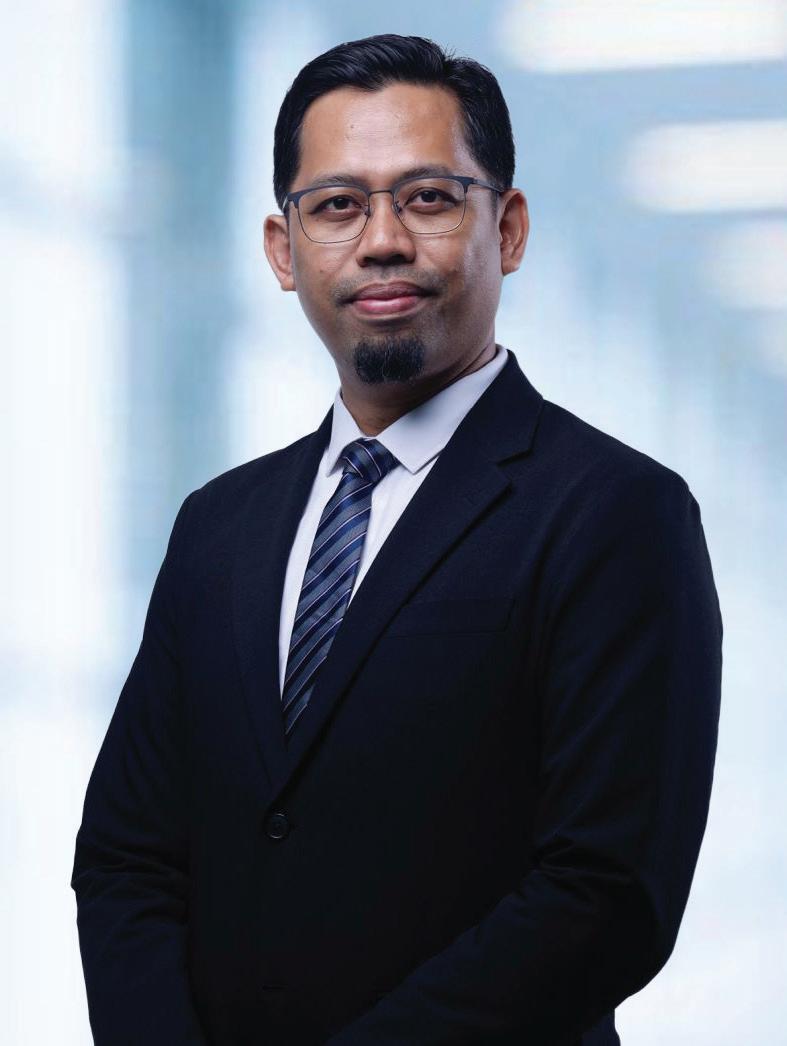
Faculty of Electrical Engineering Universiti Teknologi Malaysia (UTM)
Professor Ir Ts Dr Ahmad ‘Athif Mohd Fauzi FASc
Professor Ir Dr Huang Yuk Feng FASc’s research focuses on the optimisation and management of water resources, the integration of artificial intelligence modelling with climate change studies, stormwater management, rainfall prediction, and environmental impact studies. He has published 130 journal articles and accumulated 4,714 citations with an h-index of 38. Professor Huang has significantly influenced national policies and industry practices through over 20 consultancy projects for government agencies. His research on climate change and rainwater harvesting has directly shaped national climate change reports (NC3, NC4, NDC2.0 & NDC3.0) submitted to the UN Framework Convention on Climate Change (UNFCCC), driving the nationwide implementation of rainwater harvesting systems. His international recognition has led to collaborations with researchers from topranking universities, including the National University of Singapore, United Arab Emirates University, and Tianjin University.
Under his leadership as Chairperson of the Research Centre for Disaster Risk Reduction, UTAR successfully represented Malaysia in the KOBE University UNESCO Chair programme on Gender, Vulnerability, and Well-being in Disaster Risk Reduction Support. Subsequently, he was appointed as the country panel to lead the social welfare activities conducted in Malaysia and, later, organised the International Conference of Civil and Environmental Engineering 2018 (ICCEE 2018), bringing together over 100 speakers globally. His outstanding contributions to research and innovation have earned him the Top Three Researchers in the ‘National Champion for ASEAN’ by Frontiers Planet Prize, and he was awarded UTAR’s Best Researcher in 2022.
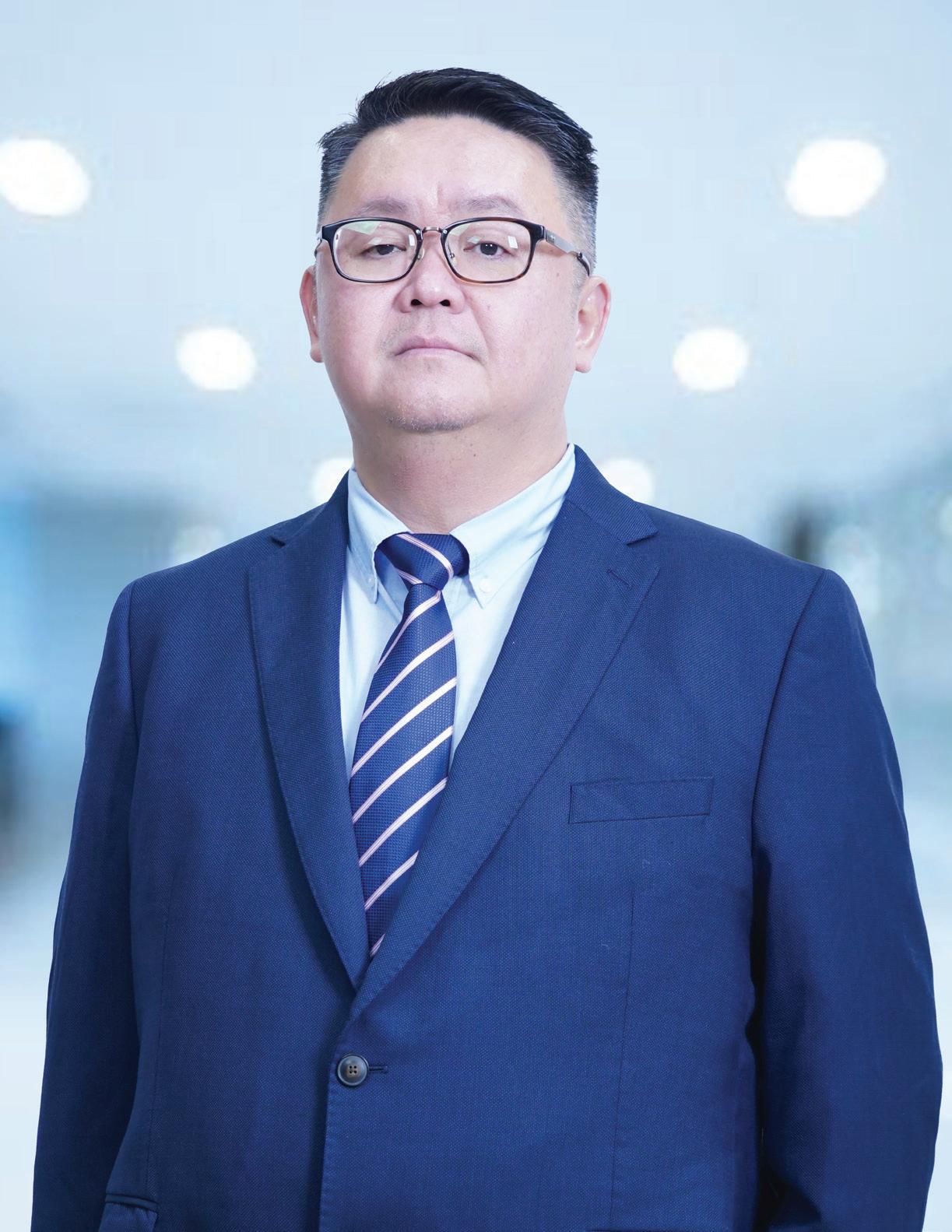
Professor Ir Dr Huang Yuk Feng FASc
Lee Kong Chian Faculty of Engineering and Science Universiti Tunku Abdul Rahman (UTAR)
Faculty of Chemical and Energy Engineering
Universiti Teknologi Malaysia (UTM)
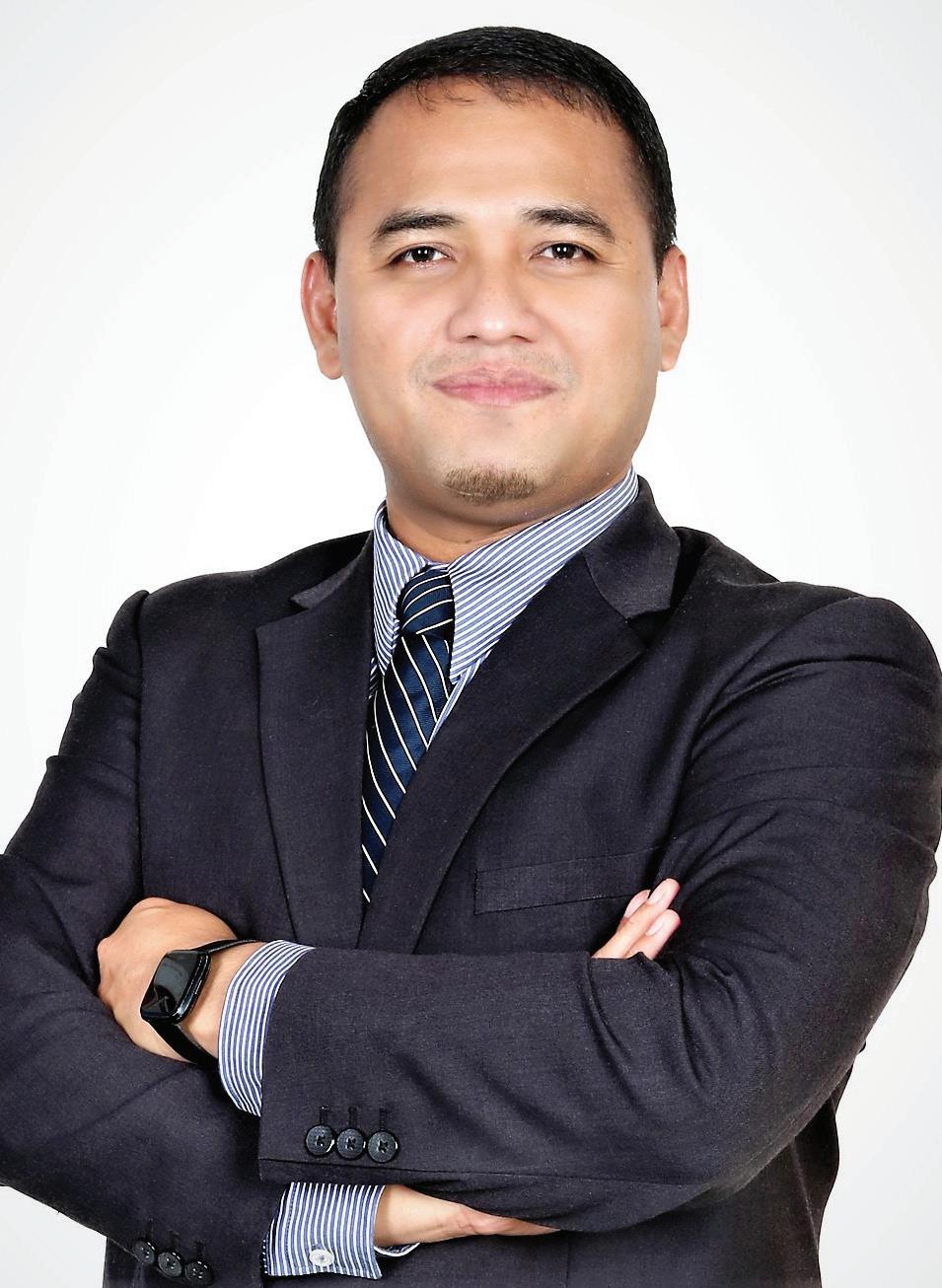
Professor Ts Dr Mohd Hafiz Dzarfan Othman FASc specialises in fuel cell and membrane technology. He has published 621 papers, accumulated 22,644 citations, and achieved an h-index of 78. He founded Filt Us Sdn. Bhd., a spin-off company that developed JerneH2O, a lightweight filtration straw that purifies 4,000 litres of water. This innovation provides safe drinking water during disasters such as floods and serves travellers, military personnel, and hikers in remote areas.
He has led transformative projects with UMW Sdn. Bhd., PETRONAS, and the National Hydraulic Research Institute of Malaysia (NAHRIM), including innovations in industrial wastewater reclamation, lowcost seawater desalination, hydrogen production from reclaimed water, and self-cleaning photocatalytic membranes for pollutant degradation. In collaboration with the Ministry of Higher Education and the Ministry
of Education, he contributed to expanding clean water access through a desalination plant serving over 3,000 residents in Pantai Senok, Kelantan, and the installation of ultrafiltration reverse osmosis systems in 53 rural schools.
Professor Hafiz holds 10 granted patents and earned prestigious awards like the Promising Academician Award in the National Academic Awards 2022, and is ranked among the Top 2% Scientists Worldwide by Stanford University from 2020 to the present. He has actively contributed to ASM as a YSN-ASM member, where he was appointed Secretary General in 20202021 and Chair of the National Science Challenge in 2018, as well as an ASM Associate through ASM Southern Chapter programmes.
Professor Ts Dr Mohd Hafiz Dzarfan Othman FASc
Professor Dr Abdullah Mohd Zin FASc specialises in computer science, with expertise in the art and science of programming, the use of formal methods in software development, and software and platform technology. He has played a pivotal role in national capacity-building within the IT domain, contributing significantly to academic leadership, curriculum development, and research advancement.
During his tenure at UKM, he served as Dean of the Faculty of Information Science and Technology and was a member of the research committee involved in developing UKM into a research university. He was also instrumental in the establishment of Open University Malaysia (OUM) from 2000 to 2004, serving as the inaugural Dean of the Faculty of Information Technology and Multimedia Communication.
As a panel member for the Future Leaders Fellowships scheme under UKRI, he mentored early-career researchers, guiding them in their development as future leaders in science. He was invited to evaluate academic programmes and contribute to quality assurance as an external assessor at the Bahrain University of Applied Science.
Professor Abdullah also collaborated on research initiatives with the United Nations University, the Institute of Software Technology in Macau, and various institutions in Japan, fostering strong global research partnerships. His expertise in ICT policies and strategies led to his involvement in national committees overseeing computing programme standards for the Malaysian Qualifications Agency (MQA). These standards have significantly enhanced the quality of computing graduates in Malaysia, ensuring they meet industry and academic expectations.
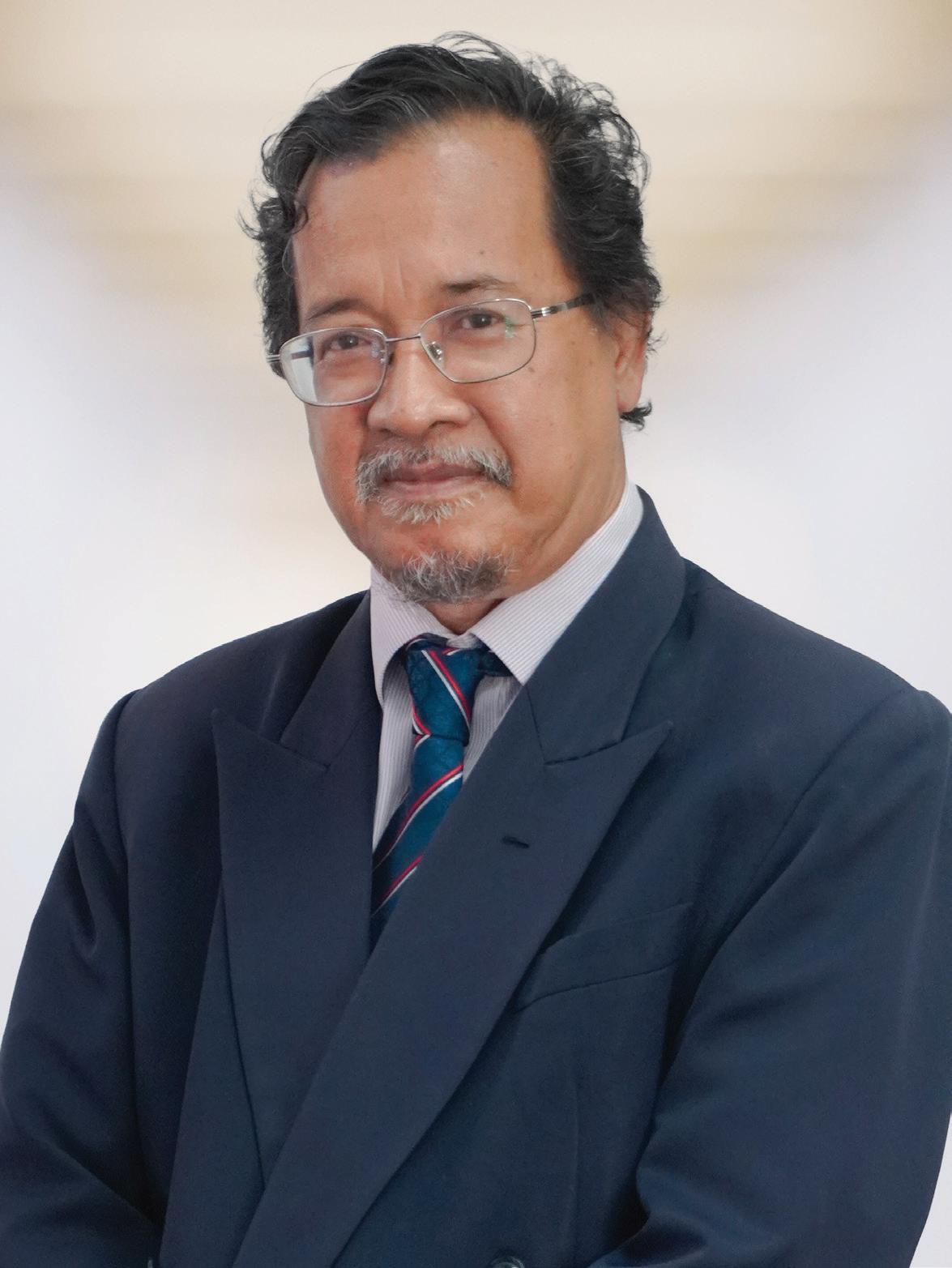
Faculty of Computer Science and Information Technology
Al-Madinah International University, Kuala Lumpur
Professor Dr Abdullah
Mohd Zin FASc
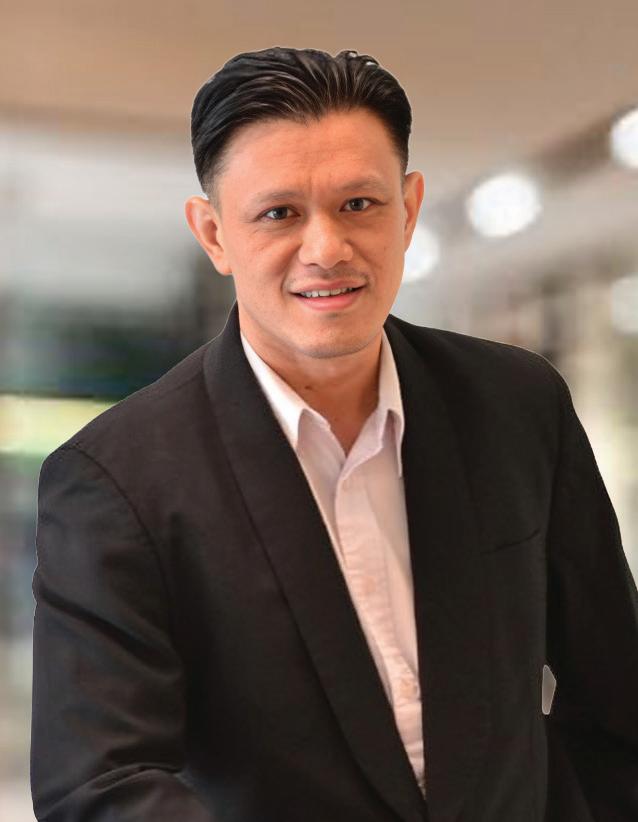
Faculty of Artificial Intelligence and Engineering
Multimedia University (MMU)
Professor Ts Dr Mardeni Roslee FASc is an expert in the field of wireless communication, D2D, V2V, UAV, artificial intelligence (AI), Internet of Things (IoT) and radar communication. He has played a key role in enhancing palm oil growth through technological innovation by developing a 5G IoT precision agriculture monitoring system in Malaysia.
Across academic administration and professional associations, he served as Deputy Director of the Research Management Centre at Multimedia University (MMU) in 2020 and Deputy Director of the Research Institute of Digital Connectivity in 2019. He was elected Chairman of the IEEE Communications Society/Vehicular Technology Society (COM-VT) Malaysia Chapter in 2019. He is also a chartered engineer registered with the Engineering Council of the United Kingdom and a senior member of the Institute of Electrical and Electronics Engineers (IEEE). He is among the pioneers in wireless communications, with his contributions recognised by several countries. Additionally, he has been actively involved in local and international industry consultations, working with companies and organisations in Libya, Bangladesh, South Korea, as well as local entities such as Telekom Malaysia and Celcom, among others.
Professor Mardeni has also shared his vision in telecommunication-related fields through keynote speeches at international conferences in countries such as Thailand, China, the UK, and others. In 2023, Malaysia’s Ministry of Higher Education appointed him as a member of the national panel and external auditor for the Malaysia Research Assessment (MyRA). A recipient of the 2020 TRSM, he has earned over 90 local and international research awards through his contributions to engineering over the years.
Centre for Wireless Technology, Centre for Excellence
Professor Ts Dr Mardeni Roslee FASc
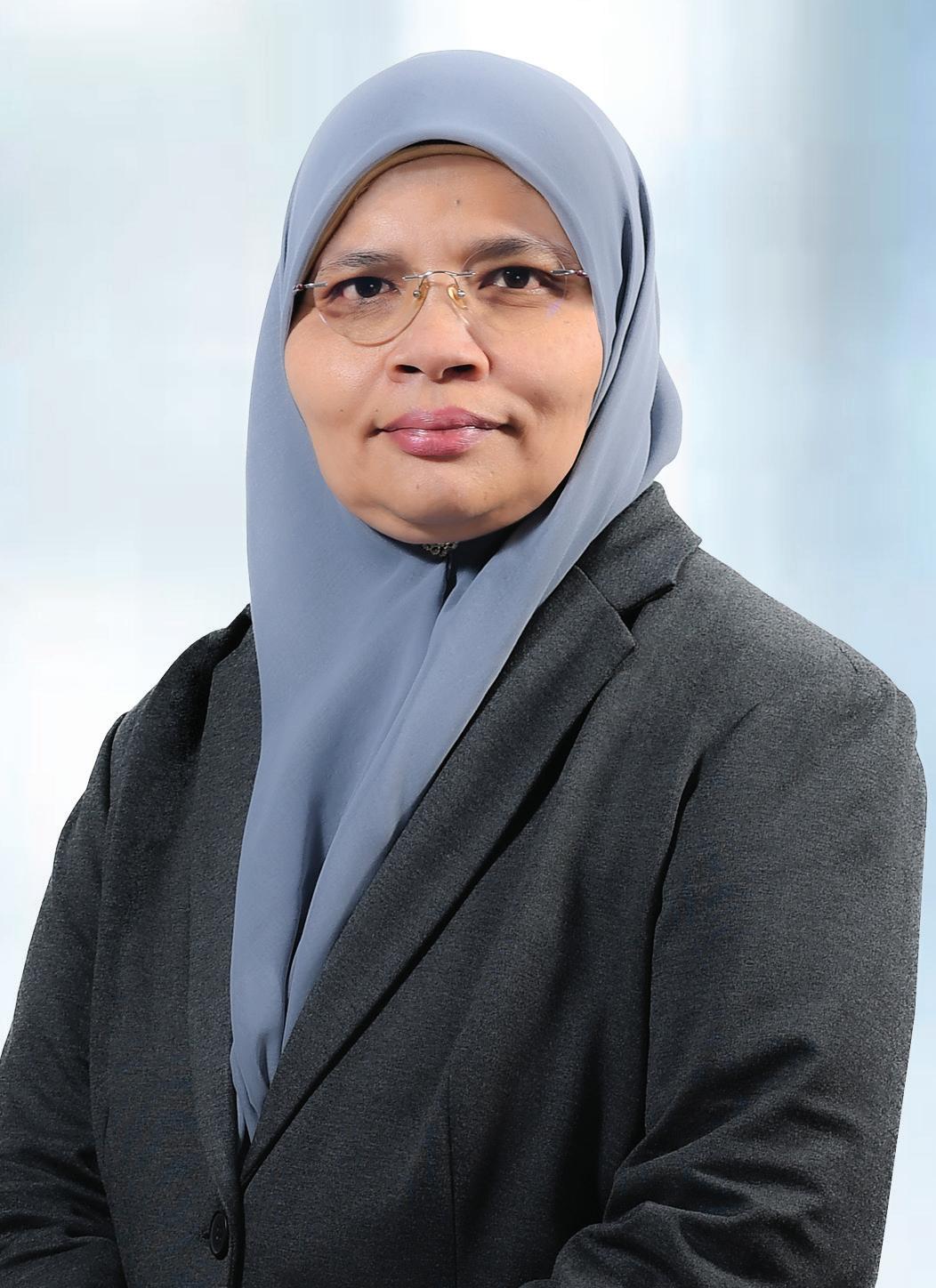
Professor Ts Dr Rabiah Ahmad FASc
Deputy Vice-Chancellor (Research & Innovation)
Faculty
of Engineering Technology
Universiti Tun Hussein Onn Malaysia (UTHM)
Professor Ts Dr Rabiah Ahmad FASc specialises in information security management systems (ISMS), risk analysis, insider threats, authentication, and trusted computing. Throughout her career, she has published extensively on information security and cyber-physical systems in both national and international journals. Her publication record includes 4,163 citations and an h-index of 30. She played a pivotal role in establishing Malaysia’s first Master’s Programme in Information Security UTM, serving as the programme coordinator since its inception. In 2023, she contributed to the formulation of the Autonomous Rapid Transit Cybersecurity Policy and the Phase 1 Cybersecurity Policy for the Kuching Urban Transportation System Project.
She was appointed as an expert panel responsible for developing the Global Accredited Cybersecurity Education (GLOBAL ACE) programme. Her contributions included shaping the Knowledge, Skills, and Attitudes (KSA) framework for the Cybersecurity Certification Program. Initially designed for Malaysia, this programme quickly gained traction and is now in high demand across Organisation of Islamic Cooperation (OIC) member states. In addition to her work with GLOBAL ACE, she played a pivotal role in developing an Information Security Encyclopedia, where she introduced key cybersecurity terminologies in the Malay language.
Professor Rabiah is also a respected professional member of the OIC-Computer Emergency Response Team (OIC-CERT). She has contributed significantly to the creation of the OIC-CERT Journal of Cyber Security, which fosters global knowledge sharing and collaboration among cybersecurity professionals.
Professor Dr Chan Wah Kheong FASc is an expert in metabolic dysfunctionassociated fatty liver disease (MAFLD). He described the two-step approach in the non-invasive assessment of liver fibrosis in MAFLD, which has become the foundation for a simple assessment and referral pathway for the disease in national and international guidelines. He is recognised as one of the Top 2% Scientists in the world in 2023 and 2024, with an h-index of 46 and 14,200 citations.
Professor Chan is a regular speaker at national and international conferences, including the Annual Scientific Meeting of the Malaysian Society of Gastroenterology and Hepatology (MSGH), the Annual Meeting of the Asian Pacific Association for the Study of the Liver (APASL), and the Asian Pacific Digestive Week (APDW). He is the lead author of the MSGH Consensus Statements on MAFLD and a contributor to the section on MAFLD in the 6th Edition of the Clinical Practice Guidelines on the Management of Type 2 Diabetes Mellitus for Malaysia. His work was cited in an Economist Intelligence Unit report, and Malaysia is recognised as one of the first few countries in the world to incorporate an assessment of MAFLD in its diabetes guidelines.
Professor Chan serves on the National Training Committee for Gastroenterology and Hepatology and is actively involved in training local and overseas Fellows in gastroenterology and hepatology, as well as advanced therapeutic endoscopy.
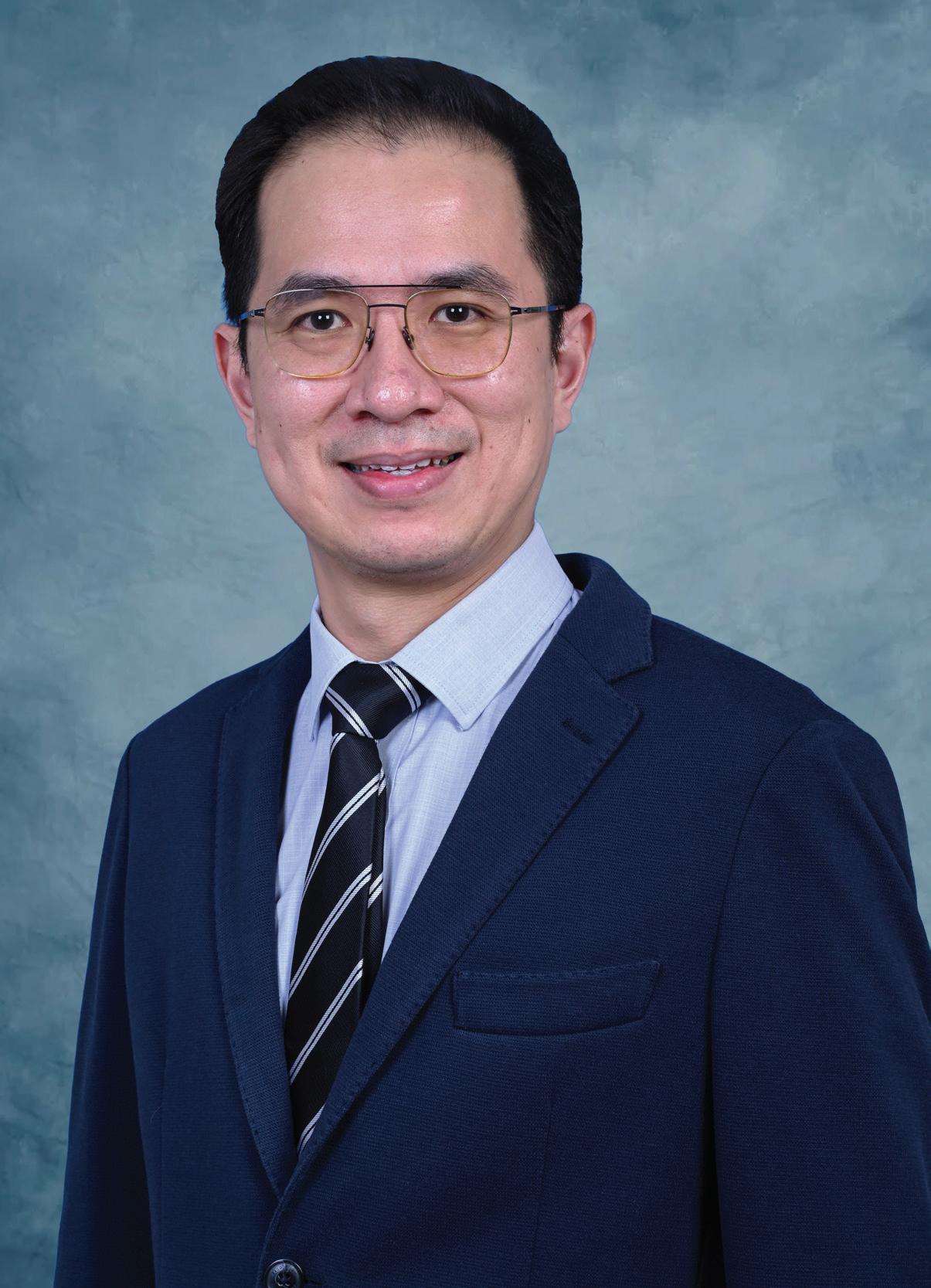
Faculty of Medicine
Professor Dr Chan Wah Kheong FASc
Universiti Malaya (UM)
Professor Dr Dharmendra Ganesan FASc is a neurosurgeon recognised for his expertise in cervical disc replacement surgery. He subspecialises in paediatric neurosurgery and spinal neurosurgery. His research contributions are noteworthy, particularly the study of serum biomarkers in grading traumatic brain injuries, which holds promise for improving emergency care globally. He has 59 publications, with a Web of Science H-index of 12 and 929 citations. He has published a novel retrospective questionnaire to assess outcomes after the lumbar degenerative intervention, allowing resource-limited developing countries to report their surgical outcomes. This tool would allow developing countries to share their surgical outcomes for degenerative spinal disorders without having to collect prospective data, which has always been an issue due lack of resources.
Dr Dharmendra developed the paediatric neurosurgery subspecialty and was instrumental in setting up the dedicated multidisciplinary paediatric craniofacial service at UM. He also pioneered the use of intraoperative MRI (iMRI) at UM to aid in achieving better resection of paediatric cranial tumours with better resection margins and clinical outcomes.
He has conducted both basic and advanced cervical arthroplasty courses throughout Malaysia and Asia. He is also a teaching faculty member of the Asian Australasian Society of Paediatric Neurosurgery (AASPN). He is a member of the Conjoint Speciality Committee of Neurosurgery and a panel of examiners of the Conjoint Master’s in Neurosurgical exam in Malaysia. He is also a member of the Surgical Speciality Board (SSB) in Neurosurgery, Royal College of Surgeons of Edinburgh, UK.
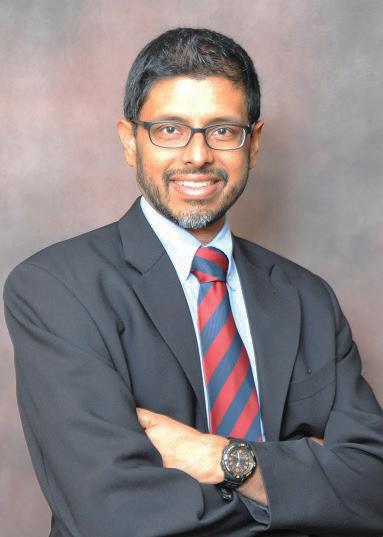
Professor Dr Dharmendra Ganesan FASc
Faculty of Medicine
Universiti Malaya (UM)
Professor Dr Leong Chee Onn FASc
Founder & Chief Executive Officer AGTC Genomics
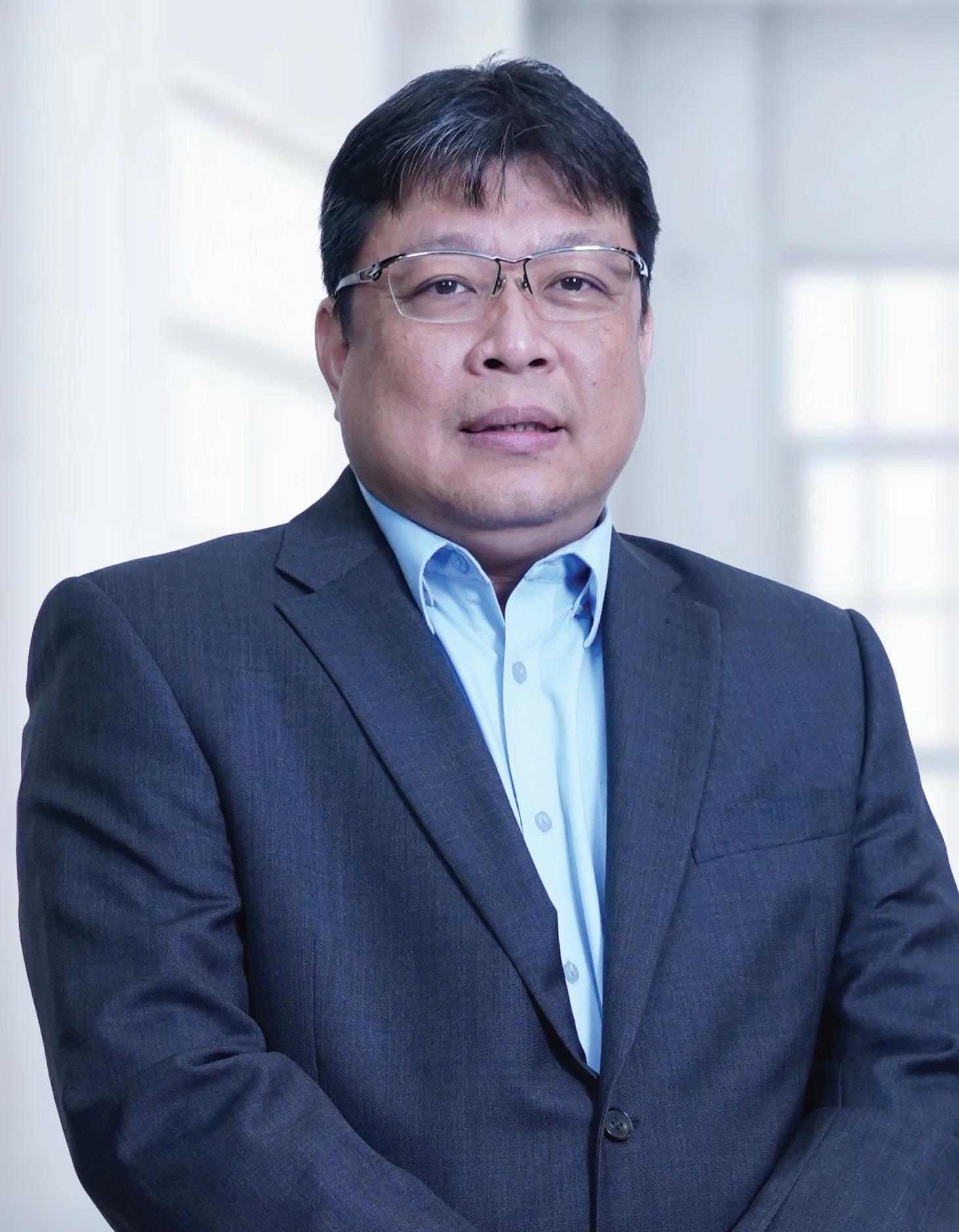
Professor Dr Leong Chee Onn FASc has successfully translated advanced genomic research into commercial diagnostics, including multi-cancer early detection tests and personalised oncology panels. His work on nasopharyngeal carcinoma (NPC) has enabled the development of regionspecific biomarkers, improving treatment options for underserved populations.
Professor Leong was part of the first group to define five major subtypes of breast cancer and led the identification of the basal-like breast cancer subtype, which has informed better treatment strategies. He published over 100 high-impact publications and has patents in cancer biology, genomics, and drug discovery. His Google Scholar h-index is 43, with 8,115 citations. He developed and patented methods for assessing responsiveness to cisplatin treatment in the US and commercialised the first multi-cancer early detection (MCED) test in Malaysia. He has received numerous awards, including Precision Medicine
Solution of the Year in the Asia-Pacific (2024), the Malaysia Technology Excellence Awards (2023), and the Shanghai International Prestige Business Awards (2022).
He has fostered collaborative partnerships with hospitals and research institutes, introducing technologies like next-generation sequencing (NGS), digital pathology, and telemedicine platforms. These initiatives have enhanced diagnostic capacity, reduced patient wait times, and expanded access to precision medicine across Malaysia and beyond. At ASM, Professor Leong was elected Chair of the Science Policy in YSN-ASM. He also served as a committee member for the Science Outlook 2015, influencing the development of Malaysia’s scientific landscape.
Professor Dr Muhammad Yazid Jalaludin FASc is an expert in paediatric endocrinology, with a focus on childhood obesity, diabetes, and rare endocrine disorders. He pioneered advanced treatments like growth hormone therapy for Prader-Willi syndrome and Increlex for Laron syndrome in Southeast Asia, setting new standards in specialised paediatric care. He has authored over 100 articles, including two influential publications in the New England Journal of Medicine focused on paediatric obesity and type 2 diabetes. His Google Scholar h-index is 29, with 2,885 citations.
He has led groundbreaking clinical trials on novel treatments for childhood obesity and diabetes, generating critical data that has informed targeted paediatric therapies. His expertise is recognised globally through advisory roles in international research collaborations, including with leading pharmaceutical companies such as Novo Nordisk and MSD. Nationally, he serves as Chairman of the Specialty Committee (Evaluation) for General Paediatrics under the Malaysian Medical Council (2024–2026), and holds key positions in several health policy initiatives, such as the National Nutrition Action Plan (2026–2030), the National Strategic Plan for the Prevention and Control of Anaemia (2024–2030), and the National Strategic Plan for Child Health (2021–2030).
Professor Yazid has received numerous awards throughout his career, including the Outstanding Asian Paediatrician Award, which was presented in Cebu, Philippines, during the Asia Pacific Congress of Paediatrics 2024.
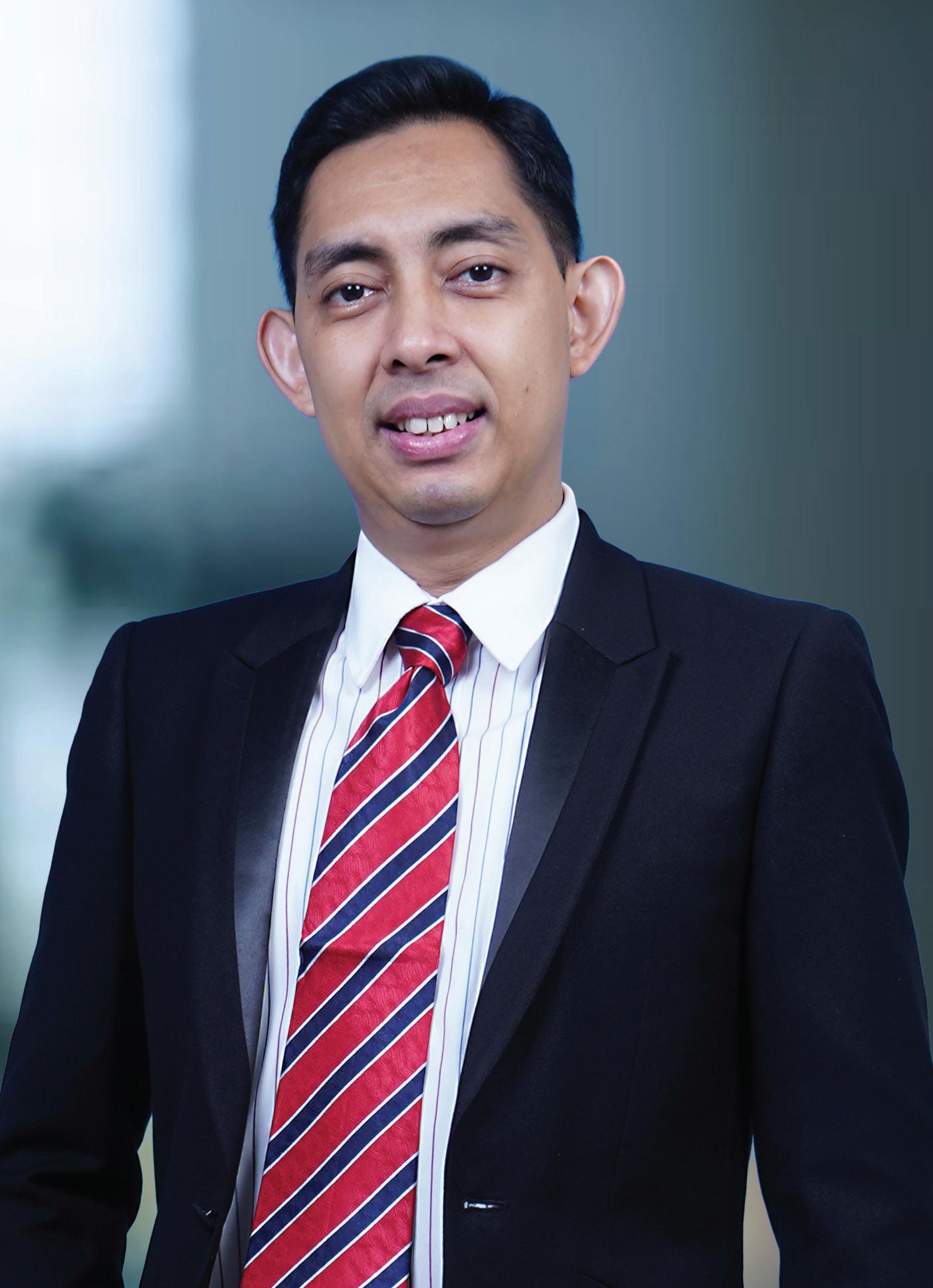
Faculty of Medicine
Universiti Malaya (UM)
Professor Dr Muhammad Yazid Jalaludin FASc
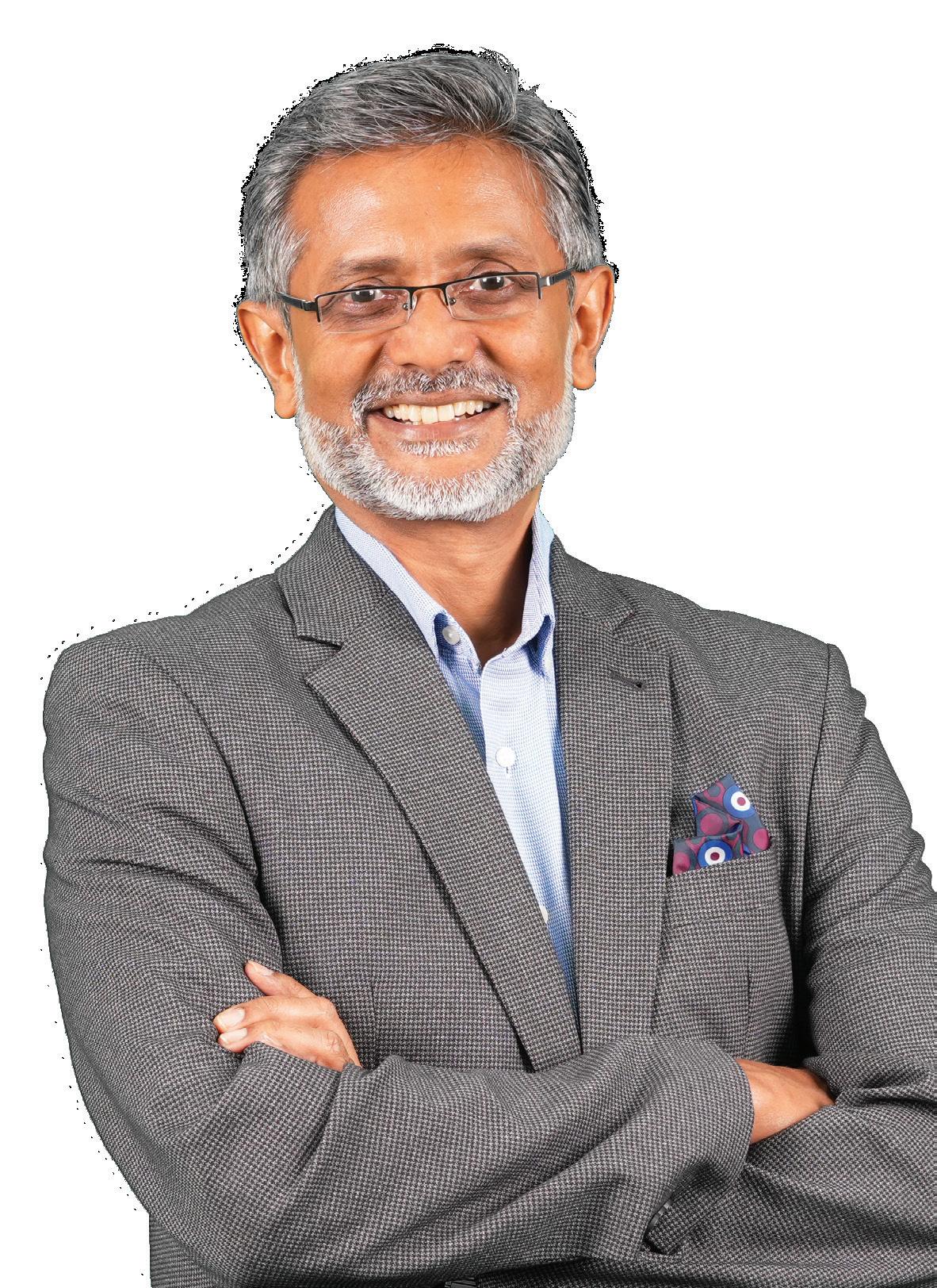
Professor Dr Sanjiv Mahadeva FASc
Faculty of Medicine
Universiti Malaya (UM)
Professor Dr Sanjiv Mahadeva FASc is currently the leading expert in both academic and clinical gastroenterology in Malaysia. His contributions include the organisation of numerous international advanced GI endoscopy and gastroenterology courses, as well as personally training gastroenterologists in Malaysia and Southeast Asia over the last 20 years. As an expert in advanced therapeutic GI endoscopy, he has introduced several novel endoscopic procedures in Malaysia, such as endoscopic submucosal dissection (ESD) and per-oral endoscopic myotomy (POEM).
As a researcher, he has published over 210 scientific manuscripts, with an H-index of 51 and 10,820 citations. Many of his articles have been published in top-ranked academic journals, including The Lancet, Lancet Gastroenterology & Hepatology, Gut, and the American Journal of Gastroenterology. His academic work has led to various international collaborations and the development of both national and international clinical practice guidelines in gastroenterology. He has served as an editor and editorial board member for several peer-reviewed international scientific journals, including Alimentary Pharmacology & Therapeutics, Journal of Gastroenterology and Hepatology, JGH Open, and PLOS ONE.
Professor Sanjiv has played a leadership role in national and international learned societies and has been an invited speaker at over 20 local and international conferences in the past 20 years. He has received several awards in recognition of his contribution to the field. Recently, he has been recognised as one of the Top 2% Scientists in the world by Stanford University from 2022 to 2024.
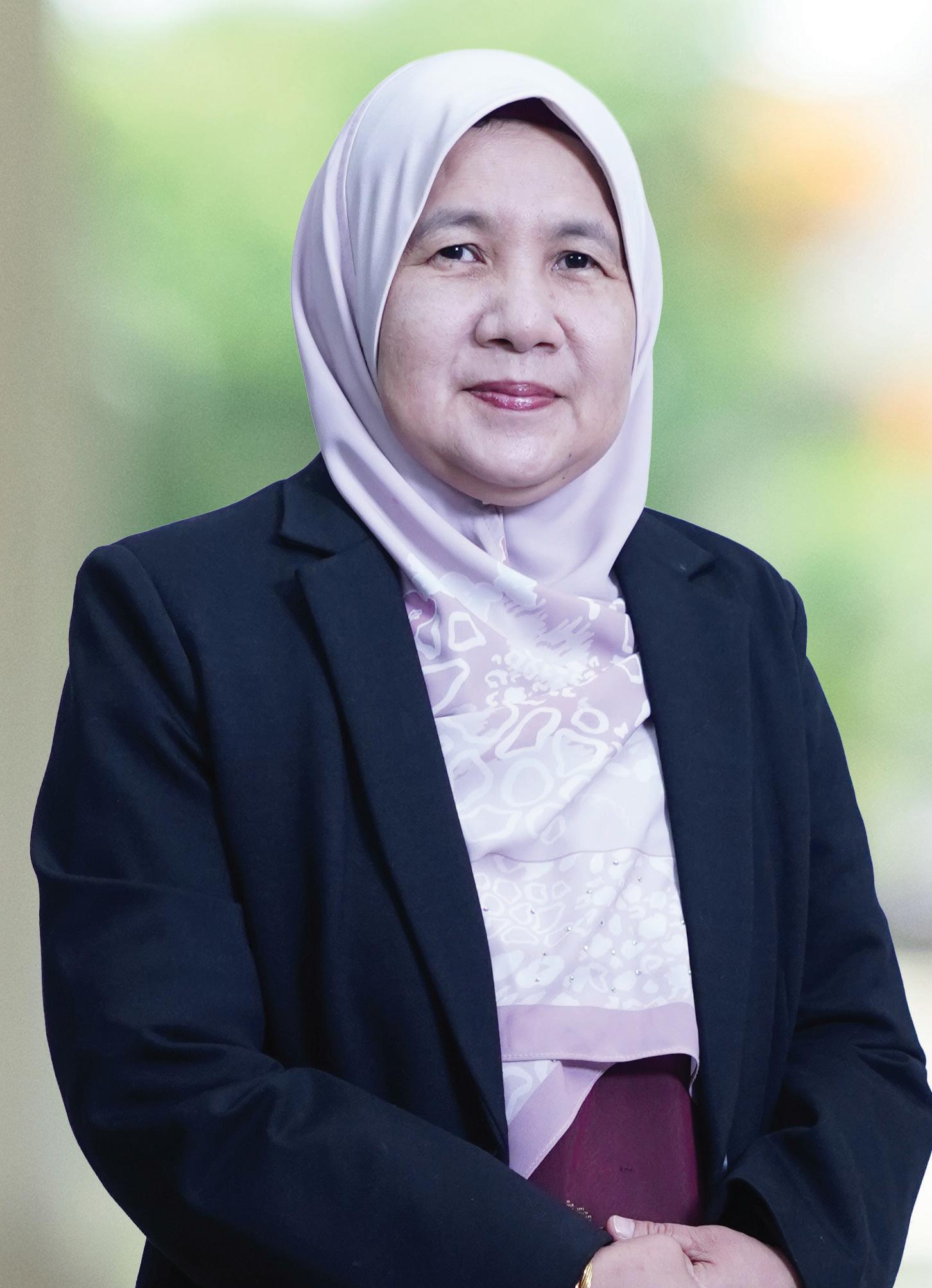
Professor Dr Suzana Shahar FASc
Dean Faculty of Health Sciences
Universiti Kebangsaan Malaysia (UKM)
Professor Dr Suzana Shahar FASc is an expert in ageing, geriatric nutrition and epidemiology. Her research outcomes have contributed to advancing scientific knowledge and innovation in the fields of ageing and nutrition. She has published more than 200 scientific journal articles, and her Google Scholar h-index is 57, with 10,619 citations.
She successfully led the nationwide Neuroprotective Model for Healthy Longevity among Malaysian Elderly (LRGS TUA) project, the development of Salt Reduction Policy for Malaysia under the Newton Impact Fund Scheme, the National Kesum initiative, and is currently leading the MyAgeless Trial. She is working closely with local policymakers, industries, and international experts to reformulate products identified as high in salt and to establish maximum salt targets for reformulation. She is also involved in key government committees, including the Ministry of Health Malaysia’s National Coordinating Committee on Food and Nutrition and the Disease Prevention Unit.
Professor Suzana’s work, pioneering a multidomain lifestyle approach to reduce the risk of dementia, has been recognised through invitations to speak in several countries in the region. This approach has also been highlighted as a key strategy for dementia prevention in the recently launched Dementia Action Plan for Malaysia. She has 35 innovations filed for copyright, trademark, or patent and two formulations for improving oxidative stress and cognitive function in the ageing population have been licensed and commercialised, i.e. TP 3 in 1 juice (a mixture of tropical juice) and Cosmos Caudatus (ulam raja) powder.
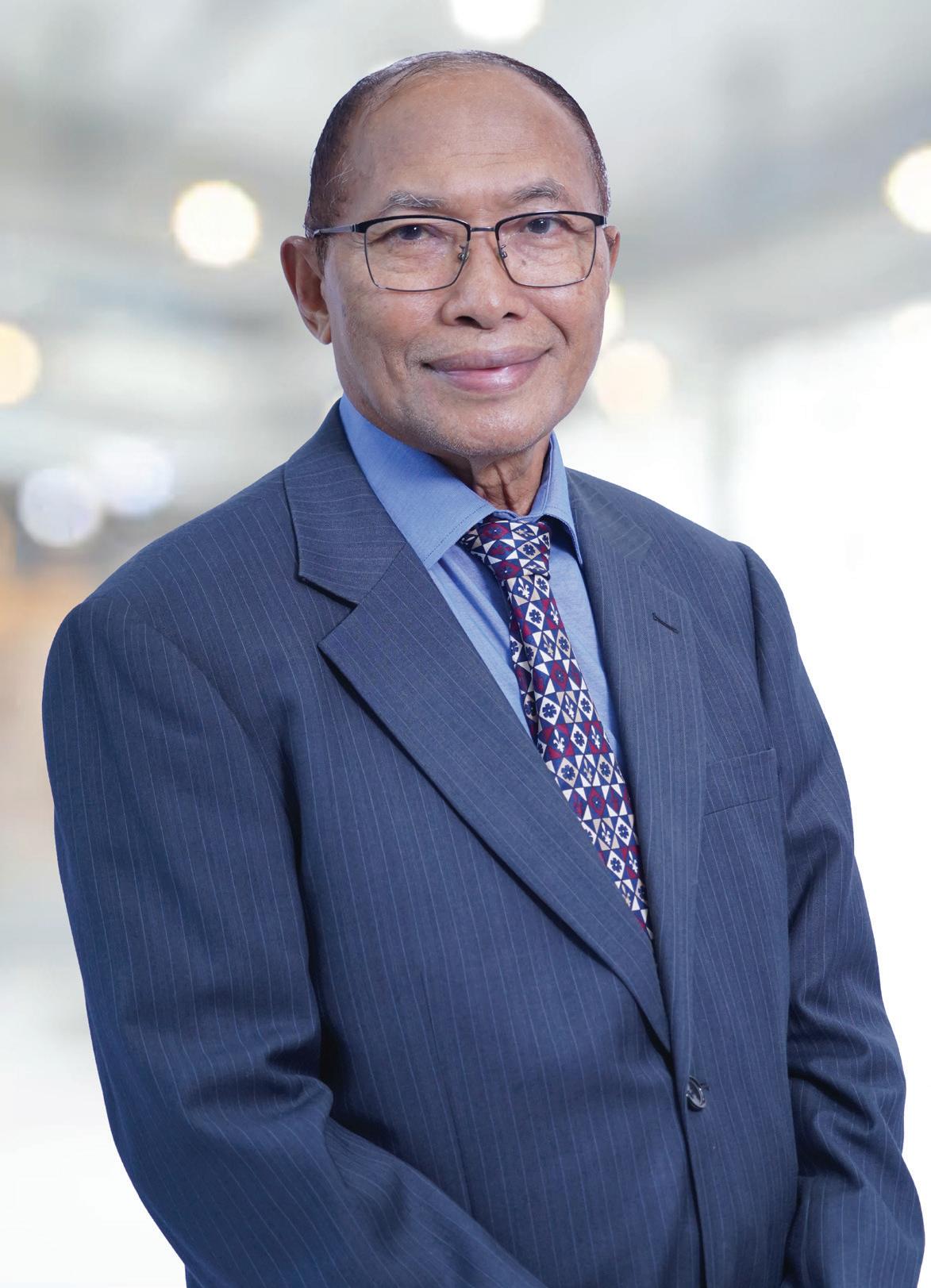
Professor Dr Azemi Samsuri FASc is an expert in rubber physics and technology and is recognised for his contribution in the field of rubber science. He has extensive experience spanning research, academia, and industry. With a strong commitment to advancing rubber technology, he has been instrumental in innovative research programmes, industrial consultancy, and the development of technical standards at both national and international levels. He has made significant contributions to the understanding and enhancement of natural and synthetic rubber compounds.
His extensive research encompasses areas such as polymer science, elastomers, and polymer processing. Notably, he co-authored a study on the crack growth rates of rubber vulcanizates, providing valuable insights into the durability of rubber materials. He has authored several books that delve into the mechanical properties of natural rubber and its applications, rubber strength, durability, and degradation. His work has resulted in numerous publications, including refereed journal articles and conference papers. In addition to his research, he holds patents on graphenebased natural rubber latex, nanocarbonreinforced rubber, and improved NBR masterbatch, demonstrating his contributions to innovation in the field.
Beyond research and academia, Professor Azemi plays a pivotal role in strengthening Malaysia’s rubber industry. He currently serves as a consultant to the Malaysian Rubber Council, supporting the growth of Malaysia’s rubber product industry in the global market. He has also contributed to international technical standards as a member of the ISO/TC 45 Committee on Rubber and Rubber Products, ensuring Malaysia remains competitive in the global market.
Director Nas Almaidah Enterprise
Professor Dr Azemi Samsuri FASc
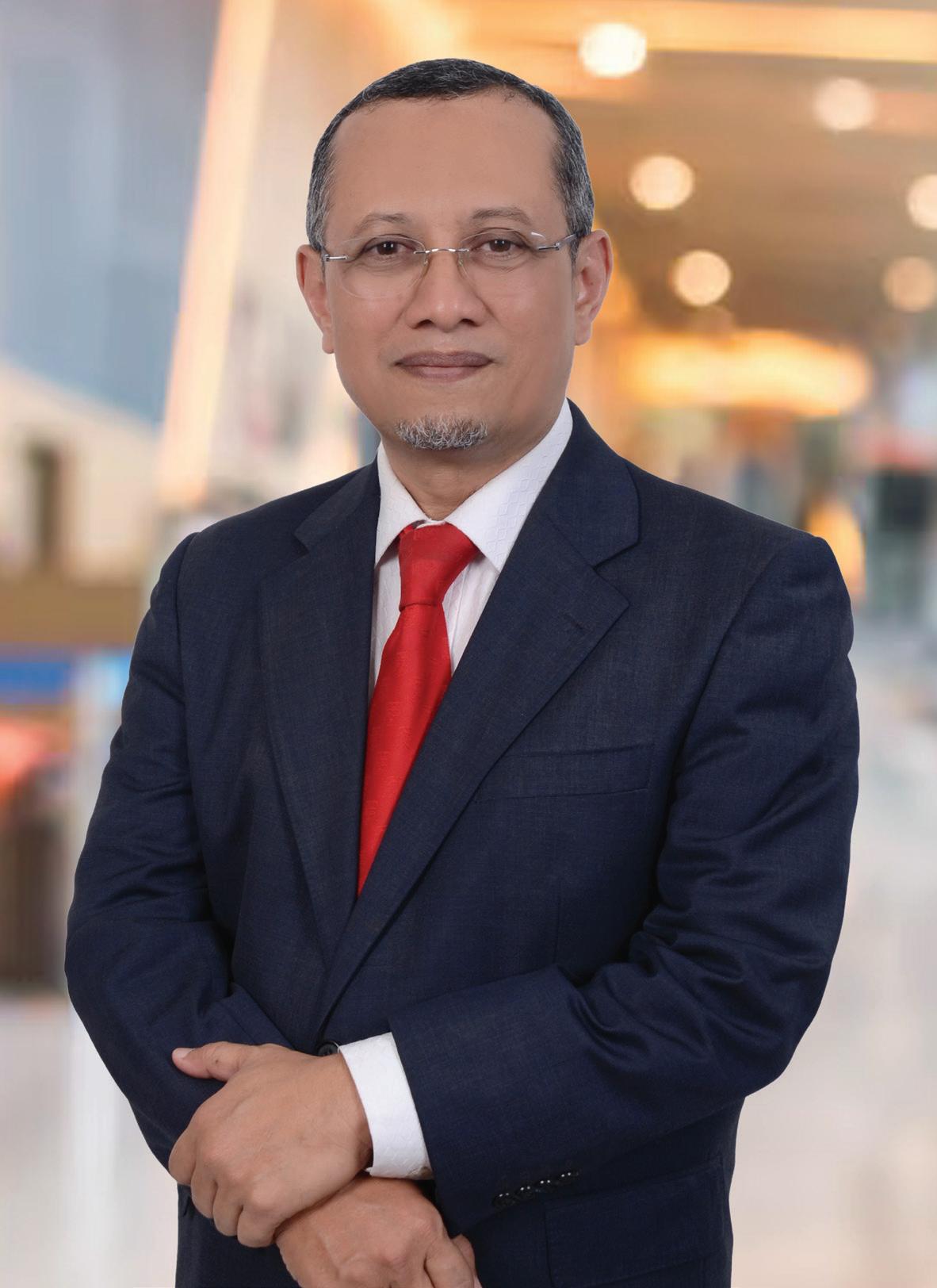
Ts Dr Khairul Naim Adham FASc
Deputy Undersecretary
Biodiversity and Forestry
Management Division
Ministry of Natural Resources and Environmental Sustainability (NRES)
Ts Dr Khairul Naim Adham FASc is an expert in bridging science and policy, particularly in the areas of sustainable consumption and production and biodiversity management. He has held strategic positions in several key ministries, including the Ministry of Housing and Local Government, the Ministry of Internal Security, and NRES.
Dr Khairul played a pioneering role in the development of Malaysia’s Government Green Procurement (GGP) policy framework in 2011. His leadership and technical expertise were instrumental in shaping the policy and guiding its implementation across the public sector. His contributions include Malaysia’s GGP Short-term Action Plan (2013) and the GGP Guidelines for Government Procurers (2014). His efforts have significantly advanced the integration of green practices within the government and industry, positioning GGP as a catalyst for sustainable development and environmental stewardship in Malaysia.
Dr Khairul has also made substantial contributions to the formulation of the National Policy on Biological Diversity 2022–2030 and the implementation of the Access to Biological Resources and Benefit Sharing Act 2017 [Act 795]. He has played a central role in leading major national biodiversity initiatives, including the Global Wildlife Programme Malaysia and the Ecological Fiscal Transfer for Biodiversity Conservation (EFT). He was involved in the development of Malaysia’s national biodiversity database (MyBIS) and the establishment of the Malaysia Biodiversity Centre (MBC) since 2015, making significant and ongoing contributions to both initiatives. Internationally, Dr Khairul has led the country’s negotiations at the UN Convention on Biological Diversity and its Protocols, and the High Seas Treaty, including those held in Canada (2022), Colombia (2024), and the USA (2025).
Ir Mohamed Firouz Asnan FASc is a distinguished leader in the energy industry, recognised for his significant contributions to Malaysia’s oil and gas sector. He has played a significant role in shaping exploration strategies, advancing sustainable energy initiatives, and fostering industry-academia collaboration. His leadership has been instrumental in revitalising the domestic upstream sector, introducing fiscal reforms, and leveraging new technologies to enhance exploration and production efficiency. Under his guidance, initiatives such as the PETRONAS myPROdataTM platform and basin studies have transformed Malaysia’s energy landscape. He was also pivotal in establishing the New Energy Business (now known as GENTARI), positioning PETRONAS for a sustainable energy future.
A key advocate for sustainable energy practices, he has spearheaded efforts to reduce greenhouse gas emissions and drive carbon capture initiatives. His leadership in the Kasawari Carbon Capture and
Storage (CCS) project demonstrated his commitment to reducing the industry’s carbon footprint. He has also led the development of the Sarawak Integrated Sour Gas Evacuation System (SISGES) and played a crucial role in implementing the ‘rigto-reef’ programme, an innovative approach to decommissioning that enhances marine biodiversity while repurposing obsolete offshore structures.
Ir Firouz’s global impact is evident through his role as Vice-Chair of the International Association of Oil & Gas Producers (IOGP), where he has been a key advocate for policies supporting the transition to a low-carbon future. As the Founding Chairman of PTV International Ventures Limited, he has driven investments in start-ups, fostering innovation in Malaysia’s energy sector. His experience, leadership, and commitment to sustainability position him as a key contributor to advancing Malaysia’s energy industry and aligning it with global energy transition goals.
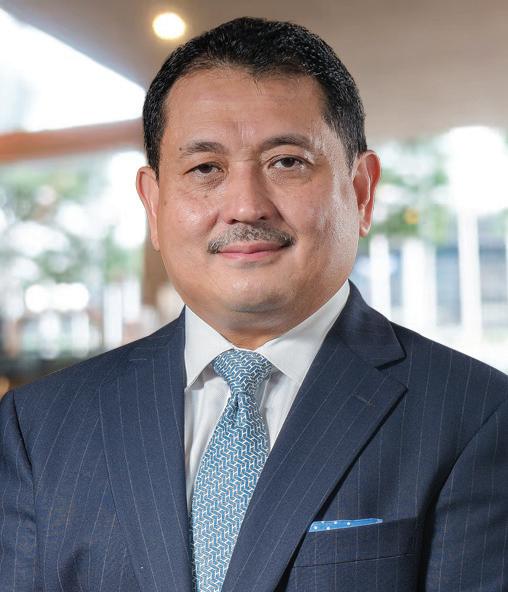
Ir Mohamed Firouz Asnan FASc
Director of Transformation Universiti Teknologi PETRONAS (UTP)
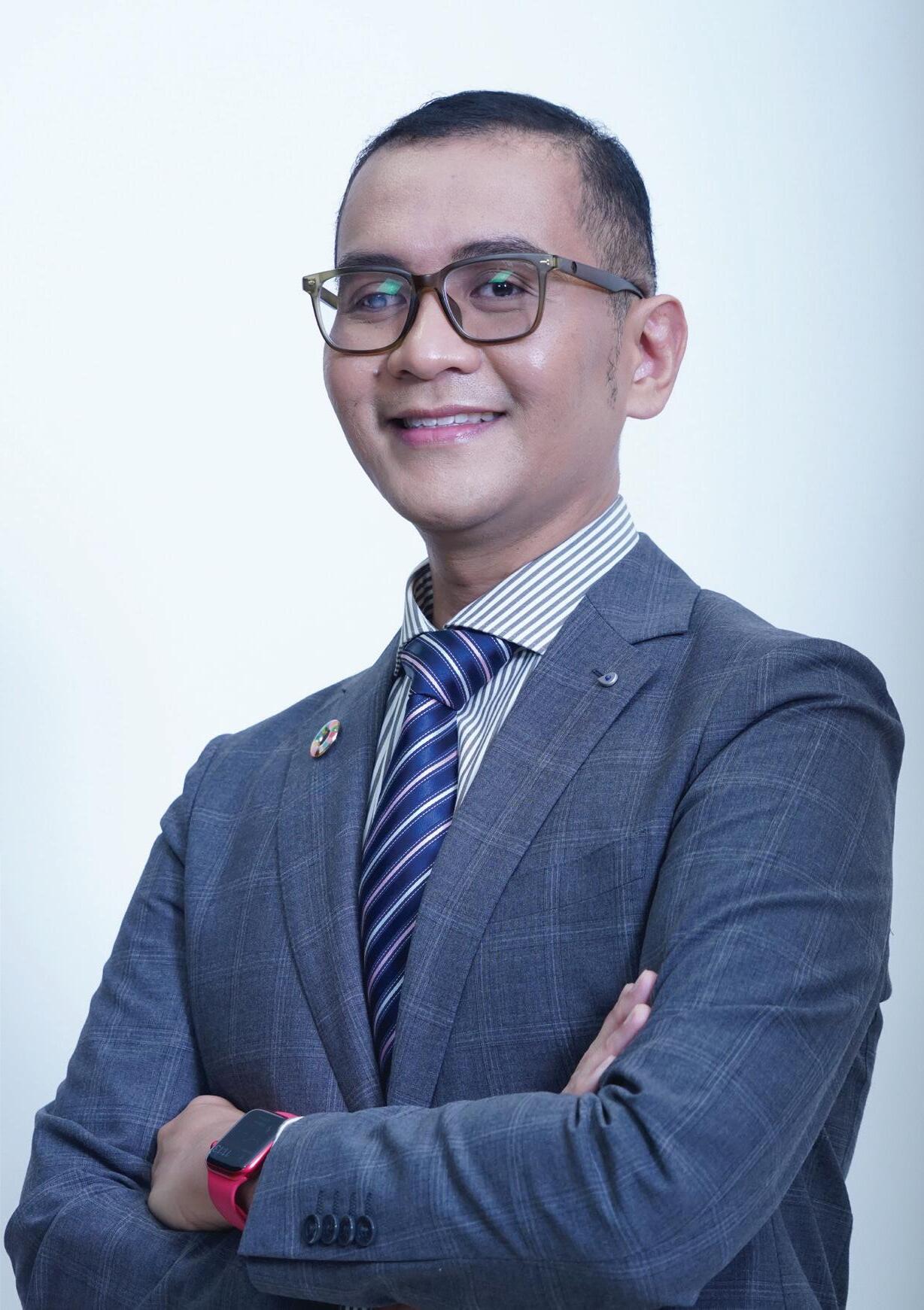
Ts Raja Shazrin Shah
Raja Ehsan Shah FASc
Managing
Director
Galaxy
Tech Solutions (KL) Sdn Bhd
Ts Raja Shazrin Shah Raja Ehsan Shah FASc is a recognised leader in sustainability and environmental management, with extensive expertise in corporate sustainability strategies, GHG quantification, carbon management, and environmental policy development. His significant contributions to integrating sustainability into both engineering and industrial practices have impacted Malaysia’s environmental landscape, benefiting academia and industry.
He played a pivotal role in assisting major industry players, such as Tenaga Nasional Berhad (TNB) and Petronas, in meeting stringent environmental and climate targets. He co-developed Malaysia’s country-specific emission factor for the electricity sector, which is now featured in the Intergovernmental Panel on Climate Change (IPCC) Emission Factor Database. His involvement in drafting key regulatory frameworks, such as the Green Industry Regulations, the Environmental Practitioners Act, and the National Green Industry Index has been crucial in shaping Malaysia’s environmental policies and ensuring their future legal integration.
A trusted advisor, his expertise is regularly sought by governmental and regulatory bodies, including the Department of Environment (DOE), Suruhanjaya Perkhidmatan Air Negara (SPAN), SME Corporation, Malaysian Green Technology and Climate Change Corporation (MGTC) and NRES. His work has influenced national policy and set international benchmarks, particularly through his leadership on the GHG baseline for Malaysia’s mining sector and the rare earth element business model. He developed environmental compliance tools for DOE and SPAN, including the Sistem Pemantauan Pematuhan Industri Hijau (SPPIH).
At ASM, Ts Raja Shazrin actively contributes to initiatives such as the National Planetary Health Action Plan, where he serves as a writer for the Values, Cultural and Behavioural Change Pillar and as a Working Group member for the Environment and Health Pillar.
Professor Ts Dr Rosnah Shamsudin FASc
Faculty of Agriculture
Universiti Putra Malaysia (UPM)
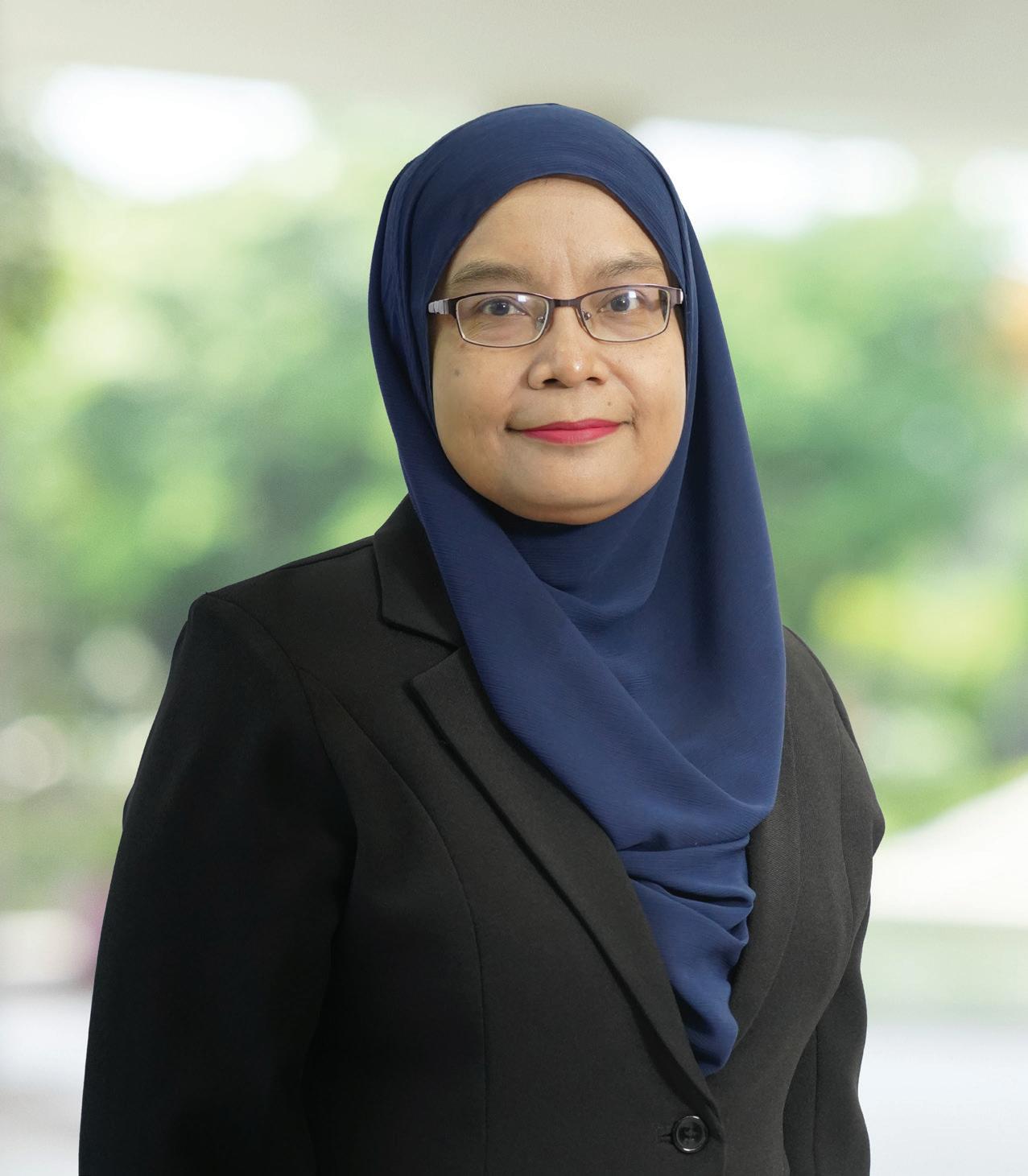
Professor Ts Dr Rosnah Shamsudin FASc is a leading expert in food engineering and processing, known for her impactful contributions to agricultural and food technology. Her innovations have significantly improved the efficiency, sustainability, and safety of food production, supporting both national and global food security goals. With expertise in optimising food processing techniques and designing advanced machinery, she holds multiple patents, including the Rotadisc, Pepper Peel- O-Matic, and Ezy Cooker, which have greatly benefited small to medium enterprises (SMEs) and the agricultural sector. Her research continues to drive advancements in sustainable food technology and innovation, and records an h-index of 23 and over 3,505 citations.
Her leadership in food engineering and her commitment to bridging academia with industry needs have significantly strengthened Malaysia’s position in the global food technology landscape. As a strong advocate for SMEs, Professor Rosnah actively shares
her insights with various groups, including women’s associations, food entrepreneurs, cooperatives, and youth organisations. She has created portable and affordable food processing machines that empower low-income families and small-scale producers, thus enhancing economic well-being and addressing rural development challenges.
She is often invited as visiting professor and keynote speaker at prominent conferences, such as the Korean Society for Agricultural Machinery Conference and Agricultural Equipment and Supplies International Workshop. With adjunct professorships at Hasanuddin University and visiting roles at Universitas Brawijaya and Universitas Andalas, she continues to influence the academic landscape.
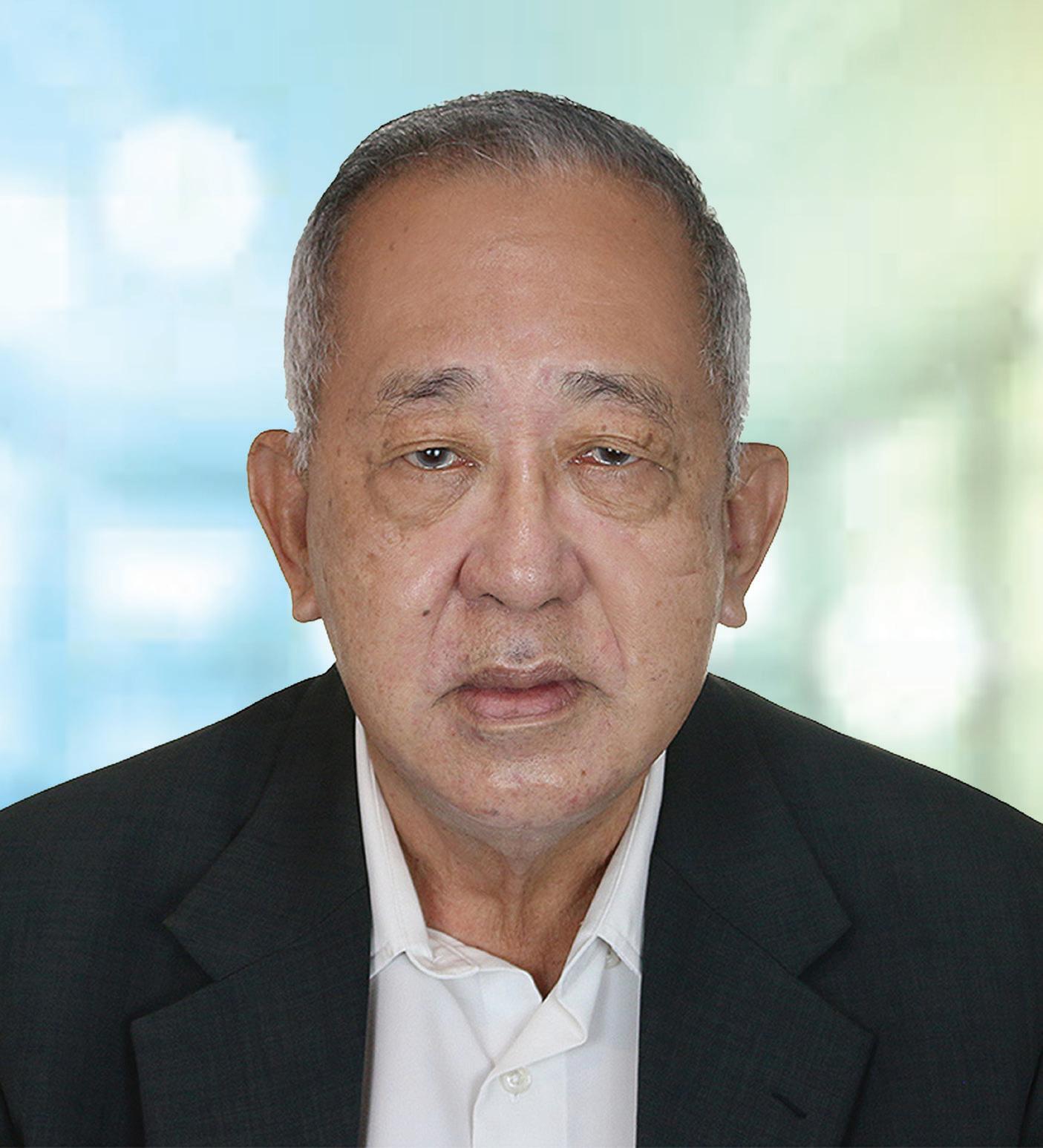
Dr Tioh Ngee Heng FASc is a distinguished expert in technology development, infrastructural engineering, chemical process evaluation, and soft ground treatment. He has an illustrious career spanning nearly 50 years in academia and entrepreneurship. He served as a lecturer, teaching inorganic chemistry and instrumental analysis at UM, and later as the Director of the Institute of Postgraduate Studies & Research at UTAR, where he taught biomedical instrumentation, chemistry for engineering, instrumental analysis, and chemical engineering topics.
He has been pivotal in advancing green, sustainable technologies for heavy construction over soft subgrades, ensuring both safety, time and costeffectiveness. His innovative solutions include patented ‘green’ technologies that incorporate waste materials, membrane-encased lightweight concrete panels, lightweight concrete buoyant systems using recycled materials, and segmental concrete barrier
Dr Tioh Ngee Heng FASc
Managing Director
CH Tech Global Sdn Bhd
units for use in infrastructure. His research has led to several patents in lightweight concrete solutions and sustainable construction techniques, with successful commercialisation generating industry interest.
Building on this success, Dr Tioh founded CH Tech Global Sdn. Bhd., focusing on soft-ground engineering using the bamboo-geotextile composite system. This technique offers a sustainable solution for soft grounds, including mangrove and peaty swamps. His expertise has also been sought after in national and international infrastructure projects, providing consultancy for government and private sector initiatives in sustainable construction. His innovative contributions to civil engineering and sustainable construction have earned him international recognition and several awards. Through his research, leadership, and entrepreneurial ventures, Dr Tioh continues to strengthen Malaysia’s position in the global technological landscape.
Professor Dr Abrizah Abdullah FASc brings over 25 years of distinguished service in the field of library and information science (LIS). She pioneered digital library research in Malaysia, laying the foundation for institutional repositories and advancing open access across academic libraries. She was pivotal in shaping Malaysia’s scholarly infrastructure and in the development of MyJurnal and MyCite.
With an h-index of 25, she is ranked first in LIS for Malaysia and among the top five in the social sciences nationally. Her research has significantly shaped the field of ‘library & information management’ as Malaysia’s highest-ranked QS subject, contributing to UM’s global top-30 status (2018–2025) in this field. Widely cited in core LIS literature, she is internationally recognised for her collaborations with renowned researchers from Europe, the USA, the UK, Australia, Russia, and China. Her role in the Harbingers project on early career researchers (ECRs) and scholarly reputation has further elevated Malaysia’s academic standing globally.
As an alliance member of the Malaysian Open Science Platform (MOSP), Professor Abrizah has played a key role in aligning Malaysia’s academic landscape with national strategic goals. She has served as a subject matter expert on national and international open science steering committees. She also led the feasibility study for the National Knowledge Infrastructure (NKI), supporting the Ministry of Higher Education (MOHE) and ASM’s vision for accessible, responsible, and impactful science. She served as dean of three faculties and initiated Planetary Health and ArtScience programmes at the Institute of Advanced Studies (IAS), closely aligning with ASM’s focus on interdisciplinary collaboration and public engagement.
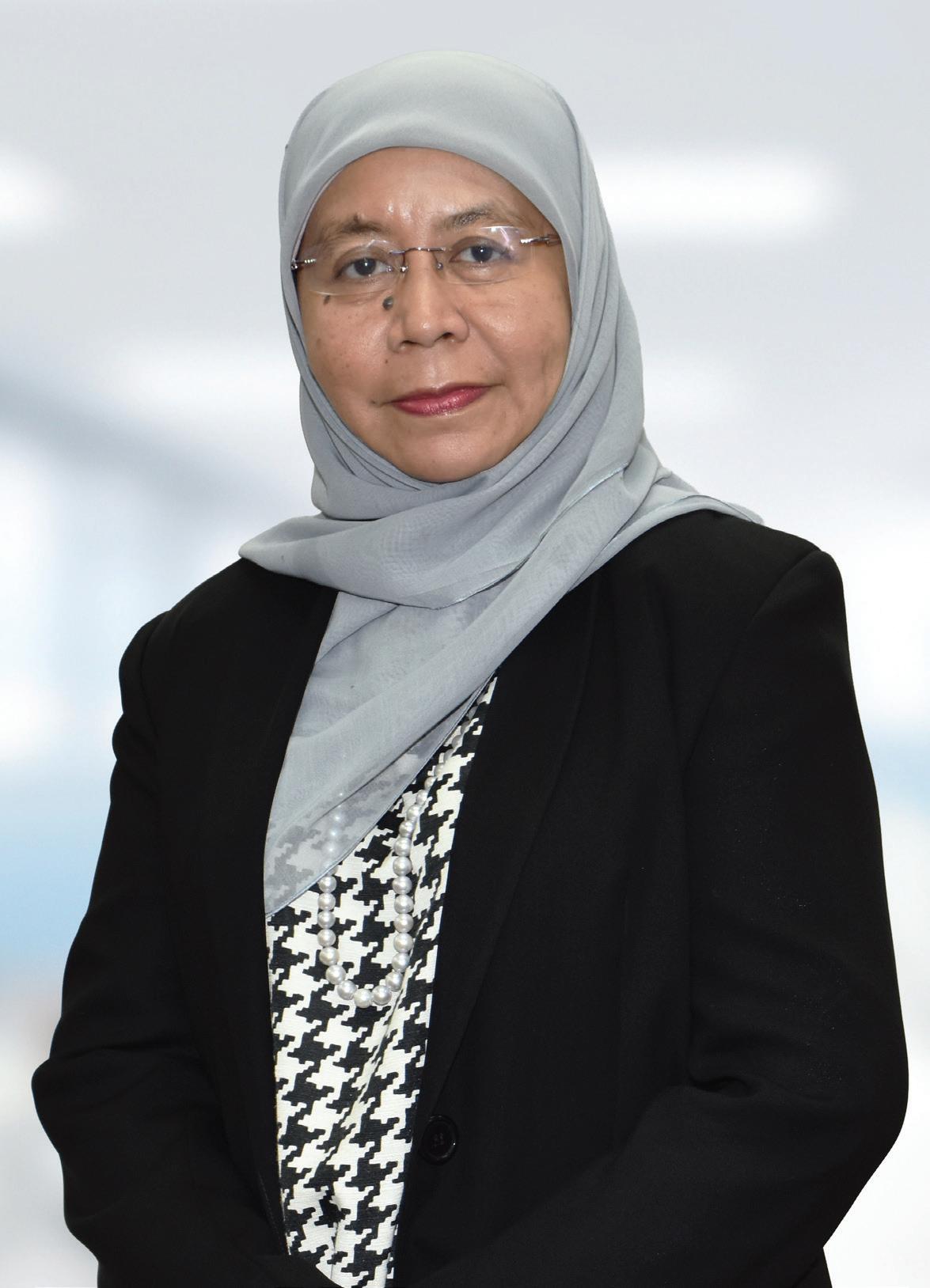
Professor Dr Abrizah Abdullah FASc
Faculty of Arts and Social Sciences Universiti Malaya (UM)
Professor Dr Fatin Aliah Phang Abdullah FASc is a distinguished scholar in physics education, stem education, engineering education, and environmental education. Her research interests focus on physics education, emphasising problemsolving, metacognition, and qualitative research methodologies. Her scholarly output includes over 80 indexed journal papers and more than 10 intellectual properties, several of which have been commercialised to industry.
She is recognised for initiating the Iskandar Malaysia Ecolife Challenge (IMELC) in 2013, an educational programme designed to promote Low Carbon Society awareness among primary school students, teachers, and parents. She has also initiated several other environmental education initiatives, including the establishment of RCE Iskandar under the United Nations University’s Regional Centre of Expertise on Education for Sustainable Development Network,
the RCE Iskandar Sustainable & Low Carbon Schools Exhibition, and Iskandar Puteri Rendah Karbon, among others.
Professor Fatin served on the governing board of the Research in Engineering Education Network (REEN), representing the Asian region from 2020-2021. She played a pivotal role in establishing the Centre for Engineering Education (CEE) at UTM and mentored new innovators in STEM education and translational research. Her dedication to environmental education is further exemplified by her leadership in developing the Johor Sustainability Education Action Plan 20192023. She has played a lead role in organising several key international conferences, including the World Engineering Education Forum 2017. As a YSN-ASM member, she has contributed to the Inquiry-Based Science Education (IBSE) Modules and the National Robotics Roadmap.
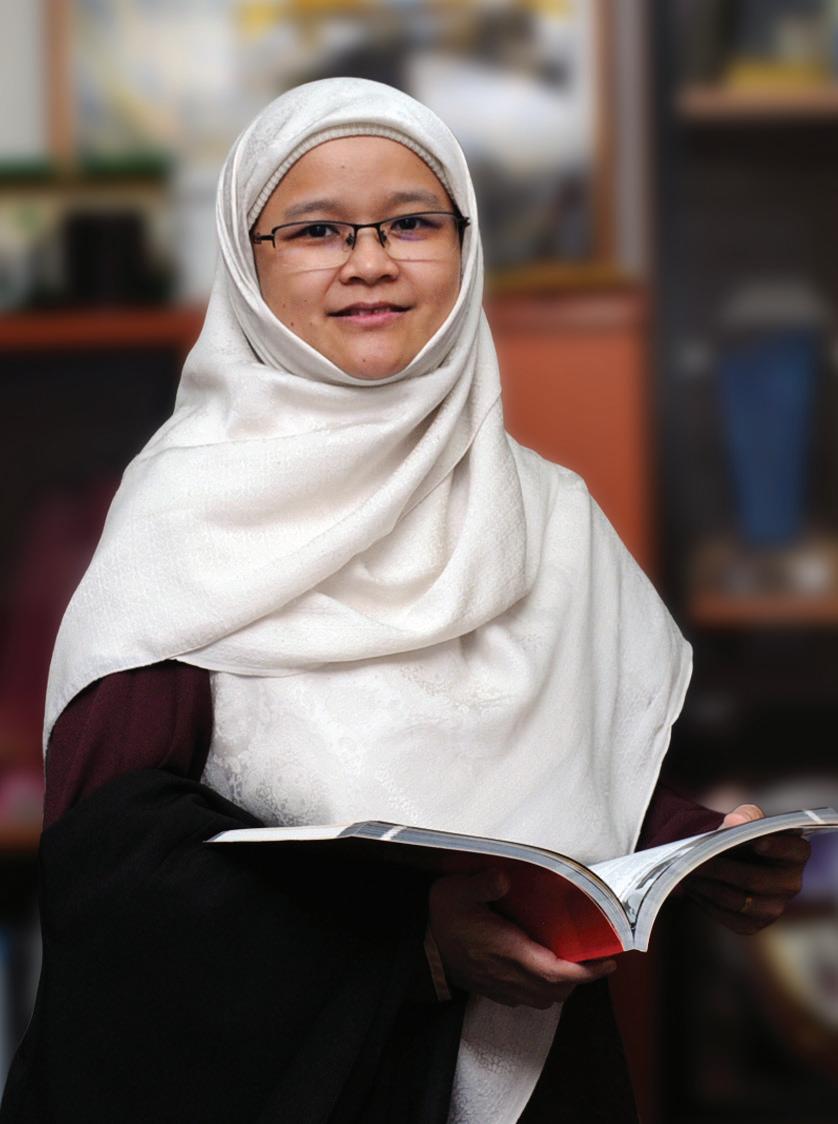
Professor Dr Fatin Aliah Phang Abdullah FASc
Centre for Engineering Education Faculty of Educational Sciences and Technology
Universiti Teknologi Malaysia (UTM)
Professor Dr Poline Bala FASc
Director Institute of Borneo Studies
Universiti Malaysia Sarawak (UNIMAS)
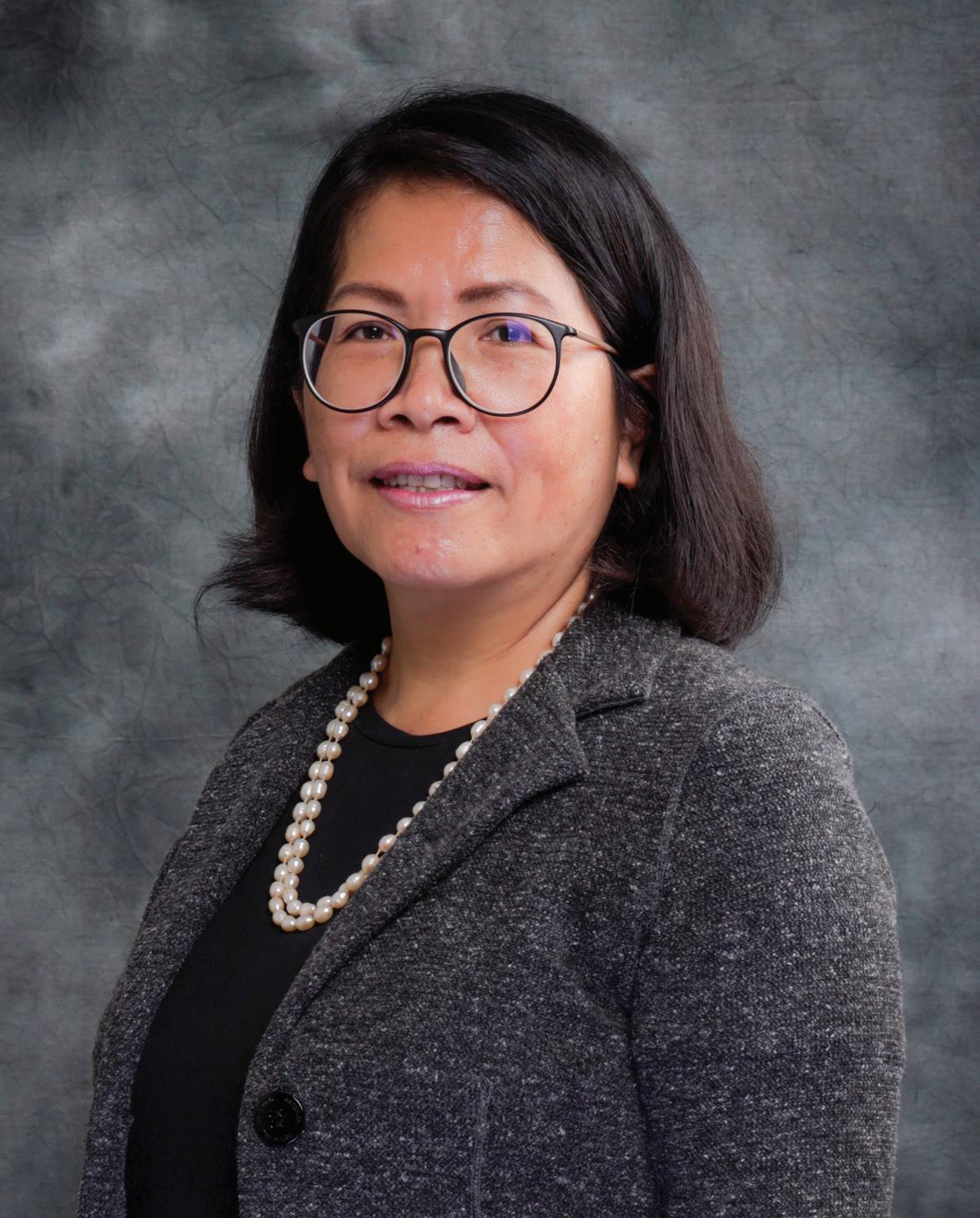
Professor Dr Poline Bala FASc is known for her significant contributions to social anthropology, indigenous studies, and the integration of digital technologies in remote communities. Her groundbreaking research and extensive publications, including “Changing Borders and Identities in the Kelabit Highlands” (2002), have contributed to the fields of indigenous studies, social anthropology, and digital inclusion. Her research records an h-index of 14 with 542 citations.
Her research on identity formation at the KalimantanSarawak border has provided critical insights into borderland studies, kinship, and economic relations in frontier communities. Through her work, she has brought the indigenous narrative to national, regional, and international audiences, ensuring their voices are represented in policy discussions and technological advancements. Over the past two decades, she has led various groundbreaking initiatives in digital inclusion for marginalised communities, including the eBario Project that introduces ICT to rural Malaysia, and the
Telecentre Programme for Indigenous Peoples and Peoples at the Margin. She also developed a Massive Open Online Course (MOOC) for single mothers in remote and rural communities, equipping them with digital literacy and economic opportunities.
Professor Poline chairs the Indigenous DigitalEnvironment System Coalition, supported by the UNESCO Chair in ICT4D, advocating for digital equity among indigenous populations. She has also contributed as a visiting scholar at the Centre for World Austronesia and Indigenous Peoples at National Tsing Hua University, Taiwan, and has presented at major conferences, shaping global discourse on indigenous development and digital transformation. At ASM, she has served as a subject matter expert on the Task Force on Advocacy, Awareness, and Capacity Building and the Public Participatory Platform for the Water Sector Transformation 2040 (WST2040) study.
Professor Datuk Dr Rokiah Hj Omar FASc
Faculty of Health Sciences Universiti Kebangsaan Malaysia (UKM)
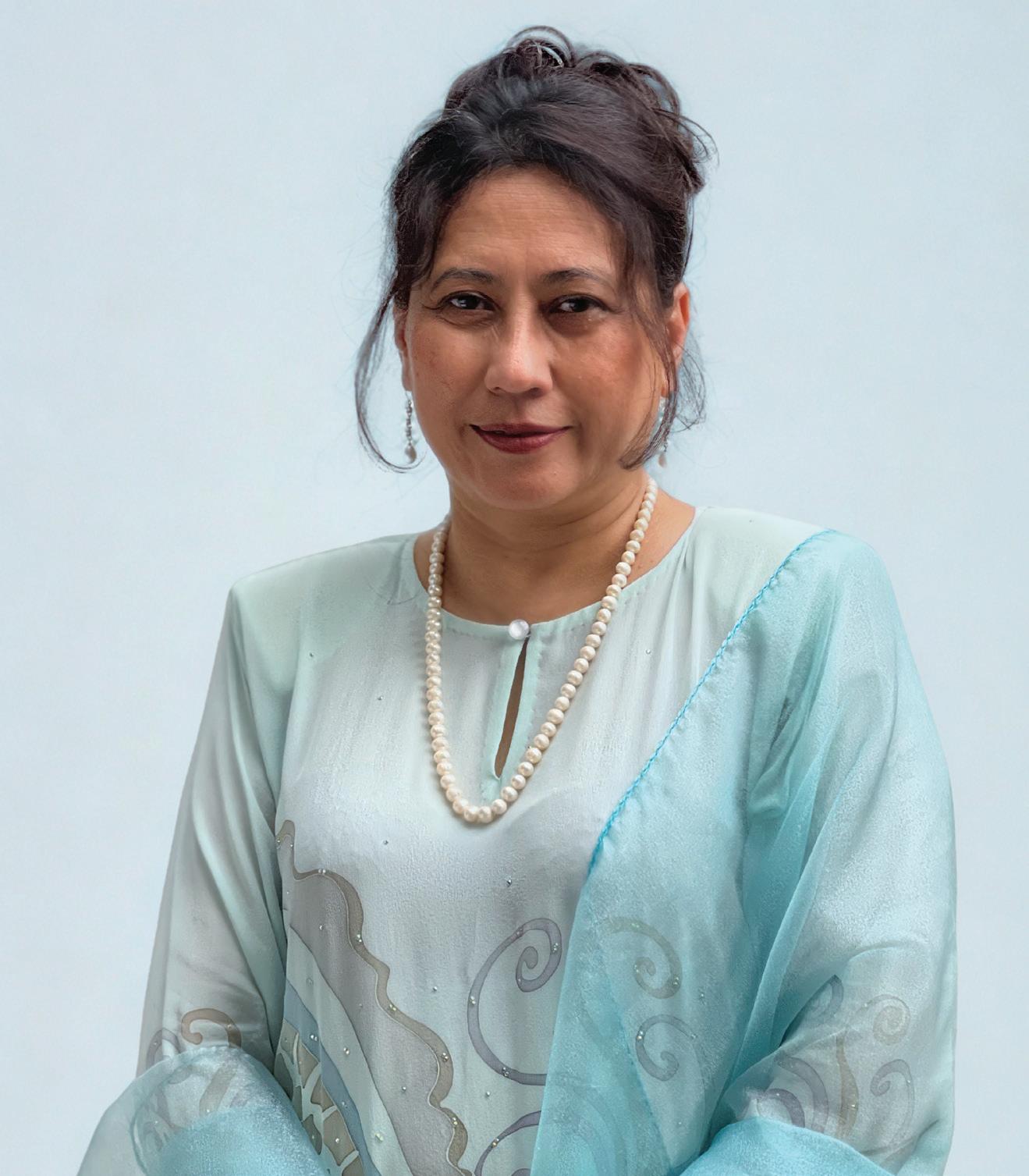
Professor Datuk Dr Rokiah Hj Omar FASc is a prominent expert in optometry. Her research interests are in low vision rehabilitation, special population needs, quality of life, public health optometry and sports vision. Her academic contributions are extensive, with numerous publications in reputable journals, an h-index of 11, and over 530 citations. She has translated her scientific knowledge and innovations in low vision rehabilitation into socioeconomic development for various communities, including Orang Asli, people with disabilities, paraathletes, and the elderly, among others.
Throughout her illustrious career, Datuk Rokiah has been pivotal in advocating for low vision services, which led to the launch of the Ministry of Health (MOH) Low Vision Clinic in 2002. Her involvement in the Low Vision Action Plan has aimed to integrate low vision services into primary healthcare. She has served as a
subject matter expert on blindness prevention through her appointment by the World Health Organisation (WHO), MOH, and other agencies in Malaysia.
In a notable achievement, she became the first optometrist in Asia to gain recognition as an International Visually Impaired Classifier for the International Blind Sports Federation (IBSA) and the International Paralympic Committee (IPC). She contributed her expertise to the Consultative Joint Committee on Classification of Para Athletes under the Majlis Paralimpik Malaysia and the National Sports Institute. She has also been instrumental in developing educational programmes such as the Community Education Centre in Pos Gob, which has significantly improved educational access for Orang Asli children. Professor Rokiah’s expertise is highly sought after through lectures and plenary sessions on low vision and community engagement globally.
ASM FELLOWS
BIOLOGICAL, AGRICULTURAL AND ENVIRONMENTAL SCIENCES (BAES)
Academician Professor Emeritus Dr Yong Hoi Sen FASc
Academician Emeritus Professor Tan Sri Dato’ Dr Syed Jalaluddin Syed Salim FASc
Academician Emeritus Professor Tan Sri Dr Zakri
Abdul Hamid FASc
Academician Tan Sri Dr Salleh Mohd Nor FASc
Dr Francis S.P. Ng FASc
Professor Dr Mak Chai @ Mak Lian Fong FASc
Professor Dr Ho Yin Wan FASc
Academician Dr Koh Chong Lek FASc
Professor Emeritus Dr Mohd Nordin Hj Hasan FASc
Dr Rajanaidu Nookiah FASc
Emeritus Professor Dato’ Dr Sheikh Omar
Abdul Rahman FASc
Emeritus Professor Dato’ Dr Muhamad Awang FASc
Emeritus Professor Dato’ Dr Mohamed Mahyuddin Mohd Dahan FASc
Dato’ Dr Yeang Hoong Yeet FASc
Professor Emeritus Dato’ Dr Abdul Latiff Mohamad FASc
Datuk Professor Dr Ghazally Ismail FASc
Emeritus Professor Dato’ Dr Hj Mohamed
Abdul Majid FASc
Dr Helen Nair FASc
Professor Dr Soh Aik Chin FASc
Academician Professor Datin Paduka Dr Khatijah
Mohd Yusoff FASc
Dr Tan Swee Lian FASc
Academician Emeritus Professor Datin Paduka Setia Dato’
Dr Aini Ideris FASc
Dr Heong Kong Luen FASc
Emeritus Professor Dr Phang Siew Moi FASc
Dr Ravigadevi Sambanthamurthi FASc
Dato’ Dr Sim Soon Liang FASc
Professor Dato’ Dr Azizan Abu Samah FASc
Professor Dr Mohd Sanusi Jangi FASc
Professor Dr Low Pak Sum FASc
Professor Dato’ Dr Mohamed Shariff Mohamed Din FASc
Dr Harikrishna Kulaveerasingam FASc
Emeritus Professor Dr Wickneswari Ratnam FASc
Dr Tan Keng Hong FASc
Emeritus Professor Dr Normah Mohd Noor FASc
Datuk Seri Lim Chong Keat FASc
Professor Dr Fatimah Md Yusoff FASc
Dr Ng Wing Keong FASc
Dr Saw Leng Guan FASc
Dato’ Dr Mohd Tajuddin Abdullah FASc
Professor Emeritus Dato’ Dr Ibrahim Che Omar FASc
Datuk Dr Abd Latif Mohmod FASc
Senior Professor Dato’ Dr Agamuthu Pariatamby FASc
Professor Dr Jinap Selamat FASc
Professor Dr Shamshuddin Jusop PGeol FASc
Datuk Dr Abdul Rahim Nik FASc
Professor Emeritus Dato’ ChM Dr Mazlin Mokhtar FASc
Professor Dato’ Dr Mohd Azmi Mohd Lila FASc
Dr Rahimatsah Amat FASc
Emeritus Professor Dato’ Dr Rahmah Mohamed FASc
Honorary Professor Dr S.Vikineswary Sabaratnam FASc
Professor Dr Ahmad Ismail FASc
Datuk Dr Ahmad Parveez Hj Ghulam Kadir FASc
Dr Chow Keng See FASc
Professor Dato’ Dr Mohd Ali Hassan FASc
Dr Rajinder Singh Harminder Singh FASc
Professor Dr Chan Kok Gan FASc
Professor Dato’ Dr Mohd Hair Bejo FASc
Emeritus Professor Dr Nor Muhammad Mahadi FASc
Professor Dr Rofina Yasmin Othman FASc
Professor Dr Sheila Nathan FASc
Professor Dr Siti Aisah Hj Alias FASc
Professor Dato’ Dr Mazlan Abd Ghaffar FASc
Professor Dato’ Dr Ismail Sahid FASc
Professor Dato’ Dr Mohd Yazid Abd Manap FASc
Professor Dr Paridah Md Tahir FASc
Professor Dr Abdul Rahman Omar FASc
Professor Dr K Sudesh Kumar C Kanapathi Pillai FASc
Professor Dr Mohd Talib Latif FASc
Professor Dr Raja Noor Zaliha Raja Abd Rahman FASc
Professor Dr Tan Chin Ping FASc
Professor Dr Tan Wen Siang FASc
Professor Dr Lai Oi Ming FASc
Dr Meilina Ong Abdullah @ Ong Li Mei FASc
Professor Dato’ Dr Zulkifli Idrus FASc
Professor Dr Ahmad Zaharin Aris FASc
Professor Dato’ Dr Aileen Tan Shau Hwai FASc
Professor Dr Amin Ismail FASc
Professor Datuk Wira Dr Raha Abdul Rahim FASc
Dr Ramli Othman FASc
Professor Dr Rosli Md Illias FASc
Professor Dr Wan Kiew Lian FASc
Professor Dr Clemente Michael Wong Vui Ling FASc
Professor Dr Ida Idayu Muhamad FASc
Professor Ts Dr Mohd Effendy Abd Wahid FASc
Professor Datin Dr Siti Nor Akmar Abdullah FASc
Dr Tan Chon Seng FASc
Professor Dr Vijaya Kumar Subbiah FASc
Professor Dr Lim Phaik Eem FASc
Datu Dr Lulie Anak Joshua Melling FASc
Professor Dr Rosfarizan Mohamad FASc
Professor Dr Tang Thean Hock FASc
Professor Dr Wong Mui Yun FASc
Professor Dr Zulqarnain Mohamed FASc
Professor Dr Awis Qurni Sazili FASc
Professor Dr Goh Yong Meng FASc
Mr Hoh Chee Choong FASc
Professor Ts Dr Lee Khai Ern FASc
Dr Leslie Low Eng Ti FASc
Professor Dr Lim Po Teen FASc
Professor Dr Loh Teck Chwen FASc
CHEMICAL SCIENCES (CS)
Academician Emeritus Professor Tan Sri Datuk Dr Augustine Ong Soon Hock FASc
Academician Emeritus Professor Dato’ Dr V.G. Kumar
Das Govinda Panicker FASc
Emeritus Professor Dr Ng Soon FASc
Academician Professor Dr Ho Chee Cheong FASc
Datuk Dr Mohinder Singh S Sucha Singh FASc
Academician Professor Datuk Dr Halimaton
Hamdan FASc
Emeritus Professor Dato’ Dr Md Ikram Mohd Said FASc
Dr Lee Chnoong Kheng FASc
Professor Emeritus Datuk Dr Sukiman Sarmani FASc
Dato’ Dr Choo Yuen May FASc
Professor Dr Ibrahim Abdullah FASc
Professor Emeritus Dato’ Dr Muhammad Idiris
Saleh FASc
Dr Wong Lai Yoong FASc
Professor Dr Lee Soo Ying FASc
Professor Datin Dr Zuriati Zakaria FASc
Professor Dr Loh Teck Peng FASc
Professor Dr Rauzah Hashim FASc
Emeritus Professor Dato’ Dr Mohd Jamil Maah FASc
Professor Dato’ Dr Ng Seik Weng FASc
Professor Emeritus Dato’ ChM Dr Laily bin Din FASc
Professor Dr Bohari Mohd Yamin FASc
Professor Dr Lee Hian Kee FASc
ChM Dr Yang Farina Abdul Aziz FASc
Emeritus Professor Dato’ Dr Musa Ahmad FASc
Professor ChM Dr Noorsaadah Abd Rahman FASc
Professor Dr Mohd Basyaruddin Abdul Rahman FASc
Professor Datuk Dr Taufiq Yap Yun Hin FASc
Emeritus Professor Dato’ Dr Wan Md Zin
Wan Yunus FASc
Dr Md Pauzi Abdullah FASc
Dr Hj Mohamad Kamal Hj Harun FASc
Professor Dr Wan Ahmad Kamil Che Mahmood FASc
Professor Dr Zanariah Abdullah FASc
Brigadier General Emeritus Professor Datuk Dr
Kamarudin Husin FASc
Datin Dr Sri Nurestri Abd Malek FASc
Professor Dr Chuah Cheng Hock FASc
Dr Gan Seng Neon FASc
Professor Dr Khalijah Awang FASc
Professor Dr Mansor bin Ahmad @ Ayob FASc
Professor Dr Khozirah Shaari FASc
Professor Dr Yatimah Alias FASc
Professor ChM Dr Rusli Daik FASc
Chm Dr Abdull Rahim Mohd Yusoff FASc
Professor Dr Misni Misran FASc
Dr Nor Hadiani Ismail FASc
Datuk Dr Omar Shawkataly FASc
Professor Dr Azman Hassan FASc
Professor Dr Ishak Ahmad FASc
Dr Shahidah Mohd Shariff FASc
Professor ChM Dr Teh Geok Bee FASc
Professor Dr Charles Santhanaraju Vairappan FASc
Professor Dr Wong Tin Wui FASc
Professor Dr Zainudin Arifin FASc
Professor Ts Dr ChM Ahmad Zuhairi Abdullah FASc
Professor Dato’ Dr Ibrahim Jantan FASc
Professor Dr ChM Lee Yook Heng FASc
Professor Dr Wan Jefrey Basirun FASc
Professor Dr Habibah A Wahab FASc
Professor Dr Fasihuddin Badruddin Ahmad FASc
Professor ChM Dr Goh Choo Ta FASc
Professor Dr Mohd Cairul Iqbal Mohd Amin FASc
ENGINEERING SCIENCES (ES)
Academician Dato’ Ir Lee Yee Cheong FASc
Academician Tan Sri Dato’ Ir Ts Ahmad Zaidee
Laidin FASc
Dato’ Dr Muhammad Ridzuan Haji Salleh FASc
Ar Hijjas Kasturi FASc
Academician Tan Sri Dato’ Ir Haji Shahrizaila
Abdullah FASc
Dato’ Dr Mohd Ariffin Hj. Aton FASc
Professor Dato’ Ir Dr A. Bakar Jaafar FASc
Professor Emeritus Dato’ Wira Ir Dr Mohammad Noor
Hj Salleh FASc
Emeritus Professor Dato’ Ir Abang Abdullah
Abang Ali FASc
Professor Emeritus Tan Sri Dato’ Sri Ir Dr Sahol Hamid
Abu Bakar FASc
Emeritus Professor Dr Mohd Ali Hashim FASc
Professor Dato’ Dr Goh Sing Yau FASc
Tan Sri Professor Ir Dr Mohd Zulkifli
Tan Sri Mohd Ghazali FASc
Professor Dr Tan Hong Siang FASc
Datuk Ir Dr Ow Chee Sheng FASc
Dato’ Ir Dr Gue See Sew FASc
Ir Dr Salmah Zakaria FASc
Dr Zahari Taha FASc
Datuk Dr A Rahman Abdullah FASc
Tan Sri Dato’ Sri Ar Hj Esa Mohamed FASc
Dato’ Seri Ir Dr Zaini Ujang FASc
Professor Ir Dr Shah Nor Basri FASc
Tan Sri Dato’ Ir Syed Muhammad Shahabudin FASc
Tan Sri Dato’ Ir Omar Ibrahim FASc
Ir Dr Ahmad Faizal Mohd Zain FASc
Professor Datuk Ir Ts Dr Ahmad Fauzi Ismail FASc
Dato’ Sri Professor Ir Dr Judin Abdul Karim FASc
Professor Ir Dr Wan Abu Bakar Wan Abas FASc
Dato’ Ir Mohd Yusof Ibrahim FASc
Ir Dr Ruslan Hassan FASc
Professor Dr Zulkifli Yusop FASc
Emeritus Professor Dato’ Ir Dr Wan Ramli Wan Daud FASc
Professor Datuk Ir Dr Mohd Jailani Mohd Nor FASc
Professor Dr Hanafi Ismail FASc
Professor Ir Dr Abd Halim Shamsuddin FASc
Professor Ir Dr Abdul Latif Ahmad FASc
Professor Dato’ Dr Kamaruzzaman Sopian FASc
Datuk Ir Mohd Adnan Mohd Nor FASc
Datuk Ir (Dr) Abdul Rahim Hj Hashim FASc
Professor Dato’ Seri Ir Dr Abdul Rahman Mohamed FASc
Professor Dato’ Ir Dr Abdul Wahab Mohammad FASc
Professor Dato’ Ir Ts Dr Badhrulhisham Abdul Aziz FASc
Professor Dato’ Dr Burhanuddin Yeop Majlis FASc
Ir Lalchand Gulabrai FASc
Professor Dato’ Ir Dr Ewe Hong Tat FASc
Emeritus Professor Datuk Dr Mohd Ruddin Ab Ghani FASc
Professor Dato’ Seri Ir Dr Noor Azuan Abu Osman FASc
Dato’ Ir Lim Chow Hock FASc
Professor Dato’ Ir Dr Mahyuddin Ramli FASc
Professor Dato’ Ts Dr Mohamed Ibrahim
Abdul Mutalib FASc
Professor Dato’ Dr –Ing Ir Renuganth Varatharajoo FASc
Professor Dr Azmi Mohd Shariff FASc
Dr Leong Kok Hoong FASc
Professor Dato’ Ir Dr Mohd Saleh Jaafar FASc
Professor Ir Dr Ramesh Singh FASc
Ir Dr Zuhairi Abd Hamid FASc
Professor Ir Dr Abdul Aziz Abdul Raman FASc
Professor Dr Mohd Adzir Mahdi FASc
Datuk Ir Abdul Kadir Mohd Din FASc
Professor Sr Gs Dr Mazlan Hashim FASc
Emeritus Professor Dr Nik Meriam Nik Sulaiman FASc
Dato’ Seri Ir Dr Kamal Nasharuddin Mustapha FASc
Professor Ir Dr Nor Aishah Saidina Amin FASc
Professor Dr Dominic Foo Chwan Yee FASc
Professor Dato’ Ir Dr Eric Goh Kok Hoe FASc
Ir Ts Mohamed Haniffa Abdul Hamid FASc
Professor Ir Dr Azlan Adnan FASc
Professor Dato’ Dr Faisal Rafiq Mahamd Adikan FASc
Professor Ir Ts Dr Mohd Zainal Abidin Ab. Kadir FASc
Emerita Profesor Dr Robiah Yunus FASc
Dato’ Ir Hanapi Mohamad Noor FASc
Professor Ir Dr Mohd Azlan Hussain FASc
Professor Ir Dr Mohd Sapuan Salit @ Sinon FASc
Ir Dr Suzana Yusup FASc
Professor Ir Ts Dr Zainuddin Abd Manan FASc
Datuk Ir Dr Azuhan Mohamed PGeol FASc
Professor Ir Dr Fatimah Ibrahim FASc
Professor Ir Dr Haslenda Hashim FASc
Professor Ts Dr Lim Eng Hock FASc
Professor Ir Dr Lim Yun Seng FASc
Professor Dr M Iqbal Saripan FASc
Professor Dr Mohd Razman Salim FASc
Professor Ts Dr Safian Sharif FASc
Professor Ir Dr Shaliza Ibrahim CEng FIChemE FASc
Professor Ir Dr Siti Kartom Kamarudin FASc
Professor Dato’ TPr Dr Alias Abdullah FASc
Professor Ir Dr Chong Wen Tong FASc
Dato’ Ir Dr Dennis Ganendra FASc
Professor Ir Dr Koo Voon Chet FASc
Dato’ Ir Dr Haji Md Nasir Md Noh FASc
Dato’ Ir Nor Hisham Mohd Ghazali FASc
Professor Ts Dr Zainura Zainon Noor FASc
Professor Ir Dr Chai Siang Piao FASc
Professor Dr Hazizan Md Akil FASc
Professor Ir Dr Hazlie Mokhlis FASc
Professor Ir Dr Kaharudin Dimyati FASc
Professor Ir Dr Khairul Salleh Mohamed Sahari FASc
Professor Ir Ts Dr Mohd Rizal Arshad FASc
Ir Ts Dr Nordin Ramli FASc
Professor Dato’ Ir Ts Dr Othman A Karim FASc
Professor Ir Ts Dr Sharifah Rafidah Wan Alwi FASc
Professor Dr Wong Shaw Voon FASc
Professor Ir Ts Dr Ahmad ‘Athif Mohd Faudzi FASc
Professor Ir Dr Huang Yuk Feng FASc
Professor Ts Dr Mohd Hafiz Dzarfan Othman FASc
INFORMATION TECHNOLOGY AND COMPUTER
SCIENCES (ITCS)
Emeritus Professor Dato’ Ir Dr Mohd Zawawi Ismail FASc
Academician Tan Sri Dato’ Seri Ir Shamsuddin Abdul Kadir FASc
Academician Datuk Dr Tengku Mohd Azzman
Shariffadeen FASc
Professor Emeritus Dato’ Dr Tan Wang Seng FASc
Datuk Dr Mohamed Arif Nun FASc
Dr Mohamed Awang Lah FASc
Dr Mohamad Zahran Dato’ Sheikh Abdul Halim FASc
Professor Dr Zaharin Yusoff FASc
Emeritus Professor Dato’ Ts Dr Tengku Mohd T engku Sembok FASc
Emeritus Professor Dato’ Dr Halimah
Badioze Zaman FASc
Professor Datuk Ir Dr Ahmad Fadzil Mohamad Hani FASc
Emeritus Professor Dato’ Seri Ir Dr Mashkuri Yaacob FASc
Professor Dr Abdullah Gani FASc
Professor Dr Borhanuddin Mohd Ali FASc
Professor Dr Zainab Abu Bakar FASc
Professor Datuk Dr Shahrin Sahib FASc
Emeritus Professor Dr Tharek Abd Rahman FASc
Professor Ir Dr Goi Bok Min FASc
Emeritus Professor Dato’ Dr Mohamed Ridza
Wahiddin FASc
Dato’ Ts Dr Amirudin Abdul Wahab FASc
Professor Dato’ Ts Dr Aziz Deraman FASc
Professor Ir Dr Aduwati Sali FASc
Dr Mahamod Ismail FASc
Professor Datin Dr Sameem Abdul Kareem FASc
Professor Ts Dr Norita Md Norwawi FASc
Professor Ir Dr Sim Kok Swee FASc
Professor Dr Abdullah Mohd Zain FASc
Professor Ts Dr Mardeni Roslee FASc
Professor Ts Dr Rabiah Ahmad FASc
MEDICAL AND HEALTH SCIENCES (MHS)
Academician Distinguished Professor Datuk Dr Looi Lai
Meng FASc
Tan Sri Dato’ Dr Yahya Awang FASc
Academician Tan Sri Datuk Dr. M. Jegathesan FASc
Tan Sri Dato’ Dr Abu Bakar Dato’ Suleiman FASc
Academician Emeritus Professor Dato’ Dr Lam Sai
Kit FASc
Professor Emeritus Dato’ Paduka Dr Mustaffa
Embong FASc
Professor Emeritus Puan Sri Datin Dr Nafisah
Hj Nik Mohd Adeeb FASc
Emeritus Professor Dato’ Dr Hashim Yaacob FASc
Professor Dr Yap Sook Fan FASc
Academician Professor Emerita Datuk Dr Asma Ismail FASc
Academician Emeritus Professor Dr Cheong Soon-Keng FASc
Professor Dato’ Dr Anuar Zaini Md Zain FASc
Professor Dr Victor Lim Kok Eow @ Azman Lim FASc
Professor Emerita Tan Sri Dato’ Seri Dr Sharifah Hapsah
Syed Hasan Shahabudin FASc
Emeritus Professor Dr Mohd Ismail Noor FASc
Tan Sri Datuk Dr Mohd Ismail Merican FASc
Professor Dr Cheah Phaik Leng FASc
Professor Dr Mary Jane Cardosa FASc
Emeritus Professor Dr Boo Nem Yun FASc
Dr Subramaniam Krishnan FASc
Professor Dato’ Dr Jafri Malin Abdullah FASc
Emeritus Professor Dato’ Dr Adeeba Kamarulzaman FASc
Emeritus Professor Dr Rosnah Mohd Zain FASc
Professor Dr Rahmah Noordin FASc
Emeritus Professor Dato’ Dr Ikram Shah Ismail FASc
Professor Emeritus Dato’ Dr Lian Chin Boon FASc
Tan Sri Dato’ Professor Dr Mohd Amin Jalaludin FASc
Emeritus Professor Dato’ Dr Tan Chong Tin FASc
Professor Dr Norazmi Mohd Nor FASc
Dr Salmaan Hussain Inayat Hussain FASc
Emeritus Professor Dr Khor Geok Lin FASc
Datuk Dr Awg Bulgiba Awg Mahmud FASc
Professor Dr Mustafa Ali Mohd FASc
Professor Dr Jamunarani S Vadivelu FASc
Professor Datuk Dr Rohana Yusof FASc
Professor Datin Paduka Dr Teo Soo Hwang FASc
Emeritus Professor Datuk Paduka Dr Wan Azman
Wan Ahmad FASc
Professor Dr Balbir Singh Mohan Singh FASc
Datuk Dr Lokman Hakim Sulaiman FASc
Professor Dr Sazaly Abu Bakar FASc
Professor Dr Suresh Kumar P.Govind FASc
Professor Dato’ Dr Balwant Singh Gendeh FASc
Professor Dr Lee Way Seah FASc
Professor Dr Mary Anne Tan Jin Ai FASc
Professor Dr Wan Ariffin Abdullah FASc
Professor Datuk Dr A Rahman A Jamal FASc
Professor Dr Lim Shen-Yang FASc
Professor Dr Shamala Devi K.C. Sekaran FASc
Professor Dr Thong Meow Keong FASc
Professor Dr Tunku Kamarul Zaman
Tunku Zainol Abidin FASc
Professor Dr Yvonne Lim Ai Lian FASc
Professor Dr Onn Hashim FASc
Professor Dr Ngeow Yun Fong FASc
Professor Dato’ Dr Ravindran Jegasothy FASc
Professor Dato’ Dr Syed Mohamed Aljunid FASc
Professor Dr Wong Kum Thong FASc
Professor Dato’ Dr Zainal Ariff Abdul Rahman FASc
Professor Dato’ Dr Mohamed Ibrahim Abu Hassan FASc
Professor Dr Cheong Sok Ching FASc
Professor Dr Tan Kay Sin FASc
Professor Dr Chan Kit Lam FASc
Professor Dr Hany Mohd Ariffin FASc
Professor Mulia Datuk Dr Lekhraj Rampal FASc
Dr Seow Heng Fong FASc
Professor Ts Dr Cheah Yoke Kqueen FASc
Professor Dr Fong Mun Yik FASc
Professor Dr Lau Yee Ling FASc
Professor Dr Maznah Dahlui FASc
Professor Dr Cheah Fook Choe FASc
Professor Dr Chua Kek Heng FASc
Professor Dr Lee Yeong Yeh FASc
Professor Dr Zaleha Abdullah Mahdy FASc
Professsor Datin Dr Hapizah Md Nawawi FASc
Professor Dr Ong Teng Aik FASc
Professor Dr Rozita Rosli FASc
Professor Dr Zamri Radzi FASc
Professor Dr Nortina Shahrizaila FASc
Professor Dr Poh Bee Koon FASc
Professor Dr Tilakavati Karupaiah FASc
Professor Dr Woo Yin Ling FASc
Professor Dr Chan Wah Kheong FASc
Professor Dr Dharmendra Ganesan FASc
Professor Dr Leong Chee Onn FASc
Professor Dr Muhammad Yazid Jalaludin FASc
Professor Dr Sanjiv Mahadeva FASc
Professor Dr Suzana Shahar FASc
MATHEMATICS, PHYSICS AND EARTH SCIENCES (MPES)
Emeritus Professor Dato’ Dr Chatar Singh FASc
Emeritus Professor Dato’ Dr Mohd Sham Mohd Sani FASc
Dato’ Dr R. Ratnalingam FASc
Academician Datuk Fateh Chand Pars Ram FASc
Academician Tan Sri Datuk Ir Dr Ahmad Tajuddin Ali FASc
Dr Shaharir Mohamad Zain FASc
Academician Professor Emeritus Tan Sri Dato’ Ir Dr Chuah Hean Teik FASc
Emeritus Professor Dato’ Dr Hassan Said FASc
Emeritus Professor Dato’ Dr Ibrahim Komoo FASc
Emeritus Professor Dr Bahrom Sanugi FASc
Distinguished Professor Datuk Dr Harith Ahmad FASc
Professor Dr Kurunathan Ratnavelu FASc
Professor Dr Tou Teck Yong FASc
Emeritus Professor Dato’ Dr Muhammad Yahaya FASc
Dr Lim Ming Huat FASc
Emeritus Professor Dr Wong Chiow San FASc
Professor Dato’ Dr Roslan Abd Shukor FASc
Professor Dato’ Indera Dr Rosihan Mohamed Ali FASc
Emeritus Professor Dato’ Dr Lim Koon Ong FASc
Emeritus Professor Dr Fun Hoong Kun FASc
Professor Dr Ong Seng Huat FASc
Professor Dr Abdul Halim Shaari FASc
Professor Dr Felix Tongkul FASc
Professor Dr Fredolin Tangang FASc
Professor Dr Mohd Shafee’a Leman FASc
Professor Dr Joy Jacqueline Pereira FASc
Professor Dr Wan Ahmad Tajuddin Wan Abdullah FASc
Emeritus Professor Dato’ Dr Kamel Ariffin
Mohd Atan FASc
Professor Dr Norani Muti Mohamed FASc
Dr Mazlan Madon FASc
Dr Low Kwai Sim FASc
Professor Dato’ Dr Mohd Yusof Hj Othman FASc
Emeritus Professor Dr Ng Kwan Hoong FASc
Dato’ Dr Yap Kok Seng FASc
Professor Dr Ishak Hashim FASc
Professor Dr Raymond Ooi Chong Heng FASc
Dr Selliah Paramananthan FASc
Professor Dr Ramesh T Subramaniam FASc
Professor Dr Zainuriah Hassan FASc
Professor Ts Dr Faidz Abd Rahman FASc
Professor Dr Md Rahim Sahar FASc
Professor Dr Mohd Salmi Md Noorani FASc
Professor Emeritus Dato’ Dr Abd Aziz Tajuddin FASc
Professor Dr Maslina Darus FASc
Professor Dr Sahrim Haji Ahmad FASc
Professor Ir Dr Sulaiman Wadi Harun FASc
Professor Dr Zainal Abidin Talib FASc
Professor Dr Chong Kok Keong FASc
Professor Dr Sidek Ab Aziz FASc
Professor Ts Dr Kasturi Devi Kanniah FASc
Dr Saim Suratman PGeol FASc
Professor Dr Mohd Rafie Johan FASc
Professor Ts Dr Muhammad Hisyam Lee FASc
Professor Dr Wan Haliza Abd Majid FASc
SCIENCE & TECHNOLOGY AND DEVELOPMENT
INDUSTRY (STDI)
Academician Emeritus Professor Tan Sri Datuk Dr Omar Abdul Rahman FASc
Academician Tan Sri Datuk Dr Yusof Basiron FASc
Academician Dato’ Seri Dr Abdul Aziz S.A. Kadir FASc
Tan Sri Datuk Yong Poh Kon FASc
Datuk Alladin Hashim FASc
Tuan Ir Mohamed Zohari Mohamed Shaharun FASc
Academician Emerita Professor Tan Sri Dato’ Seri Dr Mazlan Othman FASc
Datuk Dr Saharan Anang FASc
Dato’ Dr Ong Eng Long FASc
Emeritus Professor Dr Jalani Sukaimi FASc
Datuk Dr Abdul Razak Mohd Ali FASc
Dato’ Ir Lai Pin Yong FASc
Datuk Dr Soon Ting Kueh FASc
Datuk Dr Mohd Basri Wahid FASc
Academician Professor Dato’ Dr Ahmad Ibrahim FASc
Datuk Dr Ahmad Tasir Lope Pihie FASc
Academician Emeritus Professor Tan Sri Dato‘ Dzulkifli
Abdul Razak FASc
Dato‘ Dr Samsudin Tugiman FASc
Dr Wan Abdul Rahaman Wan Yaacob FASc
Datuk Dr Kalyana Sundram P Manickam FASc
Dato’ Dr Kamarudin Ab Malek FASc
Datuk Dr Salmiah Ahmad FASc
Dato’ Seri (Dr) Ir Andy Seo Kian Haw FASc
Ir Ts Choo Kok Beng FASc
Datuk Fadilah Baharin FASc
Dr Amir Hashim Md Yatim FASc
Datuk Dr Mohd Yusoff Sulaiman FASc
Mr Goh Peng Ooi FASc
Dr Ahmad Hezri Adnan FASc
Datuk Dr Ahmad Kushairi Din FASc
Dato’ Dr Jalaluddin Harun FASc
Professor Ir Dr Lee Sze Wei FASc
Ts Dr Raslan Ahmad FASc
Tan Sri Dato’ (Dr) Ir Gan Thian Leong FASc
Mr Loganathan Ponnambalam FASc
Mr Tajuddin Ismail FASc
Dr Wan Mohamed Noordin Wan Daud FASc
Professor Dr Aziz Arshad FASc
Professor Dr Rahinah Ibrahim FASc
Mr Teoh Lay Hock FASc
Professor Dr Zakiah Ahmad FASc
Dato’ Indera Ir Dr Hj Ahmad Sabirin Arshad FASc
Ts Dr Chantara Thevy Ratnam FASc
Dr Faridah Hanim Ab Hanan FASc
Datin Paduka Dr Fatimah Mohamed Arshad FASc
Dr Hjh Hafsah Mohd Ghazaly FASc
Professor Emerita Datuk Ts Ir Dr Siti Hamisah
Tapsir FASc
Dato’ Dr Zairossani Mohd Nor FASc
Tan Sri Dato’ Seri Dr Jeffrey Cheah Fook Ling FASc
Dr Mohd Khanif Bin Yusop FASc
Mr Pong Kai See FASc
Dato’ Dr Sheikh Muszaphar Shukor FASc
Dato’ Sia Hok Kiang FASc
Mr Chan Pak Kuen FASc
Professor Ir Ts Dr Khalina Abdan FASc
Dato’ Peter T.S. Ng FASc
Ir Dr Selamat Aliman FASc
Dr Supramaniam Shanmugam FASc
Professor Dr Azemi Samsuri FASc
Ts Dr Khairul Naim Adham FASc
Ir Mohamed Firouz Asnan FASc
Ts Raja Shazrin Shah Raja Ehsan Shah FASc
Professor Ts Dr Rosnah Shamsudin FASc
Dr Tioh Ngee Heng FASc
SOCIAL SCIENCES AND HUMANITIES (SSH)
Professor Emeritus Dato’ Dr Aishah Bidin FASc
Dato’ Dr Sharifah Maimunah Syed Zin FASc
Emeritus Professor Datuk Dr Shad Salem Faruqi FASc
Emerita Professor Dato’ Dr Siti Zuraina Abdul Majid FASc
Dr Zainal Ariffin Ahmad FASc
Distinguished Professor Datuk Dr Shamsul Amri
Baharuddin FASc
Professor Dr Mahendhiran Sanggaran Nair FASc
Dato Dr Madeline Berma FASc
Professor Dato’ Dr Tengku Aizan
Tengku Abdul Hamid FASc
Emeritus Professor Dr Jomo Kwame Sundaram FASc
Professor Emeritus Datuk Dr Norma Mansor FASc
Distinguished Professor Ts Dr Ooi Keng Boon FASc
Distinguished Professor Dato’ Dr Rajah Rasiah FASc
Professor Dr Sarinah Low Abdullah @ Low Wah Yun FASc
Emeritus Professor Datuk Dr Ahmat Adam FASc
Datuk Dr Jayum Anak Jawan FASc
Professor Datuk Dr Mad Nasir Shamsudin FASc
Emeritus Professor Datuk Dr Osman Bakar FASc
Professor Emeritus Dr Azirah Hashim FASc
Professor Emeritus Datuk Dr Azizan Baharuddin FASc
Justice Emeritus Professor Dr Choong Yeow Choy FASc
Professor Datuk Dr Danny Wong Tze Ken FASc
Professor Dato’ Dr Fariza Md Sham FASc
Kiu Jia Yaw FASc
Professor Dr Mansor Abu Talib FASc
Dr Mohd Shahwahid Haji Othman FASc
Datin Sri Professor Dr Suhaiza Hanim Dato’ Mohamad Zailani FASc
Professor Dr Azmawani Abd Rahman FASc
Emeritus Professor Dato’ Dr Noraini Idris FASc
Senior Professor Dr P’ng Tean Hwa FASc
Professor Ts Dr Shahrina Md Nordin ACM FASc
Professor Dr Stefanie Shamila Pillai FASc
Dr Sumit Mandal FASc
Professor Dr Abrizah Abdullah FASc
Professor Dr Fatin Aliah Phang Abdullah FASc
Professor Dr Poline Bala FASc
Professor Datuk Dr Rokiah Hj Omar FASc
